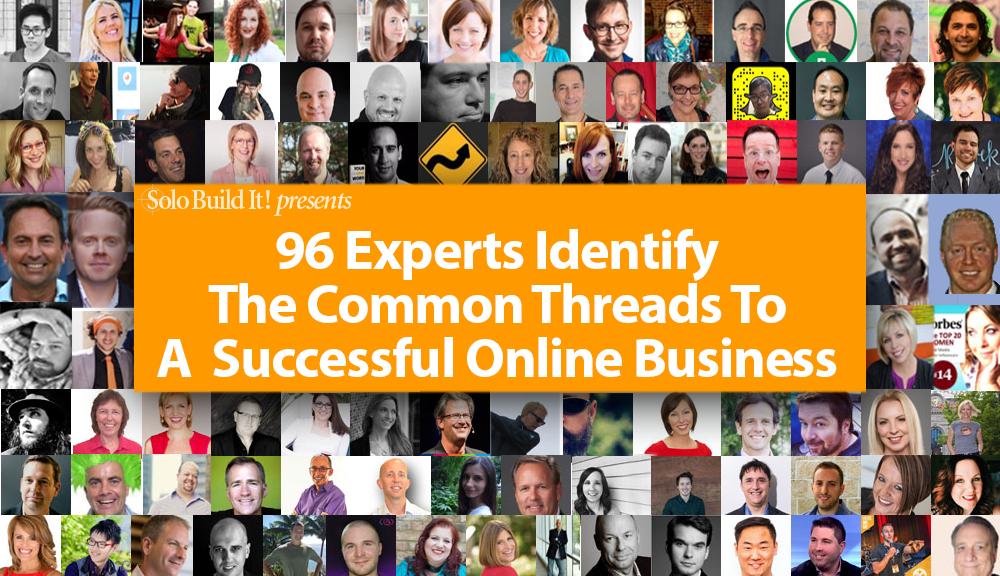
The vast majority of solopreneurs fail to build a profitable online business. Sad, but true.
According to Netcraft, the authority in this field, there are 173 million active sites today. You can see that the number has been flat for years, indicating churn. Most of these are “fails” being replaced by new players. Hopefully, some are folks trying again a second or third time (the first is often the learning curve)…
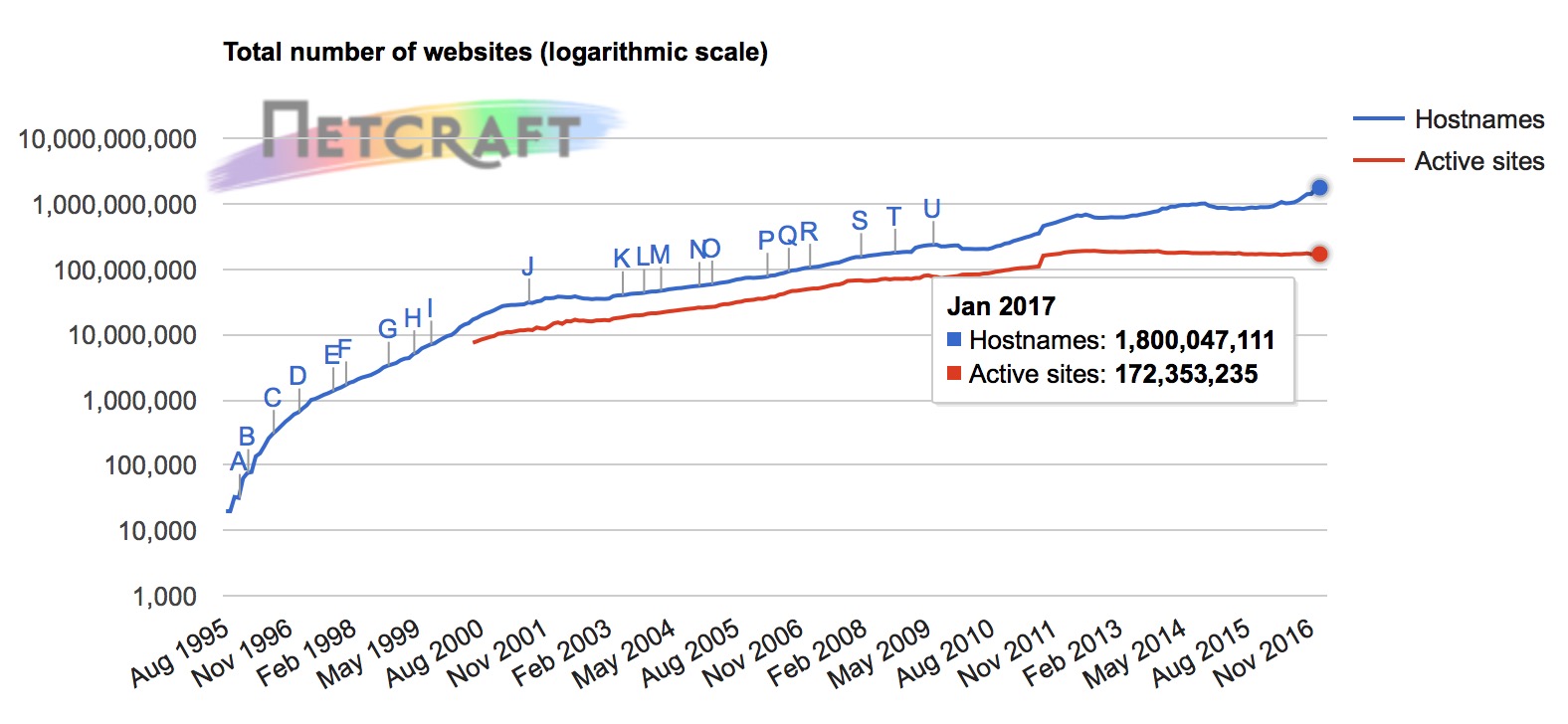
We combine the above data with an interesting finding…
The vast majority of sites “live” in the “long tail” of sites that receive virtually no traffic.
And remember — these are the “active” sites (i.e., still online). Ten times as many have been shut down. The big picture bottom line is dismal indeed.
Does that mean not to even bother trying? Nope! Just try the right way! Following that advice alone will give you a huge leg up on those who believe the Super Bowl ads that a “stunning website” is the same as having an online business that spews cash.
“Try the right way?” Hmmm! 🤔 That tip is as helpful as advising you to run faster than everyone else to win the next Olympic gold medal in the 100 meter dash!
You’d want to know how! Well, good news…
You’ve come to the right place. We asked 95 of the finest minds in the “solopreneur business space.” We had two goals for this roundup of these sharpest of the sharp…
- Let the “Wisdom of Crowds” phenomenon bubble the most important answers to the top. This approach finds the most important points with uncanny accuracy.
- Let you pick each expert’s mind. Each has his/her own unique take on the question that we posed.
If you’re in a hurry, studying the lessons from the first approach gives you the common threads of the collective wisdom of 95 experts. Mastering those few critical elements puts you ahead of most solopreneurs who pick a domain name and get started.
Is that enough if you combine it with “preparation, hard work, and learning from failure” as Colin Powell says? Probably not, but it’s sure going to…
- put you in the 90-95 percentile
- position you for the final assault into the Top 1%
And that is a darn good start. More importantly…
Mastering this “ultimate wisdom,” we promise, is going to eliminate failure before you even start. “Predestined failure” is the saddest part about those who start with hope and faith, but little knowledge beyond what they find in heavy advertising.
It may be sad, but it is what it is. Not enough people take it seriously enough, not nearly as seriously as offline. Why would that be?
The reason is simple. There’s little financial risk online. You don’t sign a $2,000 per month lease. There’s no one to hire. You already have all the “equipment” you need, a computer and Internet access. Costs are pretty darn low.
So most would-be solopreneurs have the following in mind when they start…
“All I can lose is some time.”
Our view, though, is that your time is more precious than money. You can replace lost money, but lost time is gone forever.
Raise your online business IQ to maximize your odds of success. And that brings us to the second approach to the answers…
Each and every expert provides individual answers. You may know some names quite well. Start there. But read them all — new ideas may come from those with whom you are not familiar.
This survey has (accidentally, we admit it) become one of the most valuable e-books on online business success at any price. And it’s free.
Read it all.
Some answers recur, of course. But they’ll be stated in each author’s unique way, adding depth. And then there are the less common, even unique, answers. These are bound to stimulate you…
At least one or two will give you a great idea for your business if you are just starting out. Or, if you are struggling with a 5-year-old business, you may discover the solution to a problem.
So get the PDF version of this post. Set aside a few hours (tops!) for an evening or weekend afternoon session (see the instructions below for how to get this in eBook format). We promise that you’ll want to thank us later!
Oh, Hold On. You’re Missing Something!
As mentioned, we gathered 95 experts for their carefully considered thoughts to the first question that just about any solopreneur would want to ask of these folks. In other words — if you managed to trap one in an elevator, it’s what you’d ask.
You’d have to be mighty lucky to trap 95 like that! And what a mix of experts it is… entrepreneurs, solopreneurs, marketers, speakers, consultants… even a dance instructor!
All have lent their advice so that we can piece together the most valuable info you may ever acquire about online business.
But what the heck was the question?
OK, enough teasing. 😃 The envelope, please ✉..
< drum roll 🥁>
Here’s the question…
Q: What are the three most important best practices that a solopreneur must do well in order to succeed online? Add more if you feel that 3 is too limiting.
No multiple-choice question here. We wanted to pull pearls of wisdom out of their brains, make them put those thoughts into their own words. Here’s who “they” are…
Don’t have time to read them all now?
Let’s Begin!
We can bow out from this introduction now and turn the floor over to “The 95.” Are you nice and comfy, beverage in hand? Or perhaps you’d rather skip to the “Wisdom of Crowds” common threads?
Either way, here we go…
- Mark Schaefer
- Mike Elgan
- Kim Garst
- Mari Smith
- Peg Fitzpatrick
- Joel Comm
- Rebekah Radice
- Nathan Chan
- Jeff Bullas
- Donna Moritz
- Christoph Trappe
- Codrut Turcanu
- Ron Sela
- Minuca Elena
- Eric Enge
- Alois Bělaška
- John Martin
- Tor Refsland
- Andy Crestodina
- Gina Fiedel
- Mike Kawula
- Craig Carpenter
- Dennis Yu
- MaAnna Stephenson
- Ben Fisher
- Neal Schaffer
- Gail Gardner
- Sue B. Zimmerman
- Ted Rubin
- Ian Anderson Gray
- Martin Shervington
- Sarah Arrow
- Bryan Kramer
- Dan R Morris
- David Leonhardt
- Ryan Biddulph
- Michael Q Todd
- Melonie Dodaro
- Michael Brenner
- Jacob Warwick
- Rich Brooks
- Lukasz Zelezny
- Jason Quey
- Warren Whitlock
- Nicholas Scalice
- Christian Karasiewicz
- Jonathan Aufray
- Dre Beltrami
- Reginald Chan
- Sam Hurley
- Tim Hughes
- Amy Schmittauer
- Donna Merrill
- Col Gray
- Tom Gorski
- Aaron Lee
- Lilach Bullock
- Molly Marshall
- Dorien Morin-van Dam
- Mike Gingerich
- Denise Wakeman
- Jan Gordon
- Charlie Patel
- Erica Kessler
- Dave Schneider
- Jeff Sieh
- Guillaume Decugis
- Gini Dietrich
- David Amerland
- John Paul Aguiar
- Jessica Ann
- Alisa Meredith
- Jenn Herman
- Vincenzo Landino
- Emeric Ernoult
- Mia Voss
- Pam Moore
- Ann Handley
- Joe Pulizzi
- Jeff Goins
- Andrea Vahl
- Ana Hoffman
- Vincent Orleck
- Mitch Jackson
- Adel de Meyer
- Daniel Newman
- Katie Wagner
- Ashley Faulkes
- Matthew Kaboomis Loomis
- Evan Carmichael
- Aleksander Saiyan
- Dennis Seymour
- Heidi Cohen
- Ken Evoy
- Mike Allton
- Jitendra Vaswani
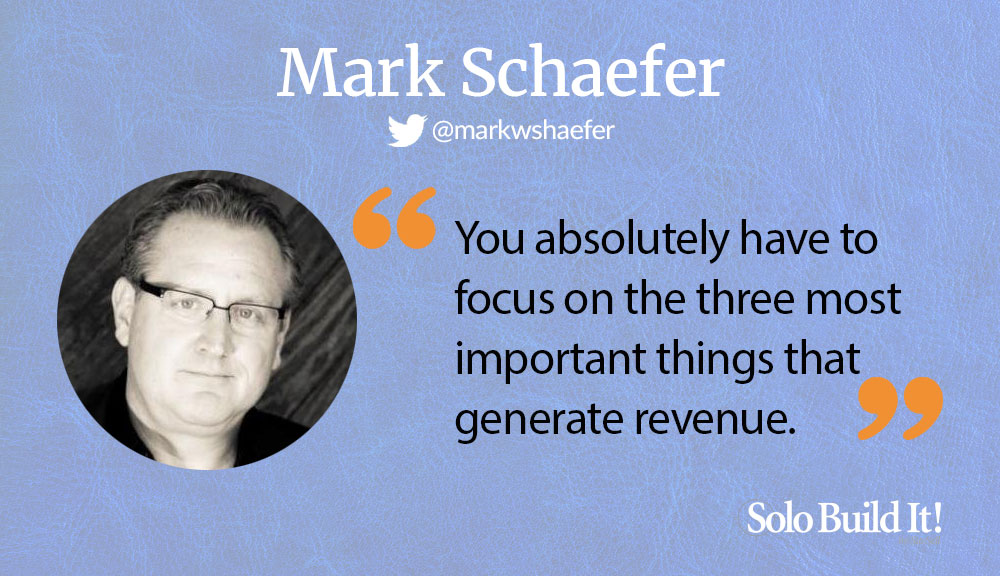
Mark Schaefer
Consultant, Author and Speaker at www.businessesgrow.com
- First, you absolutely have to focus on the three most important things that generate revenue.
Anything else — outsource or don’t do it!
- Second, be flexible.
Don’t be so in love with an idea that you’re not paying attention to new needs from the marketplace.
- Finally, be prepared to be broke for two years.
Too many people go into business without the financial buffer to grow the business in a smart way. Cash gets tight and then they make desperate decisions. A big problem! So think through the money situation before you begin!
#1 social media keynote speaker, author, and consultant; Digital transformation; Five best-selling marketing books; Marketing Companion podcast; College educator.
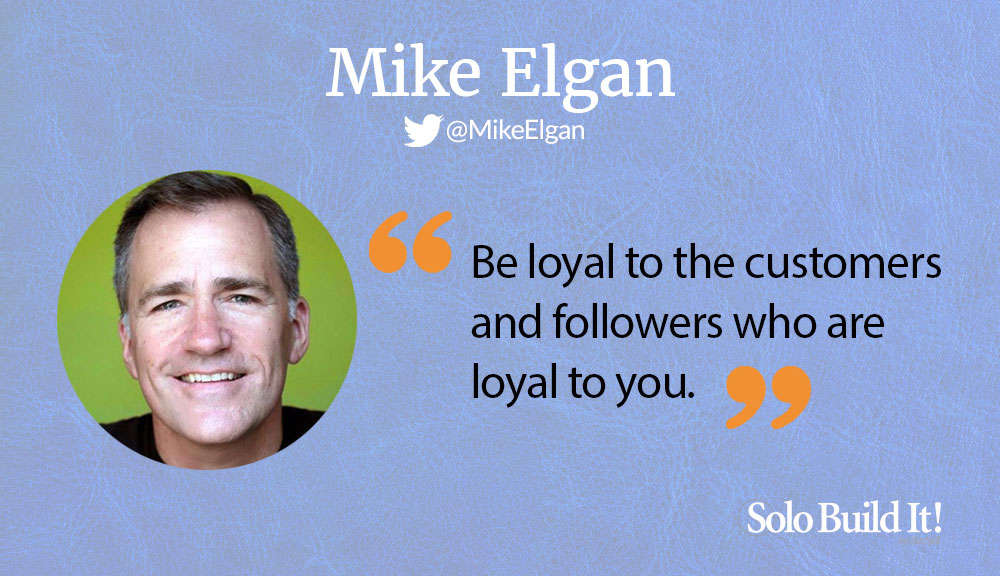
Mike Elgan
Journalist at www.elgan.com
- Start quality conversations (related to your business) online and engage in those conversations.
- Use social posts and photos to give a window into your life.
- Experiment constantly with what you do and how you do it.
- Crowdsource: bring your social audience into the brainstorming process.
- Be loyal to the customers and followers who are loyal to you.
About Mike
Mike Elgan is a journalist who writes and talks about digital nomad living, mobile computing, AI, virtual assistants, consumer technology and food technology!
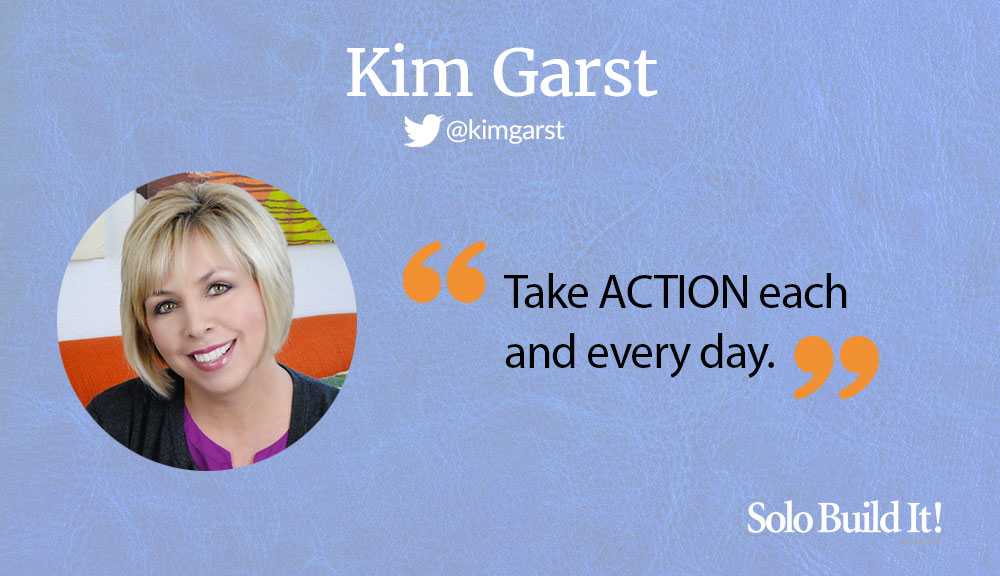
Kim Garst
CEO of www.kimgarst.com
- Good enough is just that… good enough.
Perfection is the downfall for so many entrepreneurs. You have to move beyond that quickly. Otherwise, you get stuck in “it’s never good enough” and nothing gets out the door.
- Take action each and every day.
Not just any action, but action that moves your business forward in a way that has a financial goal at the end of it. What I mean by this is that so many times, as entrepreneurs, we get caught up in the daily minutiae and then, at the end of the day, realize that we haven’t done anything that really moved our business forward.
- Surround yourself with those who are where you want to be.
The old saying that you are who you hang out with is so incredibly true as an entrepreneur. If you don’t personally know those who are where you want to be, yet, then tune into their podcast, website, live videos, etc. Plug in to what their message is and feed your brain with knowledge and inspiration.
Kim helps entrepreneurs grow their business with social media! Keynote speaker, Forbes Top 10 Social Media Influencer. Live Video Pro. Loves God, family and hockey!

Mari Smith
Leading Facebook Marketing Expert at www.marismith.com
- Understand your people really, really well and look to attract your 1,000 true fans, as Kevin Kelly calls them.
You don’t need to reach millions to create success. Have you clearly defined your customer profiles? Do you know your audience’s favorite social network(s)? When was the last time you surveyed your audience? Is your email list segmented properly? Have you experimented with Facebook’s Custom Audiences, Lookalike Audiences and hyper-granular targeting options?
- Go all in on video.
The vast majority of businesses can benefit greatly from the power of video, particularly live streaming video. Consider making it a habit to broadcast regularly using Facebook Live, or Instagram Stories, or Twitter Live. Start once a week and build from there. Share your story and your customers’ stories. Educate your audience. Entertain them, if you can. Think of ways to stand out and create what Facebook calls “thumb-stopping content.”
- Stay focused.
A million distractions will tug at you every day. Sometimes every minute of the day. You need to stay committed to “keeping the main thing the main thing” as Stephen R. Covey says. Remember your why. And block off chunks of “airplane time” to hunker down and be productive. Check out the book “The Compound Effect” by Darren Hardy — success doesn’t happen overnight. It’s your daily habits that compound over time to create success.
- Get help.
You might think you are Superman or Superwoman, but it’s vital to your success to learn how to delegate tasks that you’re either not great at, or you don’t care to do, or that are not really the highest and best use of your time. Time is your only resource that you cannot buy more of… unless you learn to outsource well!
Social Media Thought Leader | Top Facebook Marketing Expert | Globe-trotting Speaker | Author
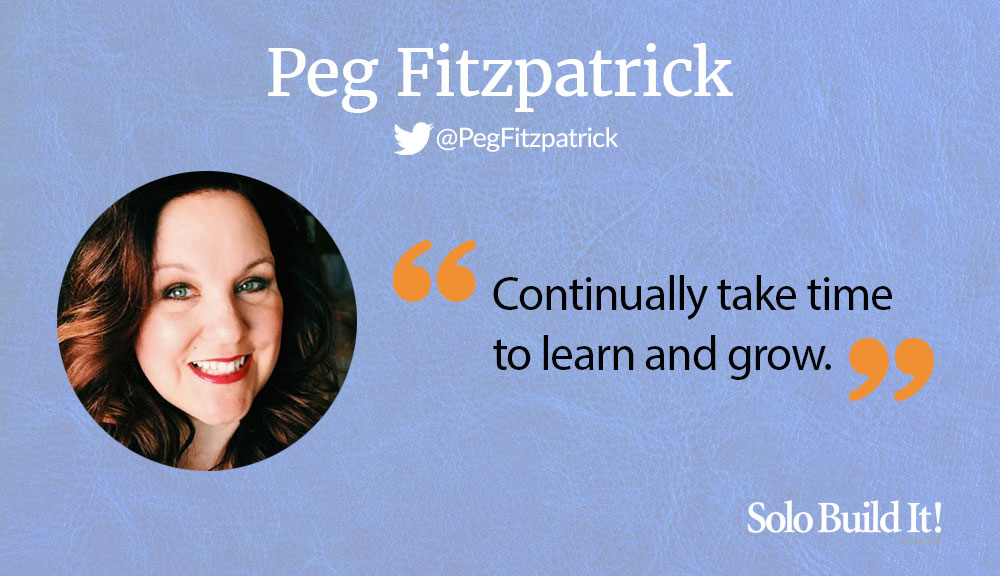
Peg Fitzpatrick
Director of Content Strategy + Social Media, Tailwind at www.pegfitzpatrick.com
- Don’t blindly follow experts.
Make your own tests, plan, and act accordingly.
- Be original.
There’s already one Gary Vaynerchuk. He’s awesome but that’s all we need. Develop your own voice to build thought leadership.
- Continually take time to learn and grow.
Take courses, read books, never stop learning.
Also remember that there isn’t one timeline for success. Each of us is on our own journey. Be patient, set goals, and when you reach them, celebrate! Each small step builds your success.
Rockin’ a positive attitude ✨✨ Director of Content Strategy + Social Media @TailwindApp ✨ Instagram + Pinterest

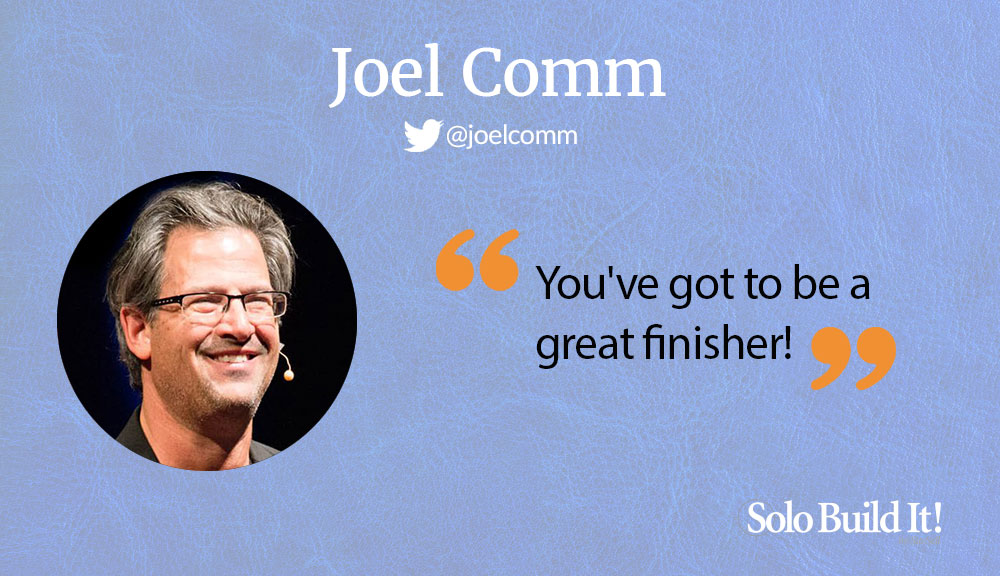
Joel Comm
Live Video Marketing Expert at www.joelcomm.com
- You’ve got to be a self-starter!
With no one else to hold you accountable, nothing gets done unless you do it. So you’ve got to want your freedom enough to do what is needed, even if you don’t feel like it.
- You’ve got to be a great finisher!
I can’t count how many projects I started but haven’t seen through to the end. Not all projects are worthy of being started in the first place, let alone finishing them. But solopreneurs tend to get BSOS (Bright, Shiny Object Syndrome), and it could lead to many false starts. Be sure you focus on the core of your business and see those projects through to completion.
- Have fun!
You aren’t signing up to work for yourself so you could have a J.O.B. (just over broke). You have a vision and passion for doing things differently… your way. The “hustle and grind” is fine for a season, but as a lifestyle it isn’t sustainable. Make sure you are having fun doing what you are doing. Remember, life isn’t about the destination, it’s about the journey. Enjoy your journey. 🙂
Live Video Marketing Expert, Keynote Speaker, NY Times Best-Selling Author, Social Influencer
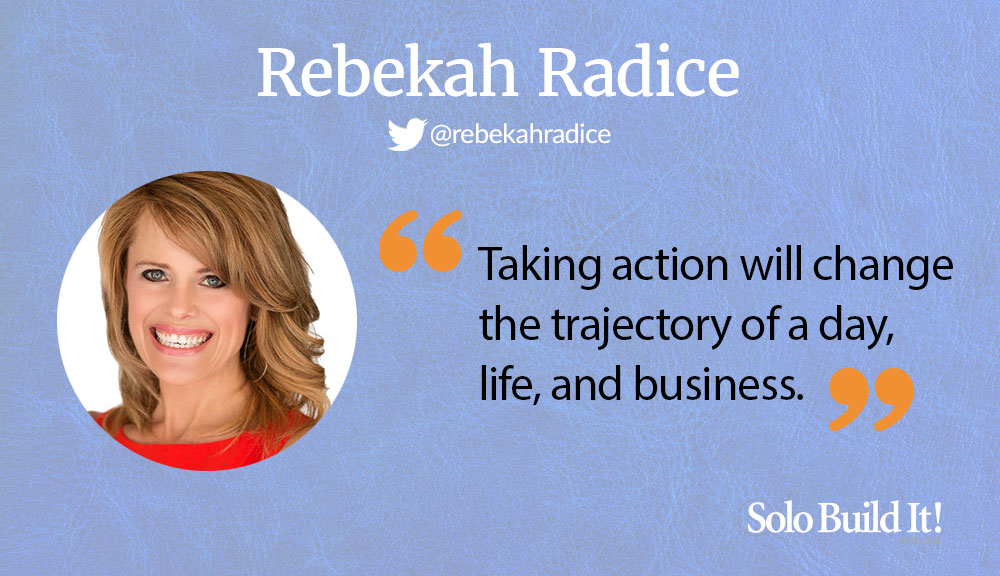
Rebekah Radice
Chief Marketing Officer at www.postplanner.com
- Guard your time.
Solopreneurs have a difficult time saying no, but that’s exactly what you have to do to succeed. As David Duchemin so wisely said, “Guard your time fiercely. Be generous with it, but be intentional about it.”
- Get Active.
Being a solopreneur isn’t always easy. It can be lonely, frustrating, and often challenging. Especially when you work from home and don’t have a solid support system.
But it’s those moments where the power of action makes all the difference. Taking action will change the trajectory of a day, life, and business.
When you’re faced with a challenge, don’t say “why me?” Instead, do one thing to propel your business forward. It doesn’t matter how small that action is, as long as you’re moving in a positive direction — that’s what matters.
- Define Your Highest Priorities.
Solopreneurs can get lost in “the weeds” of the day-to-day in business. Avoid that by staying focused on your highest and best. Then be ruthless in your pursuit of constant improvement.
Take the time to write down the top 5 things you have to do (that no one else can do). Then give everything else away. A scalable process only happens when you focus on maximizing your time and skills.
Once you’re clear on that, find the people who not only fill in the gaps, but push you to new levels.
CMO | Evangelist @PostPlanner | Top 10 #SocialMedia, Top 40 #ContentMarketing Influencer | Keynote Speaker | Social Media and Digital Marketing Writer
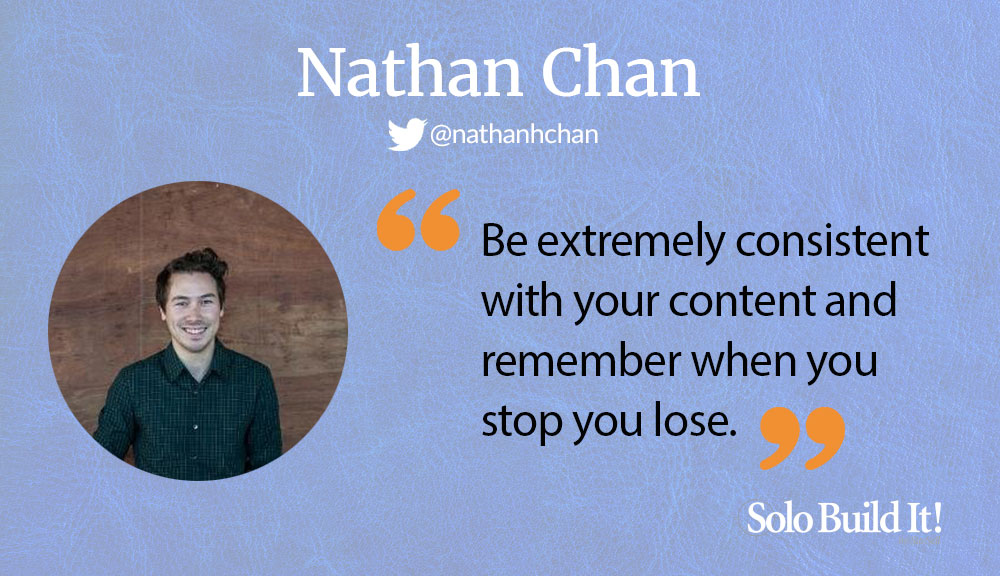
Nathan Chan
CEO at www.foundrmag.com
- Have a way to differentiate yourself as there are way too many gurus.
- Set clear goals.
- Be extremely consistent with your content and remember, when you stop you lose.
Publisher & CEO of @foundr. Entrepreneur and Dreamer

Jeff Bullas
Founder at www.jeffbullas.com
On the social and mobile web you are defined by content. So…
- The first step is to create the best content you can that solves the biggest pain points of your potential customers.
- Next you need to hustle that content to the world to get noticed, build trust and grab attention.
- The last step is to convert that engagement and credibility into leads and sales.
If you don’t execute the last step the rest is just busyness and noise.
Jeff is an entrepreneur, blogger, author, marketer and keynote speaker. He works with businesses to optimize their digital brand with emerging technologies, content, social media and digital marketing. His mission: “Inspire and educate people to win at business and life in a digital world.” He has spent most of his career involved with information technologies, telecommunications and the web.
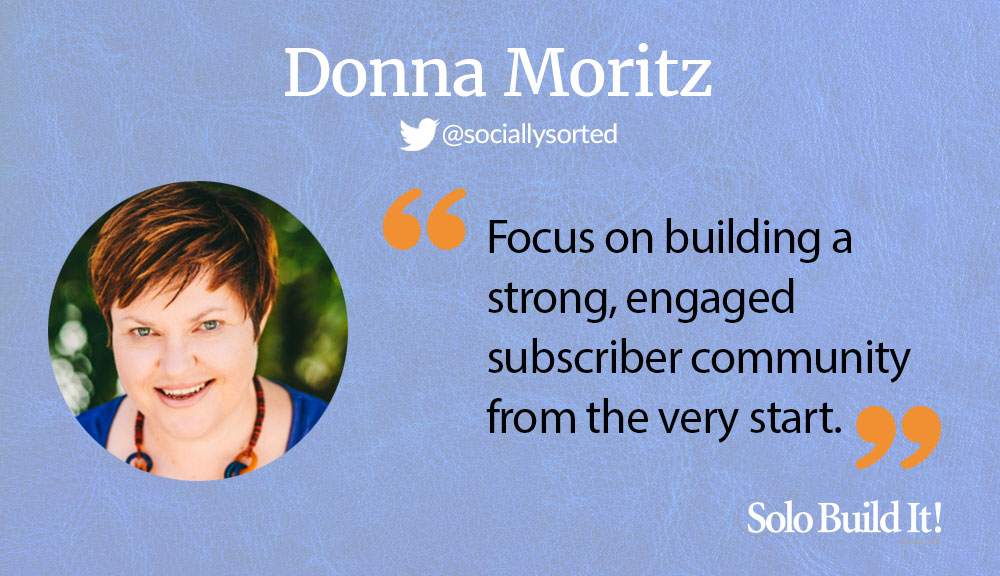
Donna Moritz
Founder at www.sociallysorted.com.au
- Spend time getting to know your audience and how you can best help them.
Survey them/ask them about their single biggest challenge and tailor your content around helping them solve those challenges.
- Focus on building a strong, engaged subscriber community from the very start.
- Provide consistent “core” content on one main platform such as your blog, podcast or video channel, supported by social media.
Focus on providing value to your community — the relationship from fan to customer becomes easier if you do.
Donna helps business owners get more traffic, shares and sales using visual social media and content strategy.
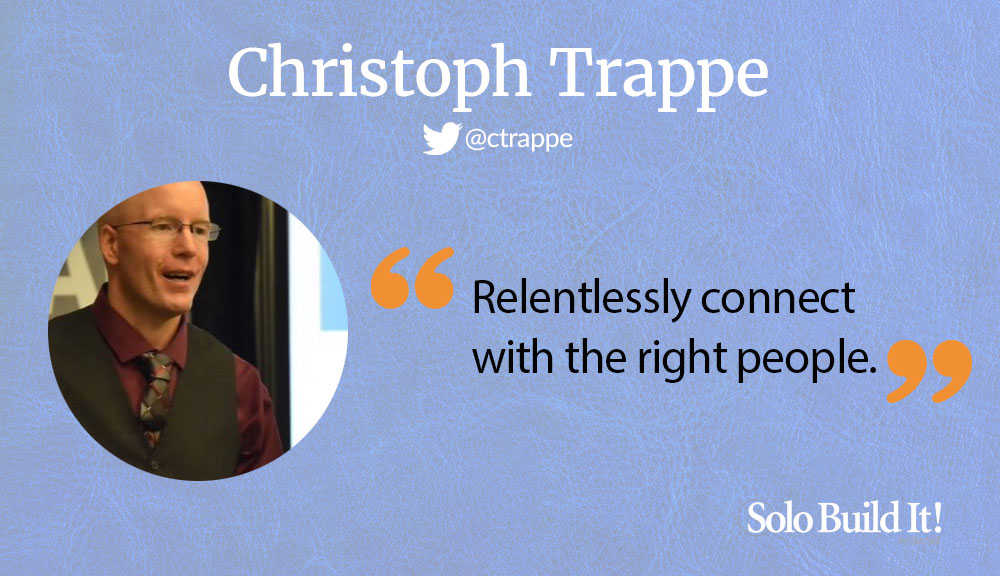
Christoph Trappe
Keynote Speaker and Author at https://authenticstorytelling.net
Three things:
- Be very aware of your unique differentiator.
- Talk about your expertise nonstop on all relevant channels.
- Relentlessly connect with the right people.
Christoph Trappe (aka The Authentic Storyteller™) is a career storyteller who has worked as a journalist, a nonprofit executive, and a content marketing strategist and consultant. He is a global keynote speaker, frequent blogger, and author.

Codrut Turcanu
Blogger at www.codrutturcanu.com
- Build your mailing list.
Use a dedicated autoresponder service such as AWeber — it helps collect emails and follow-up with your prospects automatically, while you do something else.
- Brand yourself.
Have the same specific image (name, headshot, header, tagline) appear in your emails, website and social media profile.
- Educate your market (target leads and clients).
Publish articles, quick tips and relevant resources all over the web, to inform and educate your target market.
Codrut Turcanu helps entrepreneurs connect with experts, influencers and probloggers.
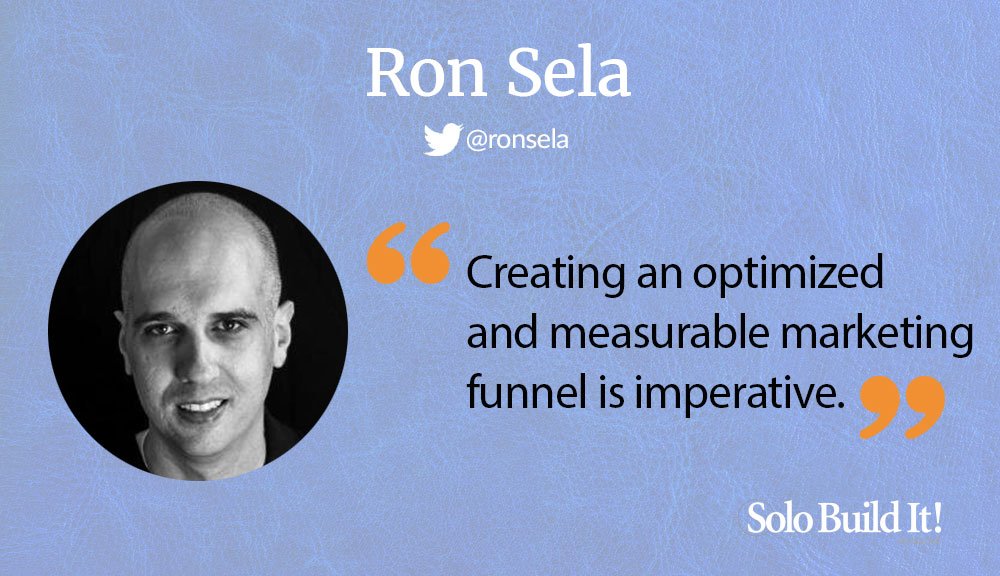
Ron Sela
Growth Marketing Consultant at www.RonSela.com
- The three most important best practices start with knowing your ideal audience.
The goal is always to identify customers so well, there’s less need to hard-sell them, but rather let the product or service sell itself. Traffic is important. However, traffic alone doesn’t equal conversions, therefore knowing, and targeting down to the specifics is important. Asking questions about the people you want to reach is one way to narrow down the details. Questions like, what do they care about? What do they read? How do they choose their products? How can their lives be made better? These profound questions get down to the wants and needs of the target market, making attraction easier.
- Creating an optimized and measurable marketing funnel is imperative.
Continually monitoring the traffic going into the funnel, to the number of actual conversions, shows what is working at any given time. Further analysis will show where along the funnel the switches are happening. Defining the steps in a funnel is essential. Most go along with four simple bullets, such as engage, nurture, convert, retain. Choosing how often to look at the sales funnel, dissect the behaviors of the users, and compare them comes next. Finally, testing marketing strategies, understanding the areas of weakness, and taking action for each field will raise productivity while maintaining progress.
- Using marketing automation as much as possible is an essential practice.
Email campaigns that are personalized to speak to the audience, scheduled social media exposure at peak times, and automated email follow-ups are three ways marketing automation creates a professional and efficient blueprint for a solopreneur. Through marketing automation, guesswork is taken out of many essential areas of business, while simultaneously freeing up time for efficiency where it is critically needed. Additional connections such as promotional offerings, or pieces of valuable content, can be automated to reach low-lying traffic, stirring them into the funnel again. This practice can be best related to the age old saying, “work smarter, not harder.”
Ron Sela is an all-round marketing expert with a particular interest in influencer marketing. He’s featured in a number of well-known marketing journals, and is a blogger at RonSela.com.

Minuca Elena
Expert in Influencer Roundups at www.minucaelena.com
- Build a strong, trustworthy brand.
I often see sites of people who provide a service but don’t have a blog. It is not enough to have a portfolio of your work, testimonials and a contact page. If you want to attract potential clients, you need to write great content that will prove your expertise. Then you have to learn to optimize it for the search engines and get backlinks to it so that you can rank high in Google’s search results.
- Build relationships with influencers.
It can take years for you to build a large following and learn everything you need to succeed in business. That’s why to accelerate your growth you should associate with people who already have a successful business in your niche. If you build genuine relations, you will get referrals, clients, opportunities to present your offer in front of a broader audience, and many other advantages.
Bonus tip: try to connect with business people who are in a shoulder niche. They are entrepreneurs who have the same audience and offer services related to yours but not the same thing. For example, if you are a blogging coach who sells courses or training for new bloggers, you can connect with web designers. They build sites for new bloggers, and they could send some clients on your way.
- Sell products or services that provide value in people’s lives.
In business, you always need to have something to sell. You can sell physical or digital products, or you can sell your time and provide services. There is a lot of work involved in an online store. You need to find the best eCommerce platform, to invest money in manufacturing the products, distribution, supplies, etc.
Also, it’s much harder to get links to product pages because bloggers usually link to content. Despite all those difficulties, the earnings from selling physical products are much higher than from selling 1-1 coaching or eBooks.
No matter what you choose, you should always sell something that people are searching for, and that will help them improve their life.
Minuca Elena is a freelance writer who specializes in creating expert roundups. Her posts provide quality content, bring huge traffic and get backlinks. She also helps bloggers connect with influencers.

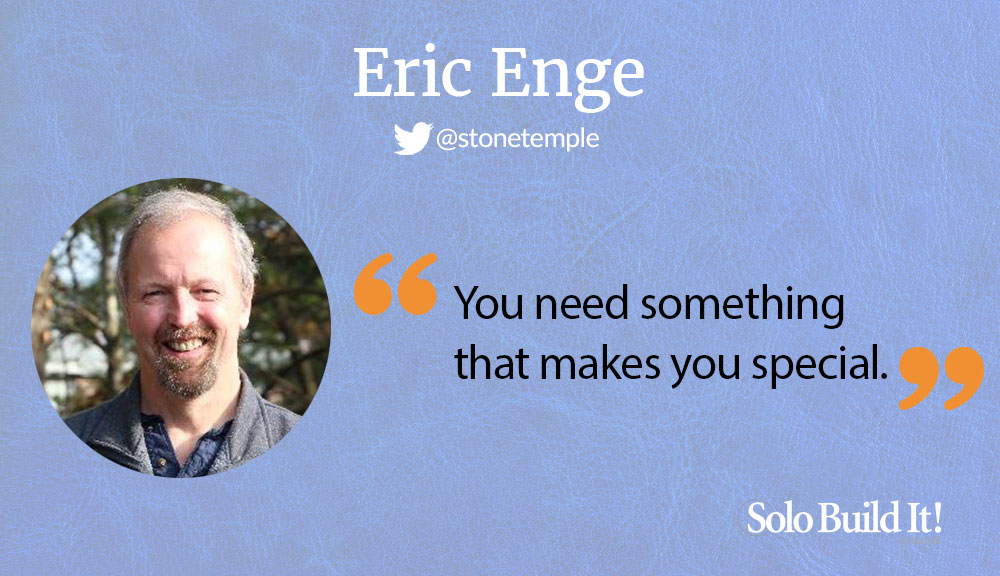
Eric Enge
Digital Marketing Excellence Practitioner at www.stonetemple.com
- Learn to count.
OK, I know that seems like I’m being facetious, but actually, I’m not. What I’m getting at is that you must be able to manage your money. I’ve seen many people who are brilliant at what they do who don’t manage the expenses of the business properly. Or, they don’t manage the cash flow they need for their personal expenses properly. If you don’t get this right, you will fail.
- Fail fast.
This is one of the most popular suggestions people make when asked questions like this, but it’s actually a critical aspect of success. As a solopreneur, you’ll consider many different options for areas to focus in, and not all of them will work. Don’t get trapped into a long-term death spiral with something that almost works.
If you’re going to do something, do it without hesitation and work it hard. Invest heavily enough in it that you can figure out if it’s going to work quickly, and if it isn’t working, jettison like a load of hot rocks. If you get good at this, you can turn this into a process to find out the things that are going to work really well.
Just keep in mind, by definition, you’re going to try some things that don’t work. Not only is that OK, it’s good. Nothing gets you to success faster than cycling through your failures quickly.
- Find your critical leverage points.
You need something that makes you special. If you’re a solopreneur you’re inevitably competing against larger players, so you need to know why it is that you can beat them. Is it because you’re local? Is it because you’re part of the community (your son plays soccer with their son)? Is it because you have a highly specialized niche that you focus on? Is it because you need to leverage one particular channel (for example, a social media channel) much better than your competition?
At the end of the day, know why it is that you should win a piece of business, and continue to foster that as your special edge.
- Learn how to sell you.
As a solopreneur, this is what you’re selling. Yes, you may offer some product or service, but the customer is going to buy from you because of you. Because they trust your expertise. Because they trust your brains. Because they trust their connection with you. Because they trust you.
Eric Enge was named 2016 Search Marketer of the Year (Male) at the Landys, and 2016 Search Personality of the Year at the US Search Awards. Stone Temple Consulting was also named Best Large SEO Agency of the Year at the US Search Awards. He is co-author of The Art of SEO, and also writes columns in sites such as Search Engine Land and Moz. Eric is the Founder and CEO of Stone Temple Consulting (STC), a 70+ person digital marketing agency based in Massachusetts. STC offers content marketing, SEO, and social media services.
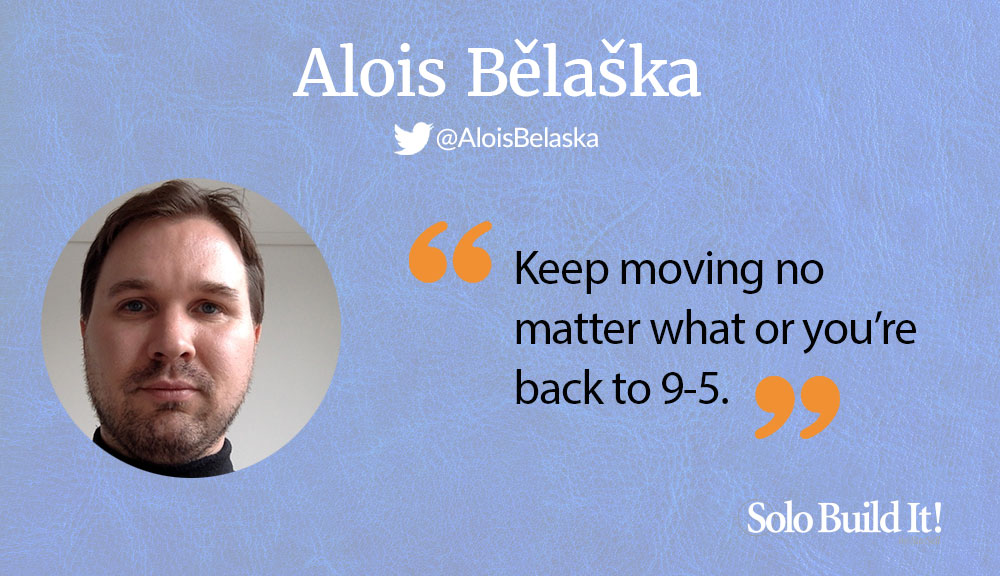
Alois Bělaška
Founder at www.friendsplus.me
- Family.
It’s all about time, and it’s especially true for solopreneurs. If you’re still alone, good — you have plenty of time you can invest in your solopreneur endeavor. If you have a girlfriend/boyfriend or wife/husband already, mind that your partner is the best and the most important support you’ll ever have. It’s unbelievably hard to make any progress without their support.
Keep your family in the loop. Communication is essential.
- You.
Do you know who you are? I strongly suggest you work on that. Know yourself.
What problems are you capable of solving? Do you have resources (time, money, knowledge, …) to solve them? Are you passionate about the problem/solution enough to find the will to keep pushing for the next 2–3 years?
It’s essential to make sure there are people with the same problem willing to pay for the solution.
- Enjoy the ride.
There will be ups and downs so be prepared for a rough ride, and remember, you have to keep moving. Keep moving no matter what or you’re back to 9-5.
Enjoy every minute of it because life is too damn short.
Alois Bělaška is the founder of Friends+Me, a Google+ management tool.
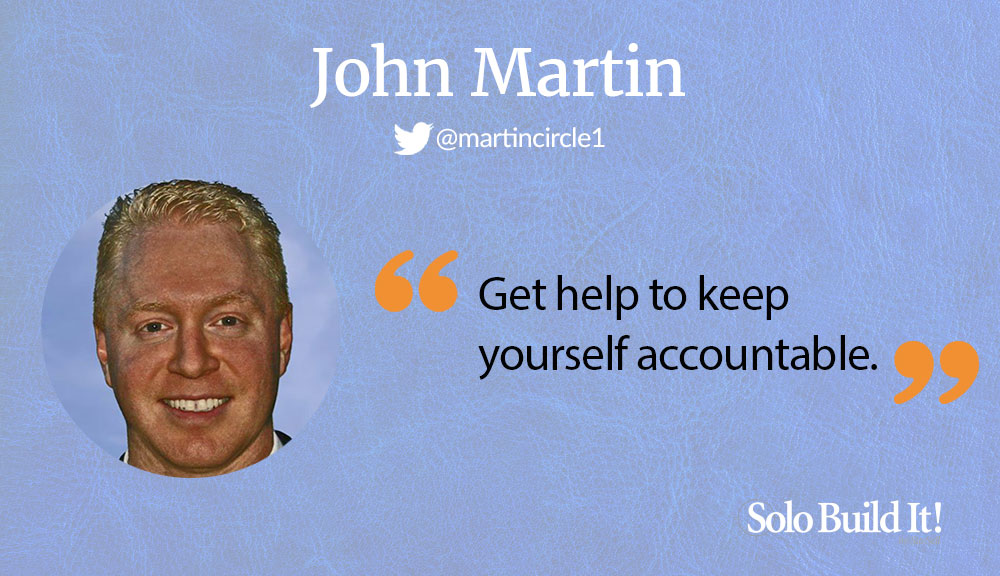
John Martin
Founder at www.boostyouraudience.com
Online success is a journey. Answers may change. But I’ve invested countless hours over the last decade studying this.
Many things are important. But a few super actions can help you accomplish dozens of other objectives.
I’m convinced the following three habits are huge:
- Make time each morning to think about and decide exactly who you are, what audience you want to build, and what is that one great thing you can offer people.
We’ve all had some exciting idea. Then we became disappointed, failed, lost our enthusiasm, listened to negative people or lowered our expectations.
I’ve done this.
From these painful times, I’ve learned that most people’s goals are really wishes. No real plan or action steps.
And most people don’t really make time for one surprisingly simple and enjoyable activity.
In his book “Bull’s-Eye,” renowned business expert Brian Tracy says the highest value activity we can do is thinking.
My bedtime routine helps me wake early each morning to do my thinking. It’s really the very best time. (I’ve always been a night owl, so this was a big change.)
Now I roll out of bed into my exercise clothes, brush my teeth and drink a glass of water to rehydrate.
Then I start walking while I do deep breathing. I spend a couple minutes focusing on all the good and positive things in my life. Then a few more minutes to imagine myself reaching my goals — this year, this month, this week and today. After that I pick up the pace, crank up my headphones and keep repeating aloud a positive phrase as I move.
Some mornings I spend an hour at this. But even after fifteen minutes I feel on top of the world!
It’s fantastic for re-selling myself on my goals, for tweaking my plans and for building my confidence.
How can you decide on your audience? Ask yourself: If you were stranded on a desert island for a couple years, but you had all the time and energy to study just one topic, what would it be?
Even after you commit to an answer, take time daily to get yourself excited and recommit to this topic.
How to do that? Back at the office, I take a few minutes for my daily social media routine.
Who’s speaking to my audience? I follow them and their followers. I study their comments and engage with them. I look to see which of my tweets/posts/ideas they like the most. I also keep a list of their biggest and most painful problems.
After this, I write down at least 10 ideas to follow on for solving these problems. I think and think until I get ten ideas. If this is really tough to do, I read more about my topic.
Working with these ideas helps me uncover my audience’s deeper desires and objectives.
This morning routine has helped me become more and more consistent, energetic, creative, focused and courageous.
- Get help to keep yourself accountable.
As kids, we didn’t ask our parents to make us eat our vegetables, go to bed or take a bath. And most of us didn’t appreciate all this help for years.
I didn’t.
But without this kind of help, we’d all be fat, sleep-deprived, dirty little kids.
Every president, CEO or person who gets things done appreciates the power of making themselves accountable to someone else.
Without it, most of them would be playing Candy Crush or Words With Friends.
I’ve had wild success and utter failure in business. And the success only comes when I am working with a mentor or business partner who respectfully keeps me on task.
This is a big reason why coaching and online courses can change your life.
- Make social media your slave. Not the other way around.
Almost everyone spends their “free” time there. But not you.
Sure, the distractions are so tempting. But you simply cannot afford to go down this path.
Strictly watch your time. Use tools to leverage your time.
Learn all you can about your audience in the shortest possible time. Get in, get out.
Social media is one of (if not the) most powerful traffic-generating, client-getting resources in existence.
It’s like what Google and SEO did for you a decade ago. Sure, Google is still powerful, but social media is amazing.
And know this: Social is for conversations, for being helpful, but not for selling.
Your number one objective with social media? To get people away from social and onto your blog, your website.
Your site is where you get people on your email list or your webinar. And it’s where you sell.
Social media is for meet-and-greet only. Your website is further along in the conversation.
Why do this?
You should only make offers appropriate to how much trust you’ve built with people.
Do this and you’ll have the clients and sales your heart desires.
But more than that, you’ll begin to think a whole lot bigger.
You won’t worry as much. And you’ll happily share your work with people who truly appreciate you.
John Martin helps business professionals make social media simple and get the results they really want.
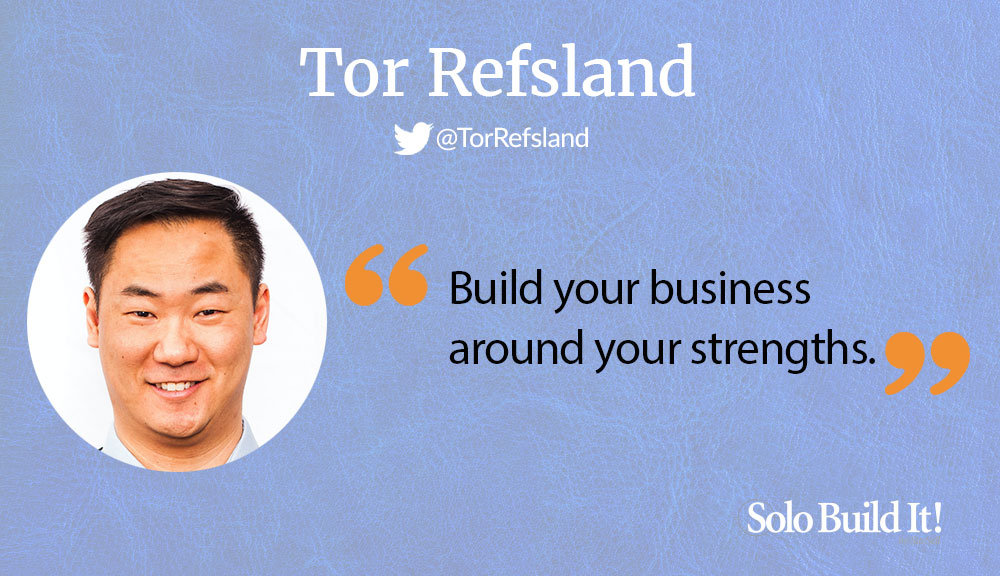
Tor Refsland
Business Coach and Digital Marketing Strategist at www.torrefsland.com
You want to be successful online?
Duh, of course you do!
Then over to the one million dollar question…
“How do you define success?”
I hope you didn’t say traffic, social shares and comments.
Because here’s the thing that most people won’t tell you.
Those are what I call the vanity metrics.
They make you and your brand look cool and all that, but at the end of the day…
…they don’t mean sh*t when it comes to you generating more income in your business.
Last time I checked, you couldn’t buy bread and milk at the grocery store by flashing a snapshot of the social shares on your latest blog post.
Want to be successful online?
Focus on the activities that generate income.
So here are the 3 most important things you need to do in order to succeed online:
- Build your business around your strengths.
If you also happen to have a passion for what you do, it’s just a bonus. But if you are building your business around your passion alone, you will most likely go broke.
- Position your brand.
If you want to be able to charge premium prices for your product / services, people need to perceive you as an authority in your field.
Want to know a secret? With the right positioning of your message, you can design how people want to perceive you and your brand. Yeah, and this again leads to you being able to charge premium prices.
- Put in the work.
Many solopreneurs / online entrepreneurs are just looking for shortcuts. They suffer from the shiny object syndrome and are jumping from course to course, and from tactic to tactic.
That won’t work.
You need to pick a strategy and go all in.
Yes, you need to put in the hard work, and you need to make sacrifices.
What’s most important to you? Hanging with your friends on the weekend, or building a successful business so you can pay your bills?
You might be thinking, “Tor, that sounds good and all that. But does that really work?”
Great question! Judge for yourself.
I used these 3 steps last year in my business.
And the results? I was able to 20x the revenue in my business through business coaching.
Do you think I made sacrifices to get that result?
I sure did.
Do you think it was worth it?
Heck, yeah!
Tor Refsland helps talented entrepreneurs to position their brand so they can attract high-end clients.

Andy Crestodina
Co-founder at www.orbitmedia.com
A lot of businesses have a hacker and a hustler. The hacker provides the value while the hustler does the sales and marketing. As a solopreneur, you’re both. And it’s tough. You’re a busy, time-crunched service provider who has to grow the business at the same time. You’re the waiter and cook.
But put these items at the top of your priority list.
- Write
The most efficient sales and marketing tool in the long run is content. Your writing drives durable benefits. It’s there when you’re not. Do it well and for long enough, and it makes all of your communication more efficient. If a prospect asks a question? Reply with a detailed email, then turn that email into an article. That way, sales time and service time become marketing time.
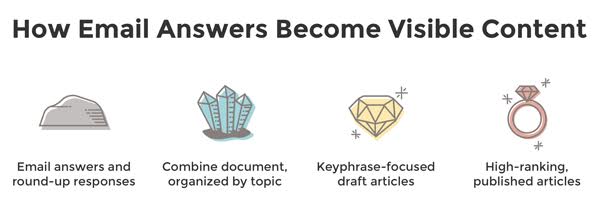
- Delegate
Before you lose your mind, build a team of assistants around you. When you do something important, document your process. Keep refining those documents and now you can hand off those tasks to task rabbits, virtual assistants and junior team members. Documentation is the key to delegation.
- Collaborate
This is the magical overlap on the Venn diagram of networking and marketing. Whenever you have the chance, pull in an expert to contribute. Find pros and pull them into your conversations, your articles and your processes. There are three enormous benefits:
- The quality of your work will improve, whether it’s your services or your marketing.
- Your network will grow, which will increase referrals and opportunities.
- You’ll start having more fun. Working with people is the best part of working. Fun matters.
It doesn’t show up in Quickbooks or in your analytics, but if it did, it would be one of the most important reports of all:

Andy Crestodina is the Co-founder of Orbit Media, content marketer, speaker and author of Content Chemistry.

Gina Fiedel
Co-founding owner at www.fateyes.com
- Take the long view and always keep a mind toward sustainability.
- Know who you are.
Don’t be afraid to build your business around who you are rather than trying to squeeze into some contrived business model that doesn’t fit. In tandem, your online identity should be congruent with your identity offline. This will naturally build-in your best shot at succeeding because it will not only be sustainable, your efforts and passion will be genuine.
- Cultivate a support system.
Make sure there are people you can turn to not only for advice or suggestions but also to supply you with realistic feedback, encouragement, a sounding board and a sense of community to bolster the solo venture you’re embarking on.
- Find the people whom you admire and learn from them, but don’t try to be them.
- Good communication matters like crazy, so your communication skills are critical.
Pay attention to that — not only to what you say but how you listen and respond. Spontaneity is a great thing. And you’ll want to keep a watchful eye on any potential you may have for reactive behavior. If you take advantage of it, online asynchronicity will ensure you’ll always have a chance to take a pause before responding to things too quickly. What happens online can be forever. Think before you leap.
- Investing in your relationships with customers or clients is key.
Everything will always come back to that. Never devalue the time you spend engaging online, getting to know who you’re talking to and who you’re serving.
- Trust that when you’re convinced you’ve run out of reserves, energy or inspiration, there’s always more.
You can always surprise yourself. You always have the potential to surprise yourself.
Gina Fiedel is the co-founding owner of Fat Eyes Web Development. We pour our creativity, ingenuity and passion into every project we do. Creating connection since 1998.
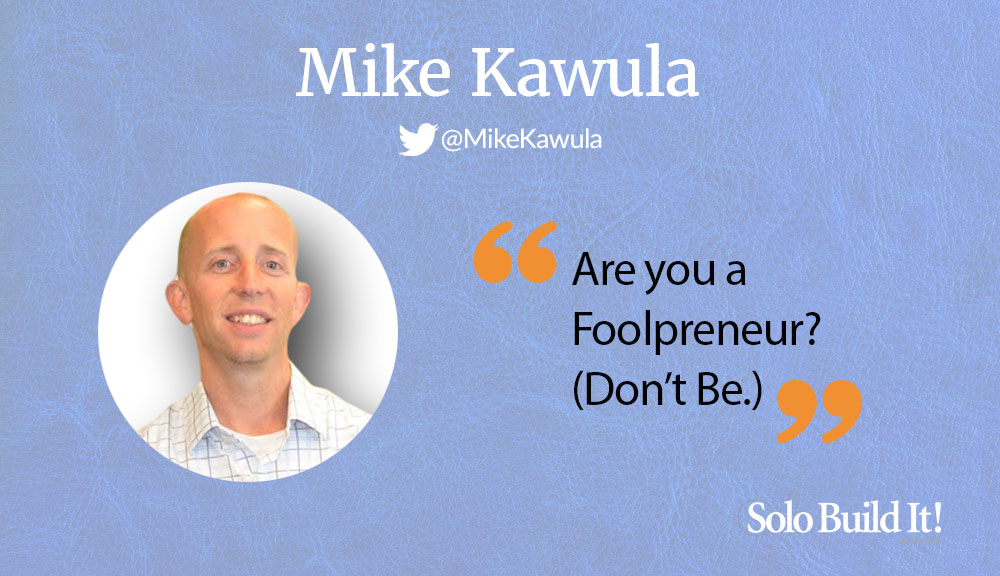
Mike Kawula
Entrepreneur & CEO of www.socialquant.net
Being a solopreneur isn’t easy, especially if it’s your first leap into the entrepreneurial arena.
I believe that most solopreneurs share the following same three characteristics:
1) We Grind
2) We Sacrifice
3) We are Determined
We all grind relentlessly, sacrifice (either time with our family initially or that steady paycheck) and we’re all determined that our business will succeed.
Unfortunately, though, many don’t succeed, despite having these characteristics, and that is very disheartening to me.
How can one business become wildly successful while another similar business struggles, especially when both owners are grinding, sacrificing and staying determined?
Those that aren’t enjoying success simply aren’t GSD (Getting Stuff Done)!
If you want to be successful online, let me share with you 3 things you must do well.
- Imperfect Action Beats Perfect Inaction
Repeat after me: hesitation is the enemy of success.
You need to get your product or service to market fast.
The number one reason most businesses fail is lack of capital.
Your product or service will be dramatically different in 12 months’ time when you get feedback from the market and iterate.
The only way to get feedback is to launch — and launch quickly!
- Slaughter the Naysayers
If I can’t have it, neither can you (aka: Crabs in a Bucket*).
When you’re on the rise, sadly, your friends and family may try to pull you back down with them. This can shed uncertainty on the idea in your head. Don’t let it!
The naysayer can also be you inside your own head.
You’ll be in online groups or listening to podcasts, comparing yourself to where someone else is in their journey and start wondering why you aren’t there too.
Don’t compare. All experts were once beginners.
Remember, the naysayers need to be slaughtered (figuratively). You need to be in a healthy mindset to reach your destination. Naysayers can kill that mindset.
- Are you a Foolpreneur? (Don’t be.)
This is the most important piece of advice I want to share, along with the solution.
Scarier than a wantrepreneur is what I call a “Foolpreneur.”
A wantrepreneur is someone who wants to start a business some day and is just waiting for the “perfect idea.” Fortunately for them, most wantrepreneurs have a J.O.B. (steady income) and haven’t taken the entrepreneurial leap.
A “Foolpreneur” has taken the leap and is solely dependent (along with his family) on the business working.
So what’s the difference between a “Foolpreneur” and an “Entrepreneur”?
Foolpreneurs are definitely grinding daily, sacrificing, and I’m sure they’re extremely determined, but they aren’t GSD (getting stuff done) — at least, not the right stuff.
They’re playing business and are stuck working in their business instead of on their business. If you’re not sure what this means, you absolutely need to read my favorite book, The E-Myth by Michael Gerber.
Many Foolpreneurs fool themselves by doing either urgent / less important work (checking email) or less important / less urgent work (sitting in Facebook groups, surfing the Internet).
At the end of the day, they feel they’ve worked hard, but in reality it’s a fool’s paradise. They haven’t done one thing that’s going to move the dial and grow their business.
Every solopreneur needs to learn the Eisenhower Matrix and ensure they spend their time in the top quadrants only, outsourcing the bottom tasks or limiting time on those tasks.
If you follow these 3 pieces of advice, I’m positive you’ll set yourself up to be a wildly successful solopreneur.
Now, no excuses — just GSD!
Mike Kawula is an Entrepreneur and the CEO of Social Quant, a top-ranked Twitter tool by HubSpot that helps you find the most relevant followers on Twitter who will interact with your podcast. Mike’s last 3 businesses each hit 7 figures in under 3 years, with his last being ranked the 144th fastest growing company by Inc. Magazine. He’s an author, and has been featured on CNN, interviewed by Anthony Robbins and featured in over 100+ publications.
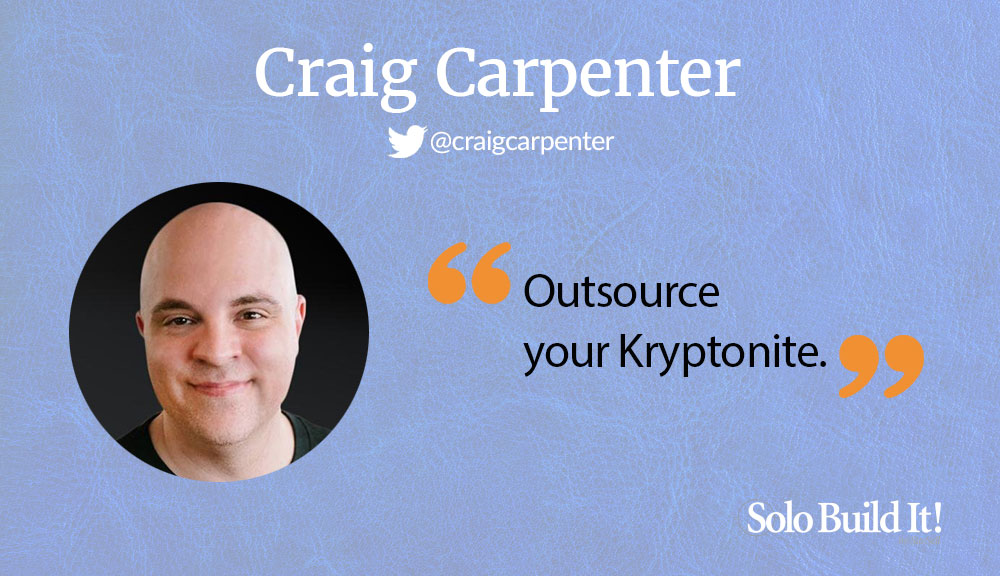
Craig Carpenter
Founder at www.relaythat.com
- Outsource your Kryptonite.
Entrepreneurship and hard work go hand in hand, but doing everything yourself often leads to burnout. Identify anything that saps your energy and motivation or feels like a chore. Divide larger tasks into smaller, more manageable ones and begin building your dream team early. From creating visual content, to cleaning the house, to digital busywork, removing repetitive, tedious tasks from a solopreneur’s life allows us to focus on high yield efforts.
- Connect less and be more.
In theory, connecting with as many people as possible sounds like a good idea at first. You try to follow everyone, comment on everything, collect stacks of business cards from networking events, hit that 5000 Facebook friend limit, and schedule countless meetings. Eventually you’ll spread yourself too thin and this approach won’t correlate with success. Be intentional about whom you share your valuable solopreneur resources with. Go deeper with a core group of peers and those who are a few steps ahead of you instead of trying to be everything to everyone.
- Stay lean and be patient.
Solopreneurs need a long runway for each venture. Be prepared for the journey both financially and emotionally, and find creative ways to accomplish tasks on a tight budget. Every day may feel like you’re up against hundreds of wobbling plates, but focusing on tasks that move you the farthest toward your goals will allow you to celebrate the wins. And don’t forget to celebrate those wins! Embrace the fact that many of those plates are going to break. But don’t let that stop you from testing and developing your ideas. Done is better than perfect. Always favor analytics over assumptions when it comes to your customers. You can always try again if you fail. And don’t ever forget to stay hungry, because that fiery passion will keep you moving forward.
- Give more. Go beyond. Break the rules.
I was asked to give three insights for this post, but to be successful solopreneurs we should always strive to give +1.
Craig’s driven personality and diverse talents in digital media have landed him projects with the most sought-after brands, celebrities, and individuals. Not content to rest on his laurels, Craig considers himself fortunate to have excelled at several disciplines such as a designer, animator, podcaster, startup founder, and photographer.
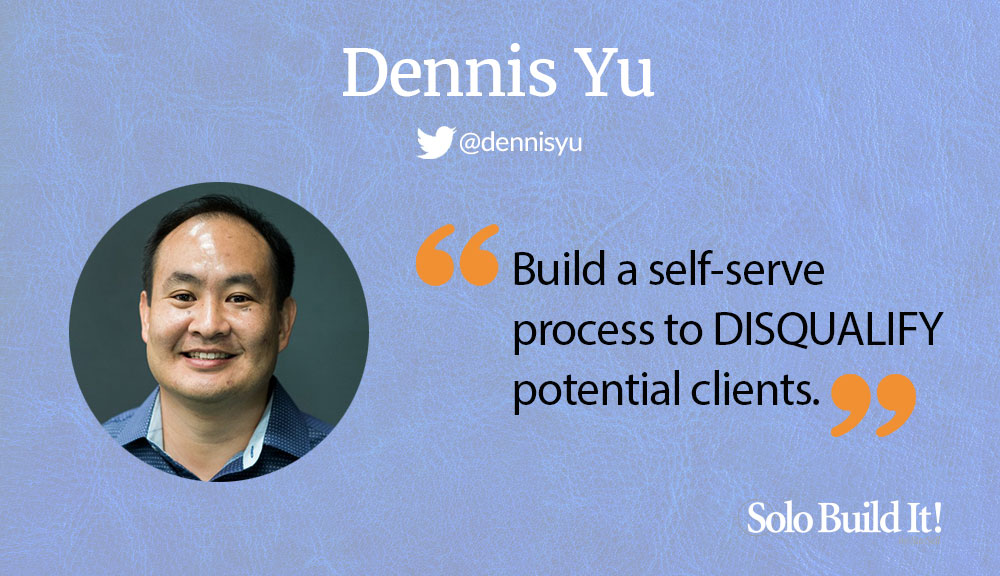
Dennis Yu
Chief Technology Officer at www.blitzmetrics.com
- Build a self-serve process to disqualify potential clients.
In other words, have all new prospects fill out a form listing their goals, budget, content, and whatever else you need. As a solopreneur, you can’t afford to waste time collecting info only to find they’re not qualified or have unrealistic expectations. A simple Google Doc is enough, or have it built into your site.
- Be clear about what you don’t do.
Resist the urge to say you do everything, as it actually reduces your business. Clients will trust you more when you say you specialize in X and don’t do Y.
- Push what you don’t do to your partner network.
That way, they push X to you and you push Y to them. Even though you’re a solopreneur, you still need a partner network for referrals, and virtual assistants to help with organizing.
Dennis Yu is helping create jobs through social lead gen and software.
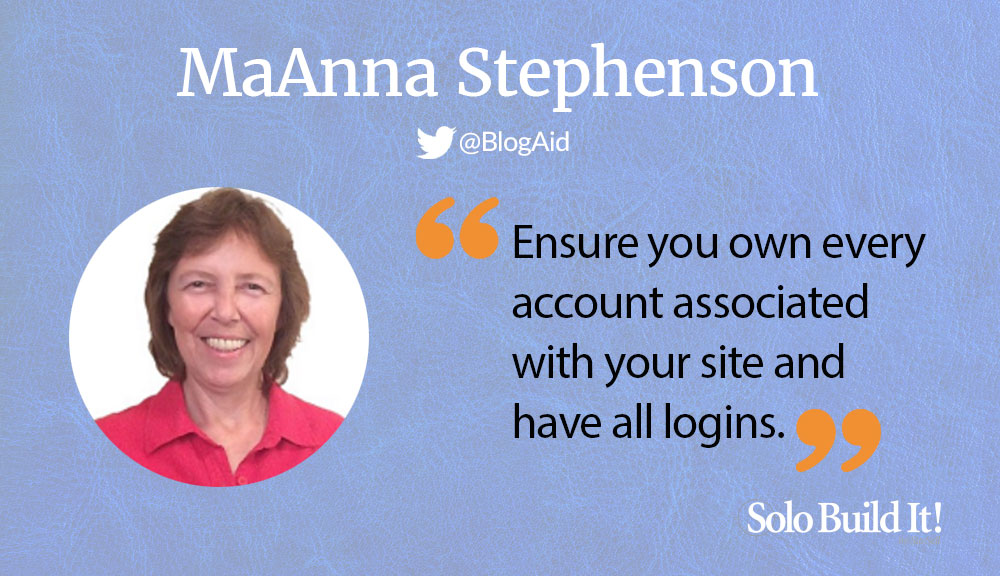
MaAnna Stephenson
Owner at www.blogaid.net
- Ensure you own every account associated with your site and have all logins.
- Ensure your site is secure, performs well, and meets Google’s guidelines, including HTTPS done fully and right.
- If you intend to be a DIY site owner, get educated from a web pro.
Don’t rely on non-techie groups for advice. Or, hire a qualified web pro, not just a designer, to keep your site safe and in proper working condition.
- Ensure you have a rock solid, full site backup plan.
This is your most important safety net for protecting your online investment.
MaAnna Stephenson helps non-geeks with WordPress, SEO, conversion, blogging, site security, and performance.
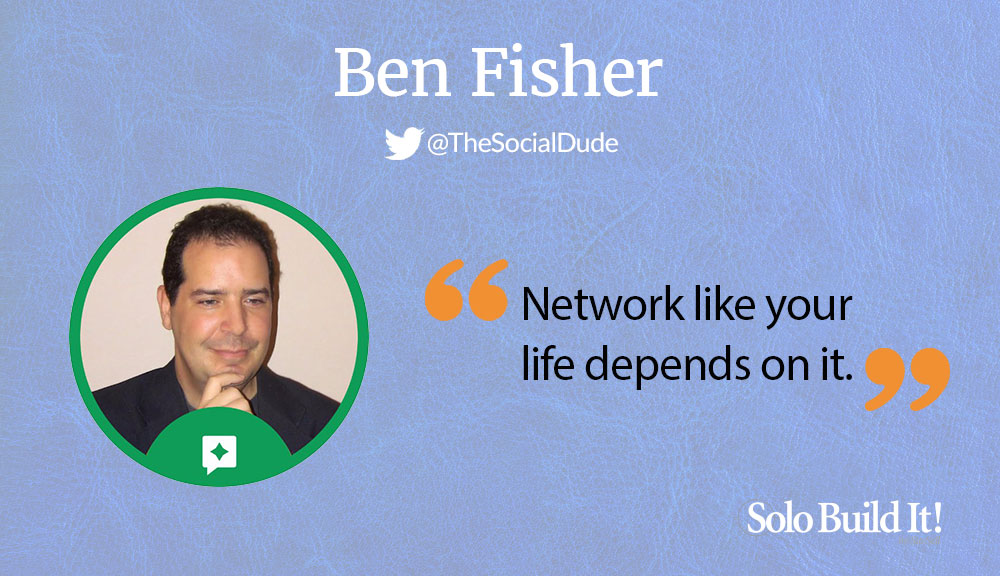
Ben Fisher
Founder at www.steadydemand.com
- Put in the work, or outsource it.
Make a decision: do it yourself or find someone to partner with. As a small to medium business owner you need a lot of things. Accounting, blogging, social media, SEO, people who can execute your service (yes, even your services. Do this early on — it is the only way you can scale).
- Network like your life depends on it.
Network, network, network. I cannot emphasize the importance of this enough. Make a list of people you want to meet. Then make a list of people they know. Approach them one by one. Strive for one a week. Be genuine, approachable and helpful. Be the person that someone will remember. Most important of all, be yourself… real connections come from that, and you never know who you will get introduced to from there.
Pro Tip: Get on someone’s show. That will get you speaking gigs.
- Fail hard and fast. Learn from it.
Try as many things as you can. You will fail. What you do with that is up to you.
In the words of Virgin Airline’s founder Sir Richard Branson: “Screw It, Just Do It!” Try not to get into analysis paralysis: if you have the passion and a customer, do it. Even if you are not the best at it now, you will be.
Ben Fisher is a Google Plus/Google My Business marketing maven, experienced veteran in SEO and social since 1994. Ben is a Top Contributor with GMB and a Co-founder of Steady Demand, which works with agencies and businesses to find engagement and develop content for social media. Ben has a passion for working with businesses, helping them solve the most complex of issues in Internet Marketing and Local Social/SEO. He is a featured author at the Local Search Forum, Co-owner of Local Search Dynamics G+ Community, and always available to help.
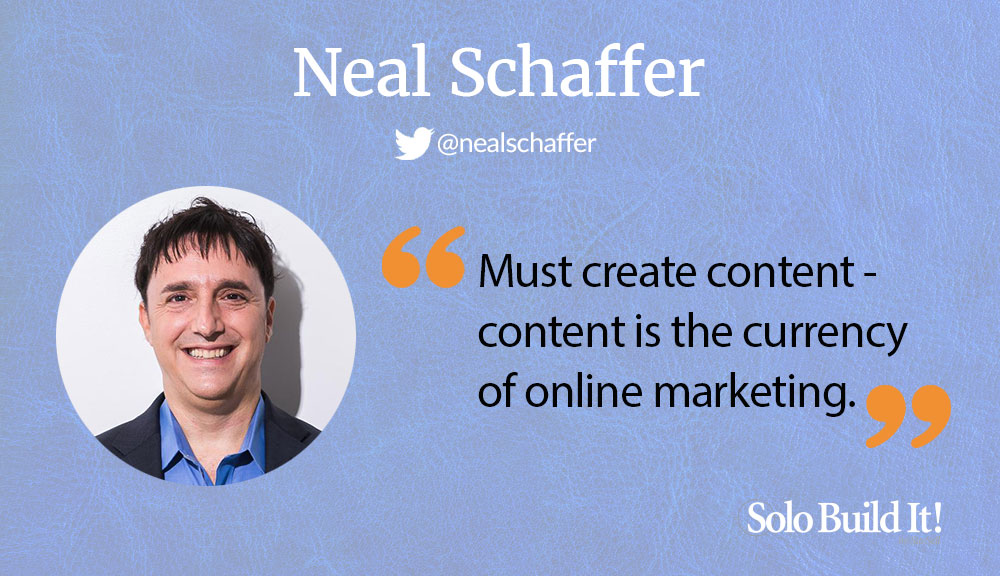
Neal Schaffer
President of www.maximizeyoursocial.com
- Must create content — content is the currency of online marketing.
- Must strategically use Paid Media.
- Must have a lead magnet or way of capturing potential customer/client information to bring them from the top of the funnel farther down.
Neal Schaffer helps businesses generate ROI from social media. Author, global Social Media speaker, Social Media Marketing Influencer, Soccer Dad and Japan Travel Expert.
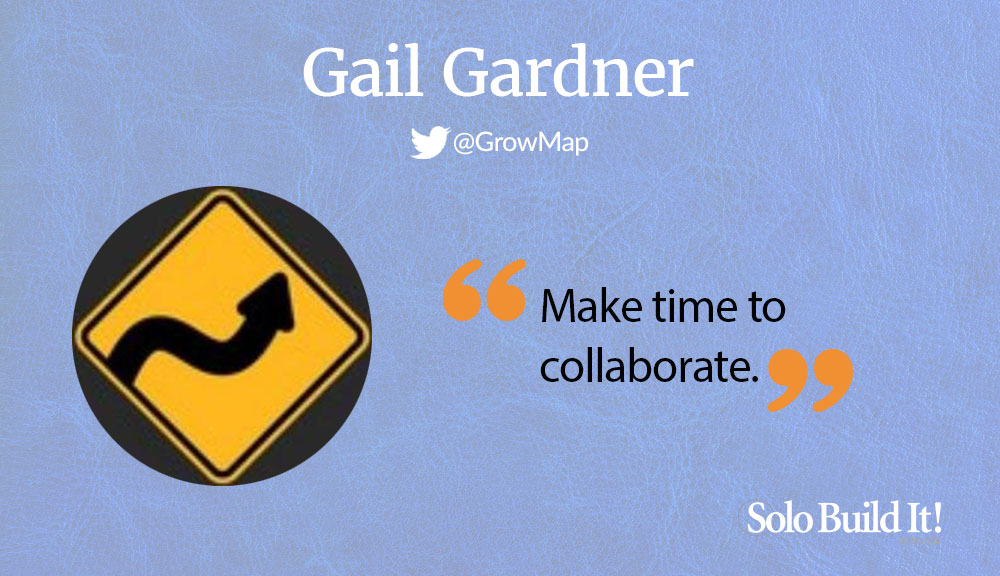
Gail Gardner
Small Business Marketing Strategist at www.growmap.com
- Communicate clearly.
Far too many misunderstandings occur because people do not take the time to document fully what is expected. One of the greatest challenges I face is dragging enough details out of customers and collaborators to make sure what we deliver is exceptional. Remember that others cannot read your mind and don’t know everything you know about your business.
- Develop project management processes.
Successful solopreneurs get that way by having processes in place to quickly see at a glance what their current workload is, what is the highest priority to be working on, and when they need to follow up with each client next. Everyone can use the free version of Trello for this. If your needs grow beyond what Trello can handle, you can add another project management tool. I use both Trello and Wrike Enterprise daily.
- Make time to collaborate.
Instead of keeping your head down, constantly working alone, learn how to do collaborations and then invest time in talking to your collaborators. Yes, it takes time away from working and may temporarily reduce your income that day. But in the long run you will learn skills that increase your income and you will develop relationships with others, especially influencers, who will support your efforts and send you new customers.
Gail spends much of her time mentoring small business owners and freelancers about how to collaborate and create best practices. She is the founder of GrowMap.com, where she provides advice on increasing profitability. GrowMap.com is listed by Cision as a Top 100 Site for Marketers.
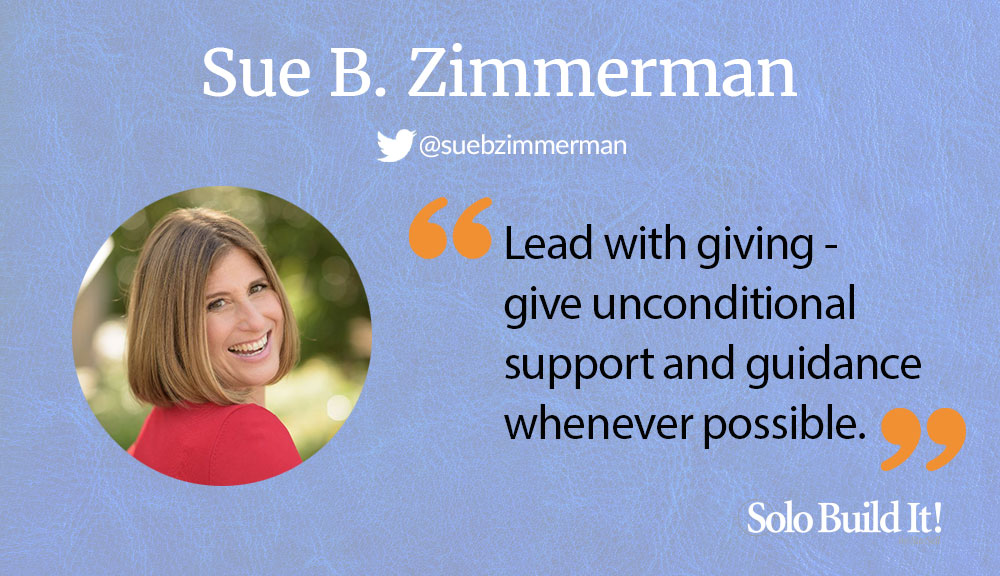
Sue B. Zimmerman
Owner at www.suebzimmerman.com
- Lead with giving — give unconditional support and guidance whenever possible.
- Answer questions on social posts.
- Connect people and be known as a connector and collaborator.
- Self care — honor yourself and your body.
- Get 7-8 hours of sleep.
- Drink water all day to keep hydrated.
- Eat a rainbow — your food is your fuel.
- Move your body every day.
- Hang out with others who lift you higher, inspire you, teach you something new and challenge you.
Sue B. Zimmerman is the #instagramexpert, creator of the online Instagram course “Ready Set Gram.” She’s a popular CreativeLive instructor, powerful speaker on prominent stages like Social Media Marketing World, and is a highly sought-after business coach. She’s passionate about teaching business owners and marketing professionals how to easily leverage the power of Instagram to get tangible business results.
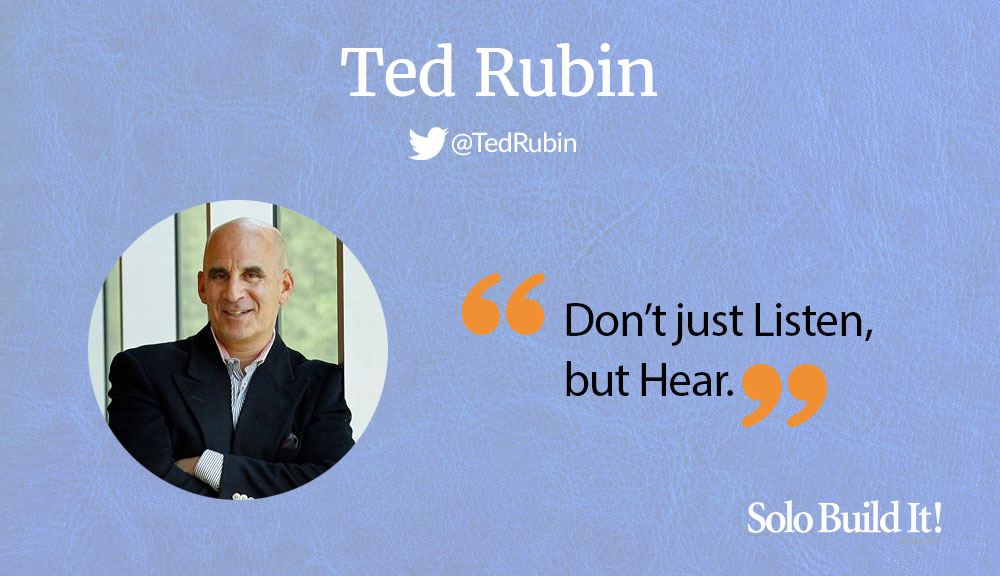
Ted Rubin
Acting CMO, Brand Innovators, and Co-Founder, Prevailing Path, at www.tedrubin.com
- Listen.
If you want to be heard above the growing social media “noise,” you need to first listen to your consumers so when you do speak, you get it right. What are they saying, what are they feeling, what are their pain points, what solutions do they need?
- Don’t just listen, but hear.
Thanks to social media, brands can gather vast amounts of valuable information about consumer preferences. But to build relationships you need to go well beyond data gathering and actually hear, and react to what your consumers are sharing. True listening requires a willingness to place consumers’ opinions above the brand’s own (usually biased) view of itself, and to even make product/service changes based on that feedback.
- Know the people in your audience.
Short and simple: if you are only focused on the money, you risk completely overlooking the people. Don’t make that mistake! If you don’t know who your people are, you might as well toss your marketing money down the drain.
- Make it about them.
First think about and address what matters most to your audience. Give them a platform to show you what they need, want, are interested in, and expect. Whatever matters most to them should become what matters most to you!
- Be consumer oriented, whether that be retail consumers, B to B prospects, or those who consume your personal brand.
We marketers like to think that social media is primarily a set of tools for our marketing purposes. In reality, social media is also a strong set of tools our consumers use to share and influence opinion about our brand. Our consumers now have “the channel of me.” Consumers’ opinions create the “reality” of the brand — if enough consumers say negative things about your brand, your brand loses its credibility, and (thankfully) vice versa.
- Ask “How can I serve you?”
Taking the “me” mentality one step further, when we are advertising instead of building relationships, we are focused on what our consumers can give us instead of how we can best serve them.
- Aim for ongoing engagement.
Your consumers will recognize in a heartbeat if you are simply trying to get something from them — and they will not stick around. It’s not that you aren’t allowed to want anything from your consumers, it’s that there must be a give to go along with every take. If you truly want to make an impact, aim to always put more energy and attention in your “give” column than in your “take” column. It will pay off.
Traditional advertising is going for instant impact and hoping and praying you make an impression: splashy billboards, off-the-wall Super Bowl television ads, eye-catching graphics, even shock factor images of gore, poverty, nudity, animal cruelty, etc. While those methods are effective in catching a consumer’s attention, they fall short of retaining that attention. Building relationships is about starting meaningful dialogue and taking the time to thoughtfully and genuinely engage in ongoing conversation. Relationships focus on getting to know your consumer and giving them reasons to stay engaged — not just getting them to react. This needs to be all the time, not simply campaign- or initiative-based. That is the biggest mistake being made today by marketers and brands in relation to consumers, and especially influencers.
Brands tend to fall short on this one because real engagement takes time, attention, and overall effort, but I can assure you that working in a vacuum is one of the biggest mistakes a brand can make! A one-time tweet, a quick Facebook post, or an email here and there is an announcement, not engagement. Engagement requires a brand to reach out to consumers by asking questions, offering useful content and solutions to relevant issues, providing useful community forums and feedback venues, etc.
- Authenticity will set your brand apart from the rest in today’s highly competitive market.
True authenticity in marketing requires brands to change their public filters. It used to be that a whitewashed image was the way to get consumers’ notice and buy-in (literally). But now, if brands filter out any and all slight imperfections, consumers quickly get wary. If the only product/service reviews you allow the public to hear are about how amazing your product/service is, you quickly lose authenticity points.
- “Less fabrication, more facilitation.”
In other words, don’t waste resources whitewashing your brand. Put your resources instead into giving Advocates the tools to tell their truth about your brand… because that is what consumers trust, and what they trust, they will buy. “Less fabrication, more facilitation” = a boost to your ROR (Return on Relationship).
- In today’s market, real trumps perfect because real is what creates trust.
Give consumers ongoing chances to interact with you and your brand, so they can see that you always tell the truth. Don’t waste your valuable marketing time making things up, because your consumers will sense that you are not telling the truth. Do your products and services all have perfect recommendations, as your brand claims? Maybe — but unlikely. 100% on-time delivery? Maybe — but unlikely.
Of course you don’t need to announce your errors or be proud of performance inconsistencies, but if consumers bring them up publicly, consider not filtering those conversations out of the media. Speak directly to any issues consumers have with your brand, and let your problem-solving conversations be public. These authentic conversations are the ones that build ongoing relationships — the ones that create Brand Advocates.
- Integrate Customer Service with your social presence.
Use social media for instant and ongoing engagement with your customers. Pay attention to them and address their needs early, often and publicly. Make sure your social team and customer service team are on the same page and communicate regularly and easily.
- Focus on the relationship before the sale.
When a brand adopts the marketing philosophy that it is all about relationships, it automatically begins paying more attention to consumer needs and preferences to learn who its consumers really are. Consumers who feel valued by a brand will in turn assign value to that brand by buying the product/service and passing recommendations on to their networks. The sale then becomes a natural part of the ROR instead of a “hard sell” effort.
Relationships are the new currency – honor them, invest in them, and start measuring your ROR!
Ted Rubin is a leading Social Marketing Strategist, Keynote Speaker, Brand Evangelist, Acting CMO of Brand Innovators, and Co-Founder of Prevailing Path. In March 2009 he started using and evangelizing the term ROR, Return on Relationship, hashtag #RonR. Ted left his position as Chief Social Marketing Officer of Collective Bias on August 31, 2013. He remained a principal shareholder until the November 2016 acquisition by Inmar. Return on Relationship, ROR, #RonR, is the basis of his philosophy… It’s All About Relationships! His book, Return on Relationship, was released January 2013. His newest book, How To Look People in the Eye Digitally, was released January 2015.

Ian Anderson Gray
Founder at www.iag.me
- Share and serve.
Sorry to break this to you, but it’s not all about you! If you want to succeed, it’s so important that you focus on helping and serving others. Produce high quality killer content that really helps people. If you consistently do that, you’ll be seen as the expert and the “go to” person for many in your field. Be helpful in responding to people and sharing other people’s content. That’s one way to grow your audience and build meaningful relationships
- Build strong and meaningful relationships.
So, you’ve created all this killer content, you’re helping people and you’re sharing other people’s content. Great! That’s just the start. Build on those relationships you’ve begun to establish. Go out of your way to help people. Respond to newsletters or add a comment to a blog. Arrange a chat with other online influencers and see how you can help them. Aim to add value to people’s lives as much as you can. Go to industry conferences and meet people in real life. That’s often where the magic happens.
- Look after yourself.
There is no question, being a successful solopreneur is hard work. It’s often lonely and frustrating. It can take years of hard work before you see any progress. Many solopreneurs have suffered with anxiety, depression and even health problems. Is that hard work worth it? I’d say so! There are so many blessings that come as a result of pursuing your dreams. But don’t forget about you. While you can “hustle” and work your socks off 72 hours a week, that is not sustainable. Remember why you chose the solopreneur path! Take some time off. Go for walks. Spend time with your family and friends and enjoy them. Laugh. Occasionally do nothing in particular. Be spontaneous. Write down your dreams and what you’re thankful for. Get exercise and eat well. And, since you schedule all your business-related stuff (you do do that, don’t you?) make sure you schedule in your down time too. Finally, don’t compare your success with others. Often what we see in others is only the surface. Make your success your own!
Ian Anderson Gray is speaking at #SMMW17 and the Founder of Seriously Social. Social Media and Productivity Tool Geek. International Speaker, Coach, Consultant. Loves helping people!
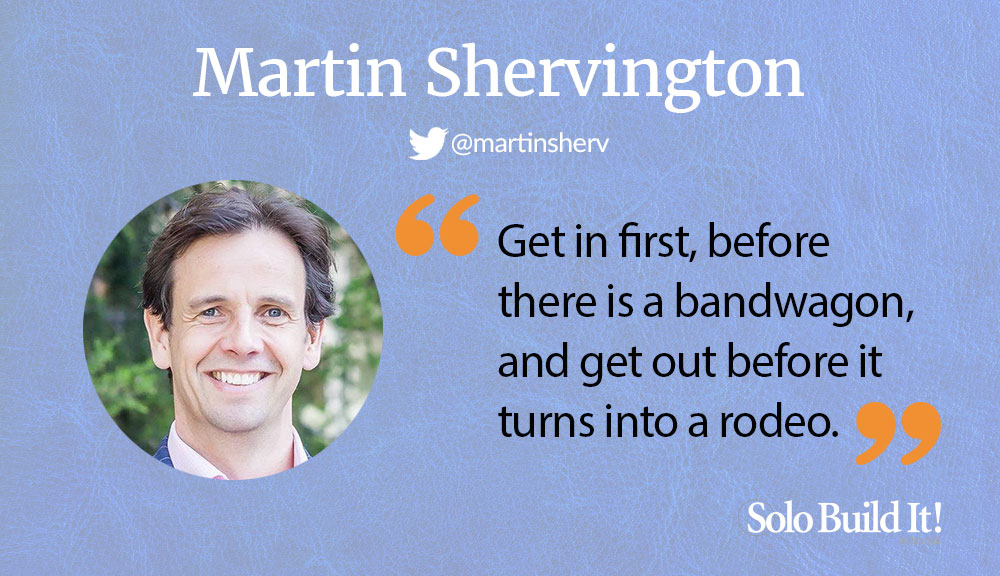
Martin Shervington
Business Consultant at www.plusyourbusiness.com
- Get in first, before there is a bandwagon, and get out before it turns into a rodeo.
- Be like water, no one needs you until they don’t have any of you (h/t Bruce Lee).
- Find your people; “my people” will soon be in virtual reality for many businesses.
Martin Shervington is a Founder, Business Consultant, Speaker, Community Builder and Tech Blogger. Official Google Small Business Advisor, Google Partner, and VR/AR geek.
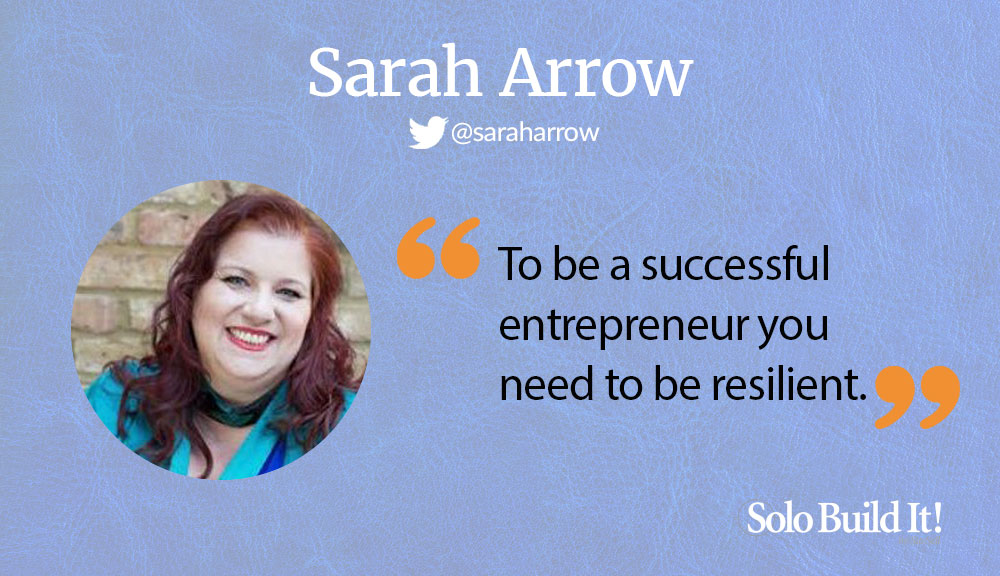
Sarah Arrow
Business Blogging Expert at www.sarkemedia.com
- As an entrepreneur, you must be focused.
You must know what you want and be able to visualise this goal in a heartbeat. You must be able to articulate your focus, so that your loved ones know what you’re doing and why you’re doing it. Too many entrepreneurs rely on the things they don’t own or have the ability to control. They worry about FB ads when they don’t have anything to sell. They worry about their brand, when they have no idea what their business is. They talk about their dreams, but lack the focus to make them a reality. Focus will make or break fledgling entrepreneurs.
- As a solopreneur, you need discipline to keep you focused.
This means doing or outsourcing the things you don’t like or want to do. It means turning off Facebook and working on income-producing activities. It means having a process and then following it. Many entrepreneurs who could make it don’t because they lack discipline. They have no desire to do the work in order to achieve their goals. Discipline and resilience are how you overcome problems, and if you don’t develop these essential traits then you will attract drama from others, rather than the clients you’ve only dreamed of working with.
- Develop your own influence independent of other social media platforms.
This is why I focus on blogging. I’m growing the influence of the platform that I own and creating a business asset. Influence is something that you grow by giving without expectation. It’s the sharing, commenting and supporting of others as you grow your own business, but done in alignment with your goals. In other words, influence grows when you focus your activity in the right places.
- To be a successful entrepreneur you need to be resilient.
Out of all the things mentioned, resilience is the most important because it’s how you have a better quality of life as a human being:
“Resilience is a four-fold quest: physical, mental, emotional and spiritual. Get all four in alignment and you have a deep vat of personal resilience to call on to sustain you in times of challenge.” Jenny Andersson, Resilience Expert.
You should grow these strengths evenly, and actively practice resilience. You know not everything will go your way because you are more self-aware than others who are starting a business. The only aspect you can truly manage is how you respond to a set of circumstances, and this means becoming resilient. At some point in your life, excrement will hit the fan. You can cry about it and then get back up and do something, or you can give up. The less resilient you are, the easier it will be to quit and live a life of regret.
As a successful entrepreneur, you know that you have to build your business so that if 20% of it was wiped out overnight, you’d survive. Great entrepreneurs know that if 100% of their business was lost to them, they could get back up and start again. To do it right once is luck, to do it right again and again is skill. These best practices can and should be learned in order to be a successful entrepreneur.
Sarah Arrow is one of the UK’s leading business bloggers, Forbes listed 3 times.
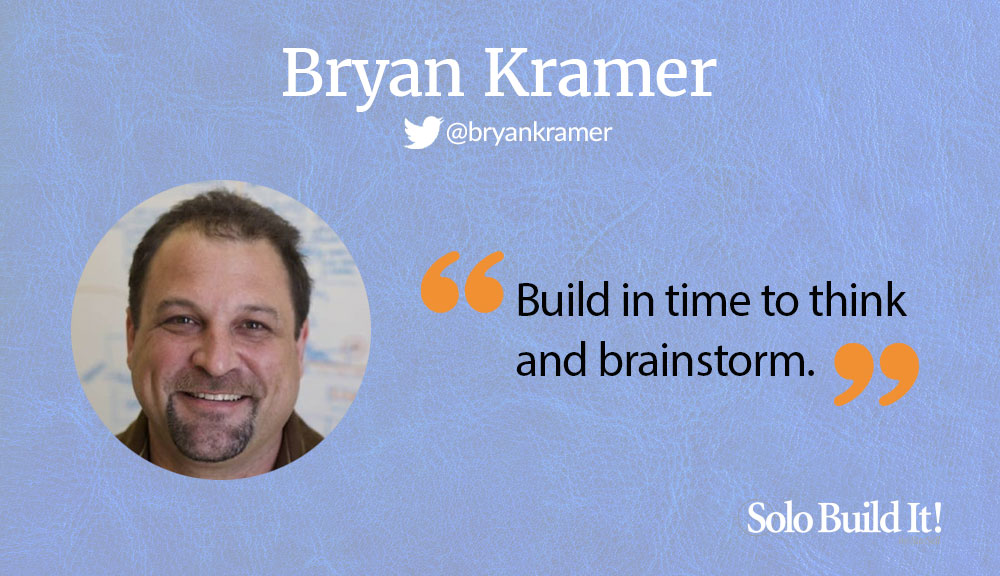
Bryan Kramer
CEO at www.purematter.com
- The first thing any solopreneur needs to do is set up and organize him- or herself.
As things start to come in, everything must have a place or you will find a lot slipping through the cracks.
- Don’t try to be all things to all people. Figure out what you are best at and delegate the rest.
- Build in time to think and brainstorm.
Schedule that time if you have to. If you spend too much time in the business instead of on the business, it won’t grow as quickly.
Bryan Kramer is a TEDTalk and Keynote Speaker, Author of Shareology and Human to Human #H2H, CEO of PureMatter.
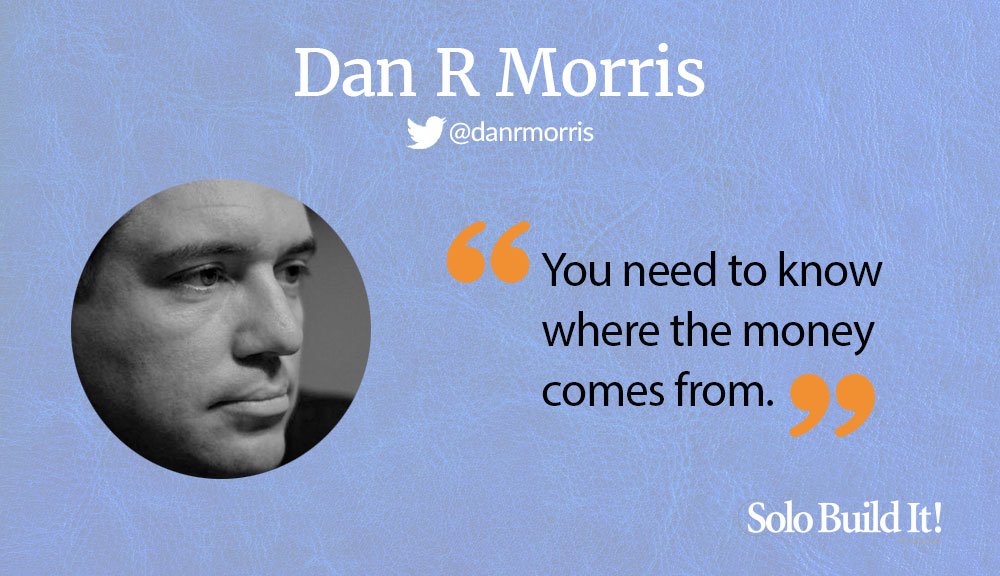
Dan R. Morris
CEO at www.bloggingconcentrated.com
- Point source analytics.
You need to know where the money comes from. What sources? What is the conversion rate of each source and what would it take to increase that revenue? You can’t begin outsourcing comfortably until you know what they or you are going to do to make money while you outsource.
- $ per visitor.
It is critical to understand your revenue per visitor. Through all your efforts are you making more money per person who visits your business than you were last year? The next question is, where is 80% of that revenue coming from?
- Lifetime value.
You must always be measuring the lifetime value of a customer. There are three ways to make more money:
- More customers.
- More sales per customer.
- More money per sale.
The most neglected is #2. When you have amassed a community based on what they like, you have a good idea of what they are going to buy this year. Whether that’s from Target or Zappos or your site, why not be the person making the recommendation and giving the warnings?
Focus on #2.
Dan R. Morris is the Founder of the largest global training and development company for bloggers, vloggers and podcasters, Blogging Concentrated.
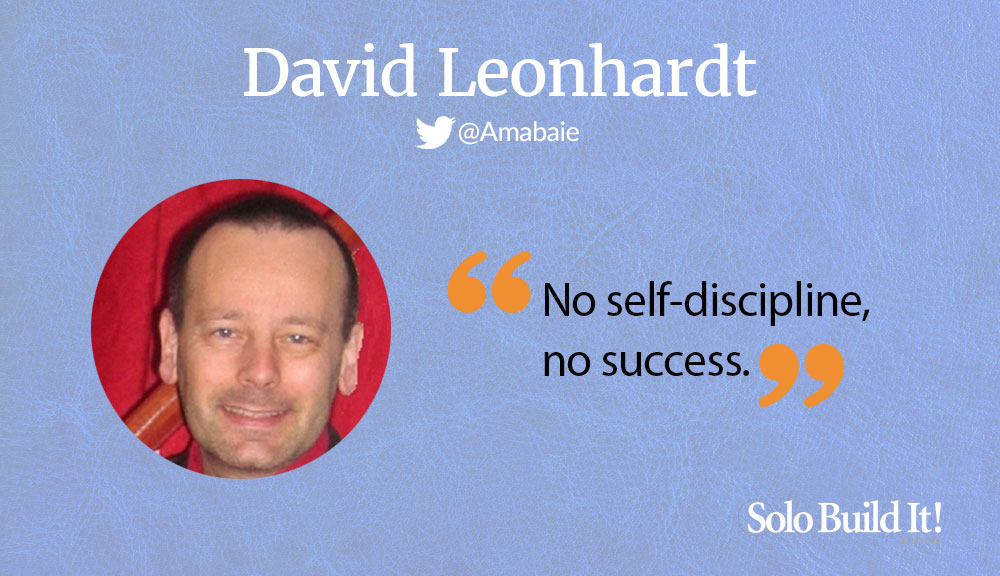
David Leonhardt
Founder at www.THGMwriters.com
We make a huge mistake by telling our kids to seek a career in something they like doing. Choose a career based on your temperament.
I watched a guy who is a semi-successful author drive himself crazy working a desk job for three months. He could not handle following process. He could not handle clients. “I think I’ll go back to working construction. If somebody pissed you off, you can swear at them.”
The three most important “best practices” for a solopreneur are all related to temperament. If you don’t have these, don’t even bother.
- First and most important, you must have self-discipline to work on your own. No self-discipline, no success.
- Second, you must be happy as a hermit, at least to a great extent. If you’re not hermit material, invest in heavy medication.
- Third, you must be able to survive when things go wrong, such as a major downturn in the economy, a search engine penalty or losing a big client. Can’t survive the famine? Then you won’t make it to the feast.
Contrary to what self-professed gurus will say to sell their eBooks and money-making system, being a solopreneur is not for everyone. As with any other career path, it requires the right temperament.
David Leonhardt runs THGM Writing Services. Right now, he is so much a fan of Hamilton the Musical that he wrote a post in Hamilton’s honor, “5 lessons from America’s greatest ghostwriter.”

Ryan Biddulph
Blogger at www.bloggingfromparadise.com
- Follow your fun.
That is the key solopreneur practice because when you follow your fun, building a business you love building, you detach largely from all the money outcomes and business outcomes that trip up most solopreneurs, newbies and veterans included.
I am writing these words from a 5 bedroom mansion in exotic and opulent Doha, Qatar. We are house-sitting here for a month, and some of our neighbors live in literal palaces. Why did it take me 8 years, not 6 months, to create this lifestyle? I gave most of my energies to getting business results and money, versus giving my energies to mainly have fun.
Especially for solopreneurs, who must master the art of energetic leveraging, all the practical tips on earth are useless unless you are having fun when you apply the tips.
- Create.
Build your solopreneur venture on creation. Creating helpful things for people grows your venture swiftly. Customers love creators. Clients love creators. Creators leverage their presence far and wide because they appear to be all over the place, supplying helpful content in the form of eBooks and blog posts and videos and audio books and online courses and various services.
I wrote and self-published 126 eBooks on Amazon. I have 30 plus audio books, paperbacks, 4 online courses and 100 plus blog posts as well as hundreds of videos on Facebook and YouTube. All because I follow tip #1 religiously and because I know that having fun and creating content across multiple channels expands my presence quickly.
It’s almost like each piece of content is an employee within my solopreneur venture. These inanimate forms of energy go out there and draw in readers and customers through various channels.
- Connect. Don’t compete.
Being makes you infinitely powerful. Creating makes you irresistible. Making friends and promoting other solopreneurs makes you both popular and loved.
Intending to go against — i.e., thinking that an idea of competition even exists in the first place, in a world of abundance — makes your solopreneur journey highly difficult because this scarcity-based, fear-based, illusory falsehood moves you down the energetic spectrum. Even if you have success, you will always fear losing it all anyway.
Your solopreneur journey can be a dog-eat-dog struggle or a fun, freeing, loving experience. You choose whether to connect and make friends with other solopreneurs, expanding each other’s presence, or whether you want to go against people.
Ryan Biddulph is seen at @virgin @forbes @foxnews @entrepreneur and @huffingtonpost. He has written 126 eBooks, and retires to a life of island-hopping at Blogging From Paradise.

Michael Q Todd
CEO of www.CrowdifyClub.com
- Virtual assistant delegation and daily management.
- Insanely great daily content creation.
- Network with networkers.
Michael Q Todd is the Founder at Crowdify Club, Author, Editor, and Manager at The 7 Pillars Book.
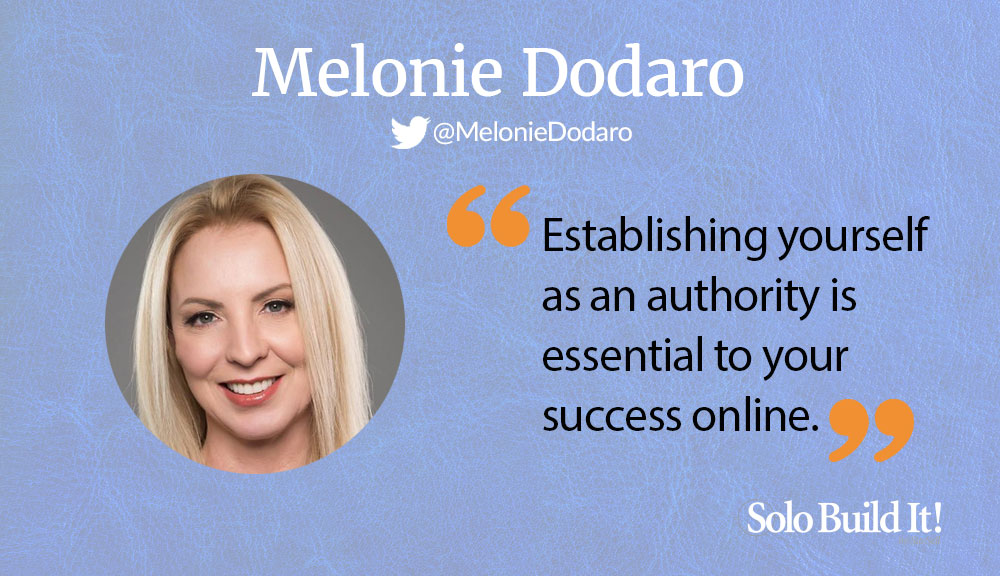
Melonie Dodaro
Author, The LinkedIn Code; CEO at www.topdogsocialmedia.com
Congratulations on venturing into entrepreneurship: becoming a solopreneur is a great first step. If you are doing everything on your own, you are probably already overwhelmed. So I am going to lay out three important best practices that you need to do to succeed online without overwhelming you any further.
- Less is more.
You can’t do everything, so instead focus on 2-3 things you can do consistently and do well. Don’t try to be on every social network. Choose a couple that are a good fit for your target market and do them well.
- Create content.
Establishing yourself as an authority is essential to your success online. But the key here is to focus on what you are good at. For example, if you are not a great writer then look at creating video content, doing livestreams or having your own podcast. You can take any of that content and repurpose it into many different formats.
- Hire a virtual assistant as soon as you can.
You can’t do it all alone for long. Obviously your first goal is to get enough revenue to hire some help, but as soon as you do, be sure to invest it. It could be having someone help you for as little as 5 hours a week or 10 hours a month. But eventually you need to outsource some of the tasks that are taking up too much of your time. Then you can focus on what you do best and have someone else do the rest!
Melonie Dodaro is the author of the #1 international bestseller The LinkedIn Code. She is also the founder of Top Dog Social Media, a digital marketing agency that helps businesses, sales teams and professionals leverage social media and online marketing to build engaged communities and increase leads, prospects and clients.
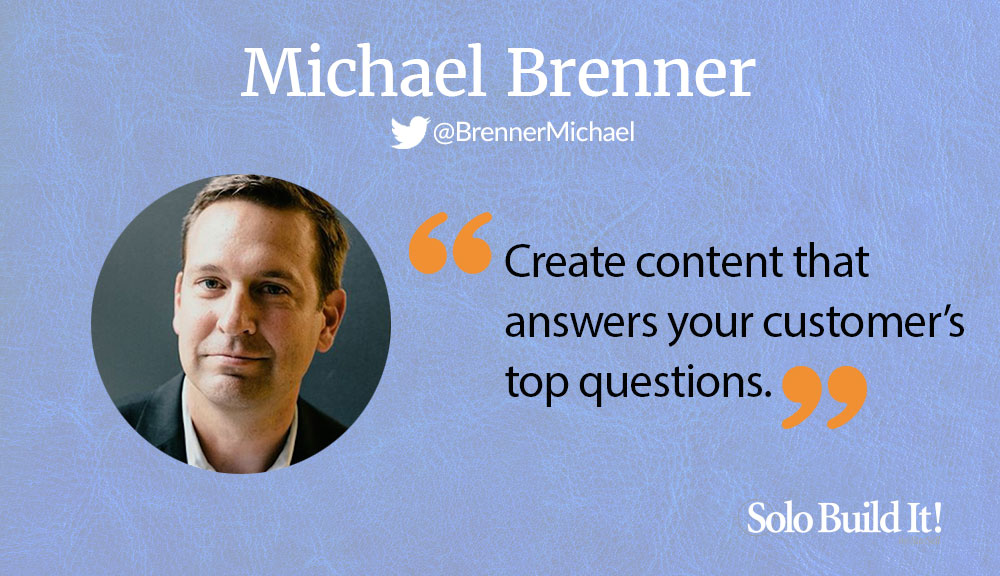
Michael Brenner
CEO at www.marketinginsidergroup.com
- Engage with your audience and seek to help them, without any thought of what you will receive in return.
- Share the best content from others.
- Create content that answers your customer’s top questions.
Michael Brenner is a globally recognized keynote speaker, author of The Content Formula, and CEO. He teaches leaders to focus on the work that matters to them, their team, and the world.

Jacob Warwick
Director of Communications at www.skedulo.com
- Build quality business relationships with your authentic, genuine mannerisms.
Concentrate on developing your support system throughout your industry. Don’t just focus on the top industry names. Work with up-and-comers and passionate professionals alike to build a more comprehensive understanding of the way your industry is truly comprised.
- Attract and communicate closely with mentors or professionals whom you idolize.
What may seem unattainable at first can become more reasonable as you learn more about the paths your mentors took to find success.
- Pay close attention to how your name is used online.
Concentrate on professionally managing your personal brand. Create a strong presence for yourself on social media, particularly in the social communities where you can be active naturally.
- Speak at and collaborate with others on as many industry-related conferences or online events as feasible — even if the audience is massive.
Small events and side projects can help you learn from your mistakes sooner — and deliver a better result once you reach the primetime audiences. This includes local meetup groups or Chamber of Commerce events. Consider dedicating 20% of your time to giving back to your community. Speak at colleges, host events, and give more value than you take.
- Prioritize your ability to communicate clearly through writing and phone conversations.
Write a detailed blog about a topic that you want to learn more about at least once a month. This helps you gain industry knowledge, narrow your ideas, develop thought leadership, and bolster your content profile. Additionally, schedule 2-3 discovery conversations or coffee meetups every week.
Jacob Warwick is the Director of Communications at Skedulo and Founder of ThinkWarwick Communications.
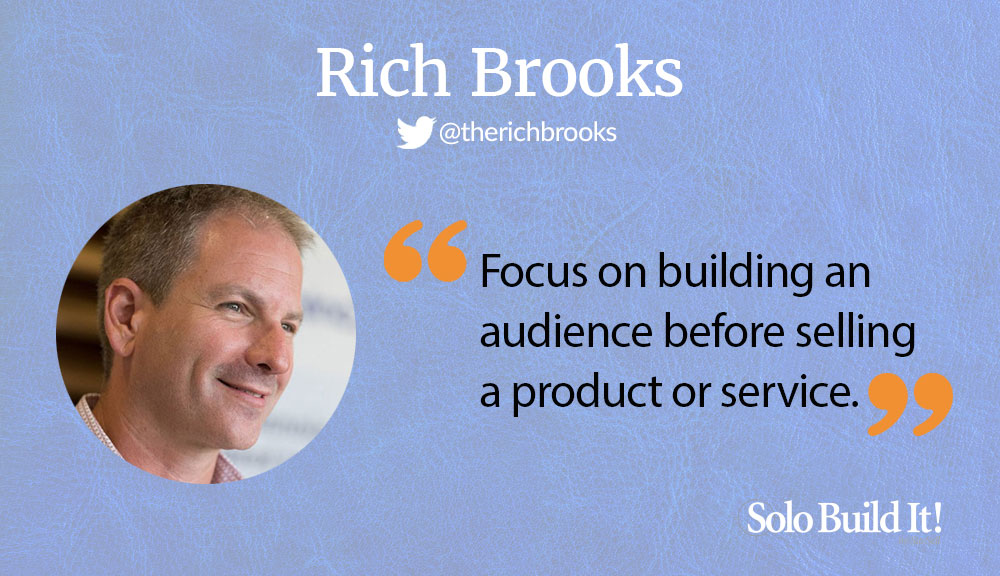
Rich Brooks
President at www.takeflyte.com
- Have a mobile-friendly website.
I don’t care how many followers you have on Twitter, how many friends on Facebook, or how well LinkedIn you are. You need a space on the web that you own and control, to which you can send people so that you can build a relationship.
- Focus on building an audience before selling a product or service.
You can’t sell if you don’t have customers. Put audience-building and providing value first before you try to sell to anyone.
- Build your list.
This is different than just building an audience. However, as Bryan Eisenberg said, social media is for reach, email is for revenue. You cannot grow a successful business online without a strong and growing email list.
Rich Brooks is founder and president of flyte new media, a digital agency in Portland, Maine. He is a nationally recognized speaker on entrepreneurship, digital marketing, and social media. He founded The Agents of Change, an annual conference and weekly podcast that focuses on search, social and mobile marketing. Rich is the author of The Lead Machine: The Small Business Guide to Digital Marketing, a popular and well-received book that helps entrepreneurs and marketers reach more of their ideal customers online.

Lukasz Zelezny
Head of Organic Acquisition at www.uSwitch.com
- Networking
Alone you may find it very difficult to achieve success. The more people you know, the more contacts you have, the more chance you will receive more enquiries and business. Here in London that is very important. Personal referrals seems to work the best. So attend meetups, hangouts, nights-out, and try to actively participate in meeting new people. I recommend you start research about where to go on MeetUp.com, Eventbrite.com and TableCrowd.com
- Online networking.
You must keep your visibility not only offline but also online. Twitter and LinkedIn should be your primary choice. Facebook would be amazing if you are okay spending a few coins on paid advertising. If you do this cleverly, you can “re-reach” those people you met offline at networking events.
- Be an expert.
You can’t expect to become a successful solopreneur just because you have visibility. Become an expert in SEO, social media, PPC (pay per click), or, more broadly, online strategy for businesses. And position yourself as an expert. Clients will start working with you only if they believe you have the know-how they need.
Lukasz Zelezny is a Keynote Speaker, Head of Organic Acquisition @uSwitchUK, Author. He helps people to increase organic traffic, conversion rates and return on investment. #SEO PPC and Social Media. More: https://zelezny.uk
You’ll find a great overview of how best to approach networks here, and Solo Build It! members have access to more detailed guidance.
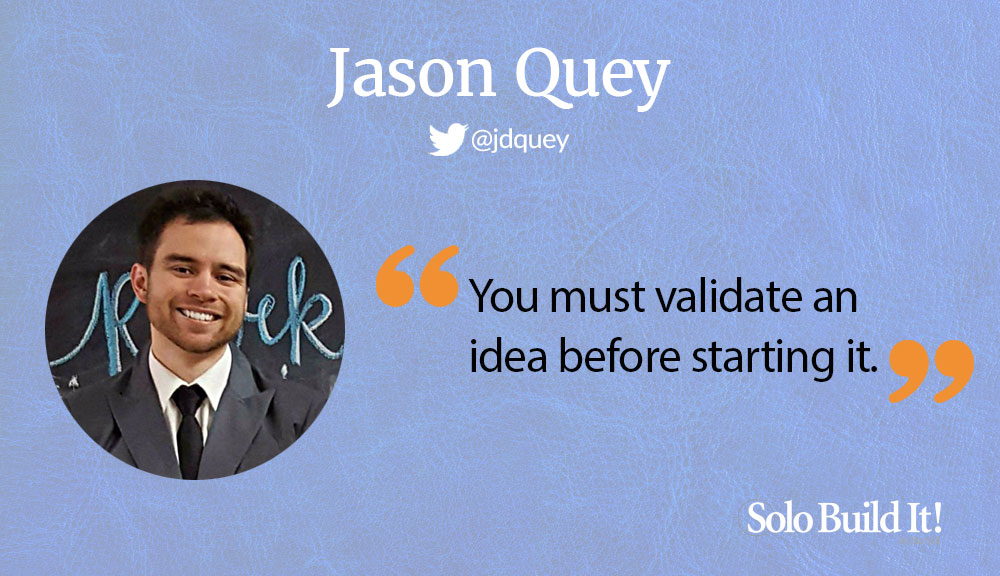
Jason Quey
Influencer Marketer at www.TheStorytellerMarketer.com
- Will your product or service actually generate money?
You must validate an idea before starting it.
- Have you reached product/market fit?
Start here, before you transition to growth.
- Are you focusing on the 80/20 of growth?
It’s easy to get caught up in low value activities. Instead, focus on what will get you results.
Jason Quey is the founder of Cofounders With Class. He helps business owners connect with influencers so they can rapidly grow the business together.

Warren Whitlock
Director, Startup Grind Las Vegas at www.warrenwhitlock.com
Choosing to go solo lets you design your lifestyle around what you want.
You are taking responsibility for the choices you make, though there are always other people around you (personal and professional). Family, friends, contractors, suppliers and customers will demand things from you, but you have the responsibility and the power to control your life.
- What is your real goal?
This has to be more than “make money” if you want to be fulfilled. Look beyond sustaining yourself and your family. Imagine what you would do with unlimited time and money, beyond the selfish (you can have anything you want). Pick your mission and put your heart into it.
- Connect with people.
You aren’t in this alone. You can connect with anyone within a few degrees of separation. The paradigm of business has changed. Instead of just pushing our products and services to a market, we can focus on relationships that will add value over decades. There are literally millions of people who want to see you do well. Get to know people and expand your network.
- Be ready to sell.
If you serve the market, engage with others, help others, you will find people who want what you offer everywhere. Get comfortable with serendipity. When you connect and listen, opportunities will present themselves and people will ask for your professional help.
I see entrepreneurs as the people who have learned that the world progresses when we listen to needs and fulfill the desires of others. We don’t expect others to take care of us. We do well when we find out what people want and see that they get it.
Warren Whitlock is an influencer in health, business, tech, blockchain, solar and social media marketing.
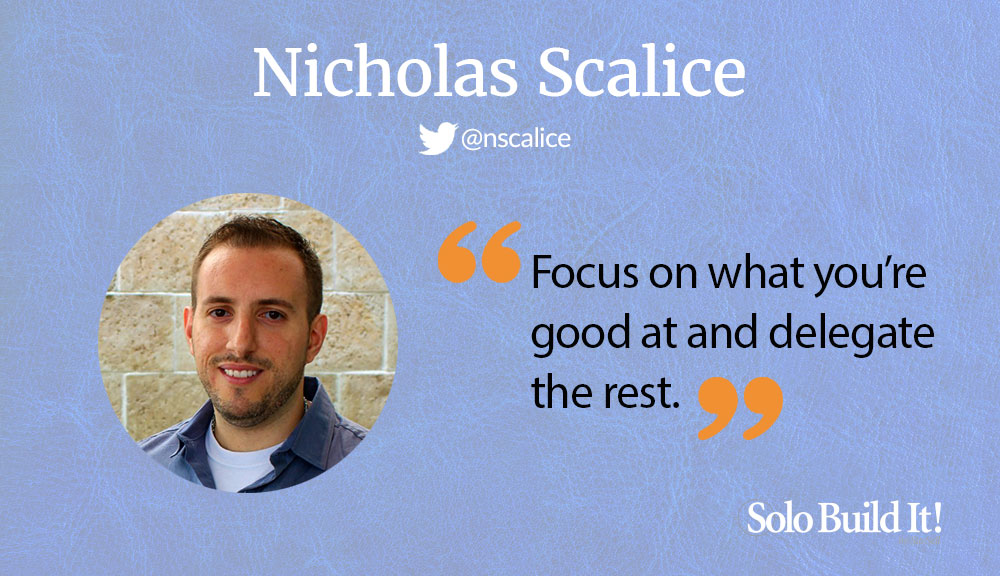
Nicholas Scalice
Growth Marketing Consultant at www.earnworthy.com
- Make sure to network with other business professionals on a regular basis.
By building a larger network (via LinkedIn, Facebook Groups, Twitter, offline networking events, etc.) you can not only generate more leads, you can increase your influence as well.
- Focus on what you’re good at and delegate the rest.
You can’t do it all. This doesn’t mean you have to hire someone full-time. Try working with other freelancers or virtual assistants so that you can do what you’re best at.
- Keep learning.
As a solopreneur, you can often feel like you’re bogged down in the weeds with client work and never have time to improve your skills and grow your business. That’s a dangerous road to go down. Make time for yourself so that you’re continually getting better at what you do, outside of your client projects.
Nicholas Scalice shows you how to get more traffic, leads, sales, and referrals using growth marketing tools, tactics, and strategies that actually work.
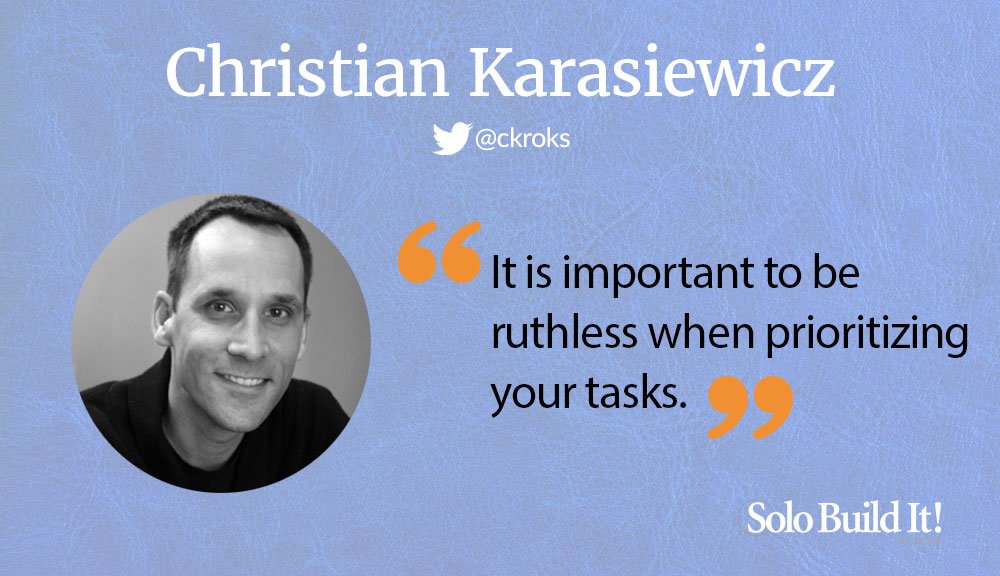
Christian Karasiewicz
Founder at www.socialchefs.com
The three most important things a solopreneur needs to do in order to be successful online are as follows:
- Prioritize what is important.
Since you are running your business by yourself, it is important to be ruthless when prioritizing your tasks. For example, while you may want to set up your own website, if that isn’t your strong suit, it’s worth hiring someone to do it for you. This lets you then focus on growing other important areas of your business where you can have the biggest impact.
- Seek out help.
You can’t do it all. Most of us think we can, though. Whether it’s writing sales copy or setting up a tool, when you get stuck on something, take a step back and don’t be afraid to reach out for help. There are a lot of people who have been through similar situations. Most are very eager to offer assistance. You just have to ask them.
- Be active online.
You can’t expect people to find you on Google and spend time combing through your website to see that you’re the right person to help them.
Some places you should try to be active on are in blog post comments (not just your own), social media channels, Facebook Groups, Twitter chats and more.
If you are active on these channels and provide value with each response that you give, over time, people will see that. This will help lead them back to your website to get in touch with you.
While there are many other things you can do as a solopreneur to be successful online, these three should give you a solid foundation as your build your business.
Christian Karasiewicz is a social media and Facebook marketing professional, Founder of Social Chefs, Apple fanatic and tennis player.

Jonathan Aufray
Co-Founder and CEO at www.growth-hackers.net
Being a solopreneur is different from a regular entrepreneur or when you have colleagues or co-founders. The hardest thing for a solopreneur is to stay motivated as well as being productive. Here are the 4 most important practices that a solopreneur must do to succeed online:
- Automation.
As a solopreneur, you need to work on automating your tasks. All tasks that are repetitive need to be automated. You need to find automation tools to help you.
- Celebrating small wins is even more important as a solopreneur than an entrepreneur.
Every small success you may have needs to be celebrated: you launched your website, you got your first customer, you got a great lead, you received an email from an influencer, etc… It’s crucial to celebrate these wins to give you even more motivation to continue.
- A solopreneur needs to have a schedule and stick to it.
As a solopreneur, it’s very easy to get distracted and start procrastinating. By having a schedule, you will become more productive and know when to work.
- Don’t stick to solopreneurship.
Being a solopreneur is great and you will learn so much, but if you are successful, at some point you will not be able to stay a solopreneur. A successful solopreneur will need to scale. You will need to build partnerships, hire freelancers, get help from fellow entrepreneurs, maybe find an associate, etc…
Jonathan Aufray is the CEO at Growth Hackers. They help startups and SMBs grow by implementing growth hacking and inbound marketing strategies. He has always loved traveling, meeting new people and discovering new cultures. Jonathan has lived in 7 countries and helped companies from 50+ countries grow.

Dre Beltrami
Brand Strategist at www.thebrandedsolopreneur.com
There is so much to learn to build a solopreneur empire, but there are three things to focus your mastery on.
- Finding your brand voice.
Finding your brand voice is the difference between ordinary and original. Finding and using your brand voice is how you can set yourself apart and infuse your personality into your sales pages, emails, blog posts, live streaming, social communications and everything else you write and say. Knowing who you are and unapologetically infusing that into your copy will help you qualify your leads and find your tribe sweetspot. The fact is, creating content is a huge part of online success. Find your voice and use it proudly across all of your communications so you can reap the rewards of authenticity and individuality.
- Video.
Speaking of finding your tribe sweet spot, there’s no better way to put that process on hyperdrive than getting your mug on camera. I know, it’s scary, no one likes seeing themselves on camera or hearing their voice recorded, but it’s a necessary “evil.” There’s no better way to dazzle peeps with your personality and expertise than being able to see you, whether that comes in the form of live webinars, live streaming, or pre-recorded videos. Slink out of the blanket fort, flip on the camera, and watch your brand’s exposure and social reach explode.
- Email Marketing.
I hate cliches but “the money is in your list” is annoyingly true. Email marketing is the best way to court your leads into customers and stay relevant to your peeps, because it gives you access to their coveted personal space (inbox)… where the magic happens. You can’t count on people to come back and regularly visit your website, so having the ability to take them through your content and present your offers the way you want them to see it is priceless. And the automation tech is scary easy these days, so you can send emails while you sleep (or drink it up at happy hour), which will lengthen the chain you have to your desk… by miles. Make sure building your list is a primary part of your brand-building strategy.
Dre Beltrami is a Brand Strategist and Happy Hour Aficionado: she helps solopreneurs build strong brands so they can stop winging it!

Reginald Chan
Freelance Writer and Blogger at www.ReginaldChan.net
I believe the best way is to understand what the market demand is and provide a solution to your potential customers. You can easily become a successful solopreneur when you are able to target a specific audience at any given time.
- Reading the market trends (supply and demand).
- Flexible (to change based on needs).
- Confidence that can shake even the toughest mountain peak in the world.
Reginald Chan is a writer and business consultant, residing in Asia. He has worked with multiple local and international brands since 2005. He focuses a lot of his time now helping startups and entrepreneurs to achieve their goals.
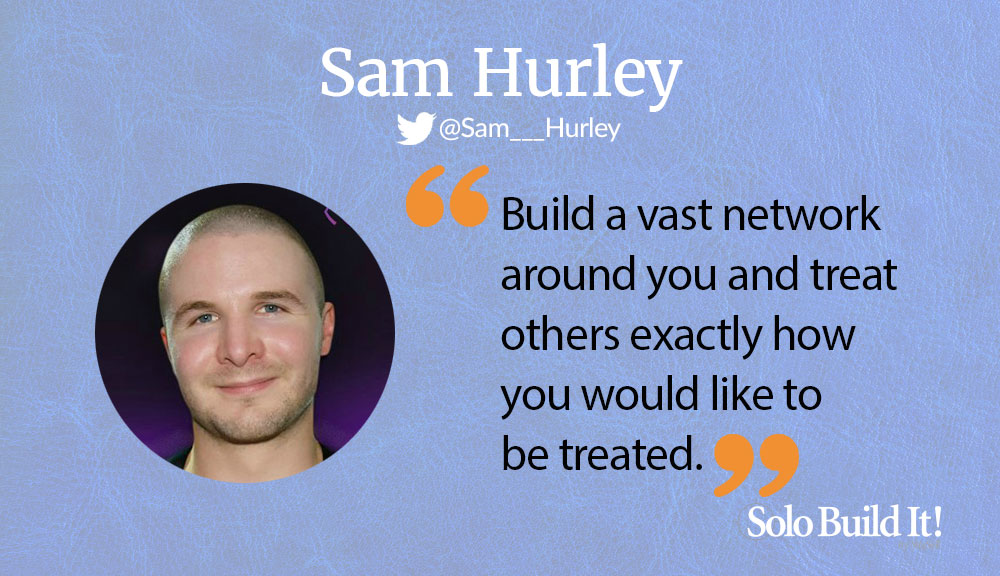
Sam Hurley
Founder at www.optim-eyez.co.uk
Whittling this down to what I consider to be the big 3:
- Know who you are.
If you don’t know yourself, nobody else is going to know about you, either!
Carve your own unique path and personal brand. Learn from others, but be 100% original.
Understand how you want to be known, and make yourself known.
Highlighting your purpose also defines your business model and revenue objectives, instead of simply taking each day as it comes. Failure to plan is planning to fail.
- Be dedicated.
If you’re looking for an easy ride, don’t become a solopreneur!
This game takes extreme amounts of energy, focus and ambition… to the point where you may regularly feel like you’re going insane.
Without loyalty to the cause, you won’t have the patience or commitment to carry on through the hard times. And there will be plenty!
- Build relationships.
Just because you’re a solopreneur doesn’t mean you have to be isolated…
Build a vast network around you and treat others exactly how you would like to be treated. Social media is no less than essential!
The result, after time? Inbound business frequently heading your way and countless opportunities you would once only have dreamt.
Sam Hurley is a People Connector, Social Influencer, Entrepreneur and Believer in Kindness.

Tim Hughes
Co-Founder at www.social-experts.net
To succeed online, solopreneurs need to stick with three things.
- Focus. What are you going to be famous for?
- Be open to the market forces.
People may come up to you with “good ideas” that may be better or add to your focus.
- Look after your cash flow.
If you look after your cash, your cash will look after you.
Tim Hughes is the Co-Founder of Digital Leadership Associates, a world-leading team of social media practitioners who can help you achieve business goals through social media. Tim is also the author of the best selling book Social Selling — Techniques to Influence Buyers and Changemakers, available on Amazon.

Amy Schmittauer
The Vlog Boss at www.vloglikeaboss.com
- Focus.
So many people try to do everything and be everywhere instead of focusing their energy and resources in one place at a time. It’s not totally realistic to do that in a lot of cases, but that lack of focus causes things to take much longer to get done and much less efficiently.
- Connect people.
When you leverage whom you know by introducing them to others you know, you truly become a successful connector. I try to make e-introductions between two people at least a couple times per week. No reason to hide the cool people I know from everyone else. If people meet and end up working together on something amazing, I can be remembered as the person who helped make it happen. That’s an advantage today when everyone is sharing content and not actually engaging in real relationships.
- Pick your platform.
It’s not enough to post videos and blog posts anymore. You must stand for something. That’s how you stand out today in an otherwise very noisy world. Creativity and expertise are important, but picking a lane and letting it be known throughout your authentic storytelling is a major differentiator.
Amy Schmittauer is the Boss at Vlog Boss Studios. As a new media triple threat —YouTuber, Keynote Speaker and Author— she coaches people to go after what they want in life and leverage online video to make it happen. Creator of the popular YouTube series Savvy Sexy Social, her channel boasts a global community and millions of views. Now, in her first book Vlog Like a Boss: How to Kill It Online with Video Blogging, she shares her collection of strategies and tactics to help you create video that gets the attention you deserve.
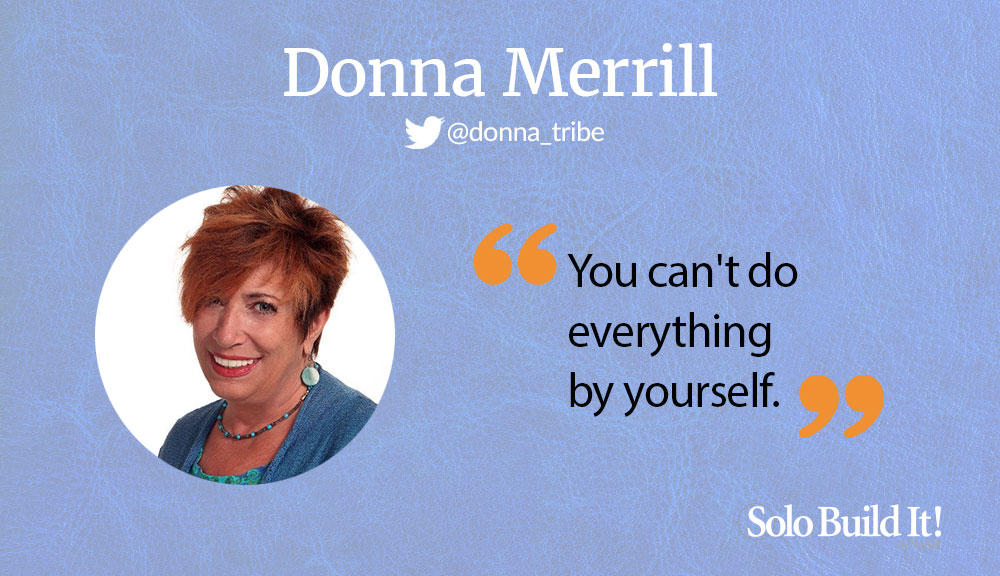
Donna Merrill
Pro Blogger at www.donnamerrilltribe.com
- Develop systems.
Like it or not, you have a finite amount of time and energy to expend toward building your business.
As a solopreneur, you must be very economical in your efforts.
In other words, you need to put key systems in place that will help you do exactly that.
If, for instance, you need to create a steady stream of content, then you need to develop an editorial calendar.
That will systematize what you create… how, why and when.
Without systems in place, you will find that you are doing a lot of things, but with no apparent rhyme or reason.
It’s just a matter of time before the wheels come off.
- Implement key strategies to leverage each system.
Adhering to a system requires that you do it effectively as well as efficiently.
That means you need to implement very clear and specific strategies to meet your objectives.
If you have implemented a strategy for some time, and you are not getting the results you need, stop implementing it.
Move on to alternative strategies until you find the ones that are giving you the returns you need.
Those are the keepers.
They become part of your business model.
As a rule, I implement something like a specific opt-in campaign, let’s say… for 60 to 90 days.
If it hasn’t proven effective by then, I’ll move on to something else.
But I don’t pull the plug after 2 weeks or 30 days, either.
That’s just not enough time to assess the long-range effectiveness of any given strategy.
- You can’t do everything by yourself.
To the extent that “solopreneur” means “do everything yourself,” it is really a failed way to do business.
Any solopreneur will vastly improve his/her results by teaming up with people who can help get more results with less direct effort.
You need to take control of your business.
That means, find the right people to work and joint-venture with, and then collaborate closely and in earnest with them.
In fact, the first person you should be collaborating with is a coach or consultant.
No matter how accomplished and hardworking you are, you need somebody to give you direction, accountability and big picture “helicopter vision.”
Even CEOs and presidents of large companies rely heavily on close collaboration with a coach (they might call it a consultant or advisor, but yada yada yada, it’s all the same).
Solopreneurs are well advised to do the same thing right from the start, and onward, for as long as they seek to elevate their game.
Donna Merrill is a pro blogger at Donna Merrill Tribe. She blogs about blogging and building an online business. She has authored numerous digital information courses and trainings, is the founder of a blogging membership site, and does private coaching with bloggers and internet marketers.
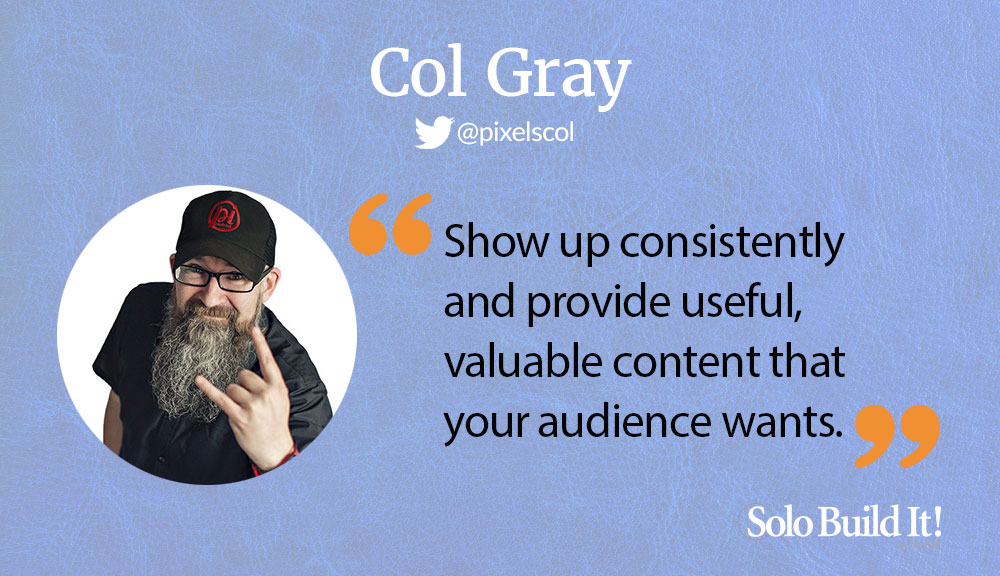
Col Gray
Brand Designer at www.pixelsink.com
- Show up consistently and provide useful, valuable content that your audience wants.
Make sure you research thoroughly what it is that your customers have questions about and answer them. You can end up wasting a lot of valuable time creating content that you think is being helpful, but in actuality, isn’t.
- Find a group of like-minded entrepreneurs who can hold you accountable to producing consistent content.
When times get tough it can be very easy to take your foot off the gas. Content creation can be the first thing that is sacrificed when time and money get short, but it should be one of the last things to be left out of your weekly schedule. As far as the online space goes, if you don’t have content, then you are invisible.
Having an accountability group also gives you a great sounding board to test out thoughts and ideas for any new content that you do come up with that you want to share online.
- To get noticed online your personality needs to shine through, so be yourself and try not to copy anyone else.
If you pretend to be something you’re not, then you will struggle later on as you have to keep up that false persona.
You are on a journey to nothing if you falsely shape your personality to please everyone. It is completely okay if someone doesn’t like your personality, because at the same time you will connect more strongly with those who do get you. These are the people who will become advocates of your brand and help share your content and message.
Col Gray is helping people and businesses to rock their brand through design, workshops, speaking and consultation.

Tom Gorski
CEO and Founder at www.saasgenius.com
- Know what you want from your business.
Not every business necessarily lends itself to solopreneurship. Before you make the decision to either hire a team or stick to a solo operation, you need to know what’s going to be best for you. If you want to grow into a huge operation, scaling is probably the way to go. But if you’re happier with the freedom of running a business by yourself, there’s no need to mess with a good thing.
- Positioning defines your business.
Positioning sets the course for what a business should do to market its product or service to customers. For service providers, such as consultants, writers, photographers, graphic designers and others, positioning is all about defining your niche or area of specialization.
- Strategize for more effective branding.
With your functional value and trust factors firmly in place, it’s time to hone your brand strategy. Begin branding your business by acknowledging what’s nearest and dearest to your heart: your core values and passions. Add your personality, strengths and image until you arrive at your brand promise, which is what customers or clients expect to get whenever they interact with your business (you).
Tom Gorski is an Inbound Marketing and SaaS Growth Hacker. He is Founder and CEO of SaasGenius and InboundWay.
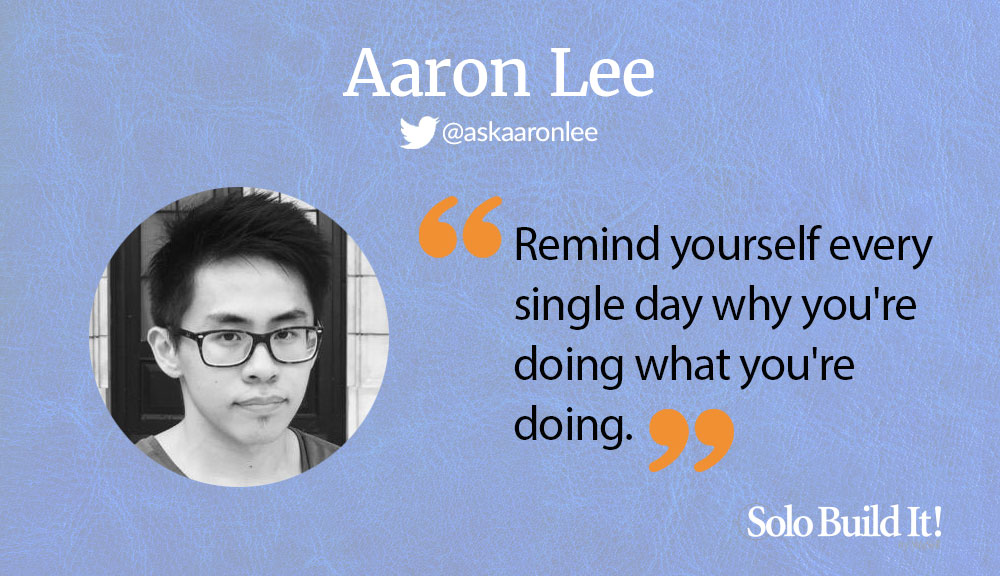
Aaron Lee
Founder at www.Shortofheight.com
In order to succeed as a solopreneur:
- Stay hungry.
Remind yourself every single day why you’re doing what you’re doing. I remind myself that the reason I started my blog is because I want to help other people like me who are confused. Each day I read emails from people thanking me, and it fuels a fire in me to help even more people. Stay hungry.
- Be authentic.
You can’t fake it. In order to succeed online, it has to be authentic and something you love doing. If you hate writing or even hate being in a niche, it’s going to come across. Your readers will know. Find something you love doing or love talking about. That’s how you’ll succeed.
- Be patient.
You’ll need to be patient. Just because it will feel like you’ve worked super hard and have received nothing in return, it doesn’t mean that you should give up. Relax, look and see what’s working, what’s not. Test different strategies and wait. It took me over 3 months to see traction, and it was worth it.
Aaron Lee is the founder of www.AskAaronLee.com & www.Shortofheight.com.

Lilach Bullock
Social Media Consultant at www.lilachbullock.com
- Get organized.
One of my biggest issues as a solopreneur has always been the fact that there was never enough time to do everything that needed to be done. Because of this, I recommend you spend time setting your business goals and then organizing your time to make sure you do everything that needs doing towards achieving these goals. The more organized you are, the better! This is a lesson that took me a while to learn, but once I managed to focus on the most important work, and learned to delegate some of the smaller admin tasks, it made a huge difference. In fact, for the last year, I’ve had a new strategy. Every day, I have one priority that I focus on, one thing that is going to make me money. I try to focus only on that, so I don’t get distracted by other tasks (and there’s always something else!).
- Be consistent.
Another important thing is to be consistent. This doesn’t just mean in the way you brand yourself and your business, but also in the work you do. As a solopreneur, the success of your business sits on your shoulders, so you need to be consistent in your work.
Lilach Bullock is highly regarded on the world speaker circuit, and has graced Forbes and Number 10 Downing Street. She’s a hugely connected and highly influential entrepreneur. One of Forbes’ top 20 women social media power influencers, she was also crowned the Social Influencer of Europe by Oracle. She is listed as the number one Influencer in the UK by Career Experts and is a recipient of a Global Women Champions Award for her outstanding contribution and leadership in business.
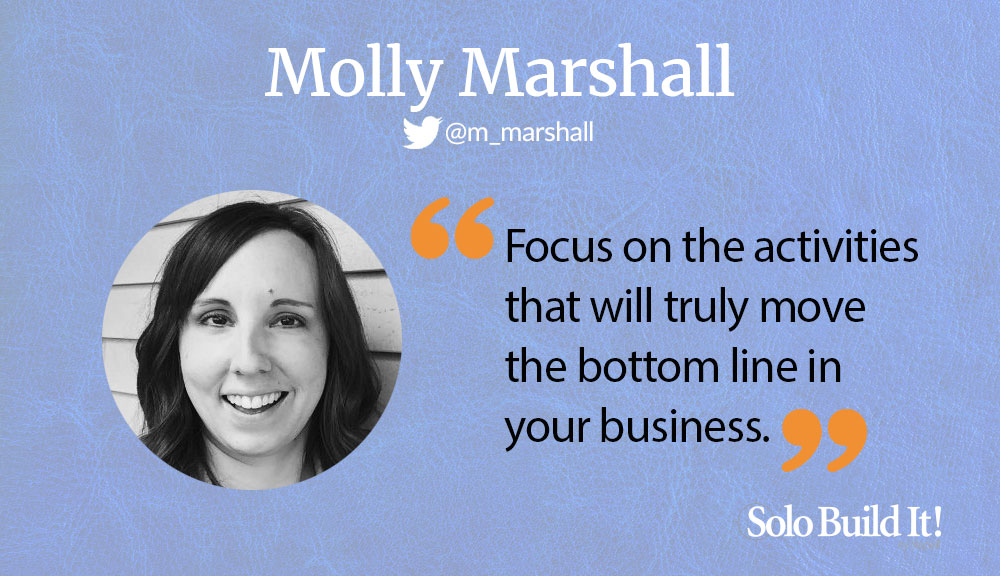
Molly Marshall
Social Media Strategist at www.mollymarshallmarketing.com
When you are working alone, you just don’t have time to waste.
- First, you need to be crystal clear on what result you are after, and work backwards to determine what action items really are important to get done.
For example, if you want to sell your online course, you need people in your sales funnel. To get people in your sales funnel you need to get them to your site. When you identify what you really need, you can focus on the activities that will truly move the bottom line in your business.
- The second is the ability to focus.
There is too much to be done as a solopreneur to get sidetracked. When you are crystal clear on what you really need to move the needle in your business, you need to stick to your plan and not feel bad or guilty about letting other things go.
- The third is to get a little bit of help.
There are many qualified VAs (virtual assistants) out there to help with tasks that you truly don’t need to do. They can create your social media graphics, or even schedule your posts. There is always something that you don’t personally need to be doing.
Molly Marshall is an award-winning blogger with social media & Instagram tips.
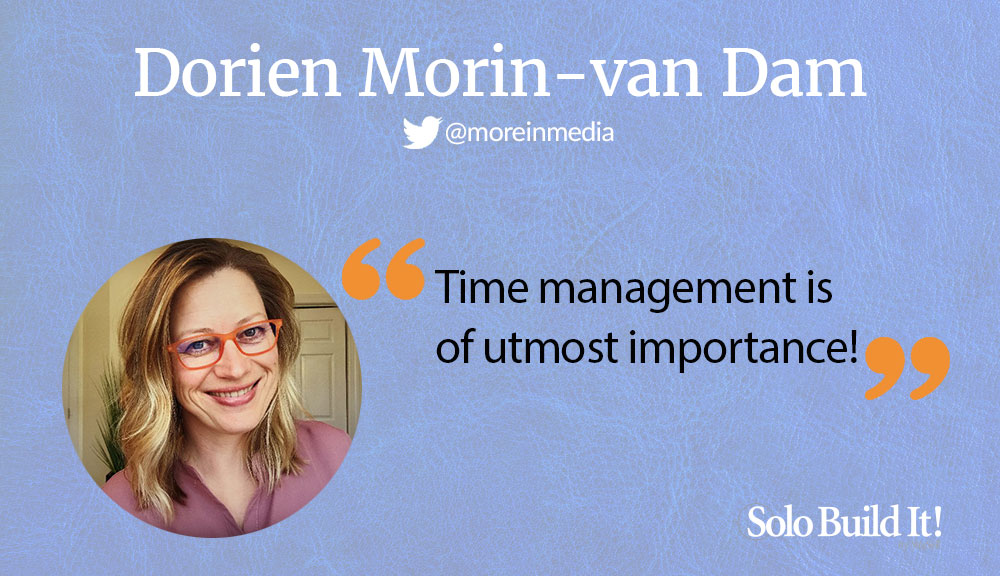
Dorien Morin-van Dam
Social Media Consultant at www.moreinmedia.com
- Plan!
That includes creating a business plan, as well as a marketing plan and marketing budget! The marketing plan should include a social media audit and a competitors’ analysis. Plan out your year, your months, your weeks and your days. Time management is of the utmost importance!
- Build a tribe!
Find like-minded solopreneurs in similar as well as other, complementary, industries. Start a mastermind group or a Facebook group and support each other. Without support like this, your world as a solopreneur can easily become a burden instead of a success.
- Take time off from your online work and world!
It took me almost two years before I realized that I needed to unplug on the weekends — and at least two whole weeks per calendar year — in order to keep my sanity. I start my weeks refreshed on Mondays after a 48 hour reprieve from my online work!
Dorien Morin-van Dam is a Speaker and Social Media Consultant.
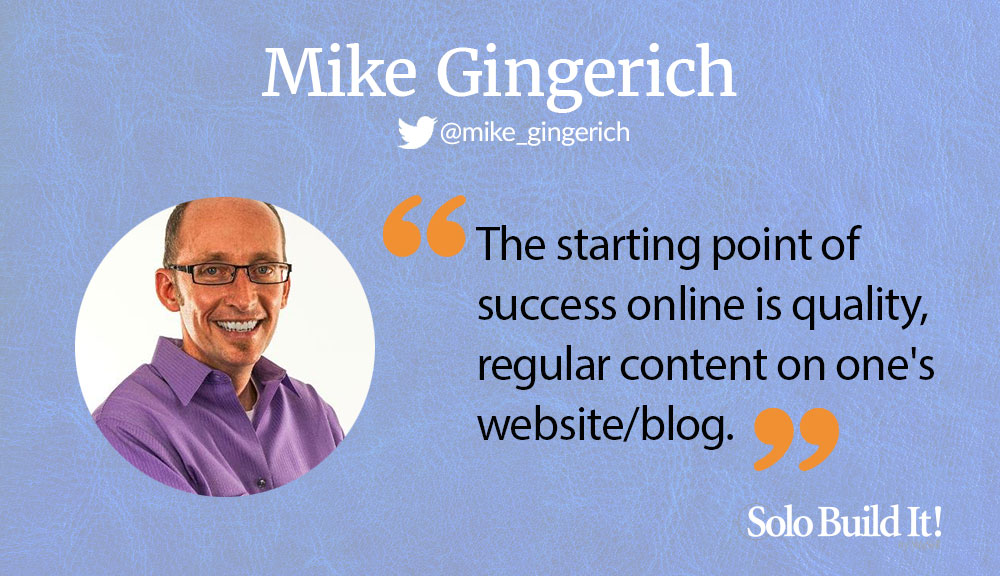
Mike Gingerich
President at www.mikegingerich.com
For success online, a solopreneur must do well at not just 3 but really 4 things including: social media, content-writing, list-building, and networking.
- Social media.
To amplify your quality website content, it’s imperative that you be fluent and fluid in social media sharing, engagement, and conversation. Knowing the difference between being a bullhorn and being a magnet (see www.magnetmarketers.com) is key. Social media really needs to flow as a relationship building tool, one where the end goal is to help and add value to others.
- Writing content.
The starting point of success online is quality, regular content on one’s website/blog. This is the “home base” for any solopreneur and one that needs to be carefully crafted and meticulously maintained. It is the source of quality information to share on social media and is the “footprint” that can be searched and discovered online.
- Building a list, and 4. Networking
The last two keys, list-building and networking, flow from a solid web content foundation and are key business strategy tools. A solid lead nurture list for email marketing is critical for online success, and networking online to build relationships and partnerships that can benefit both parties is the quickest and strongest way to build online!
So, in my opinion, you’ve got to look at 4 keys… Active social media presence, great content on your website, building your list of email addresses, and peer networking to build momentum and partnerships. It’s possible! Go for it!
Mike Gingerich is an online marketer, President of web software firm Digital Hill, and co-founder of Facebook contest app TabSite. He is always adding value and helping businesses grow leads online.
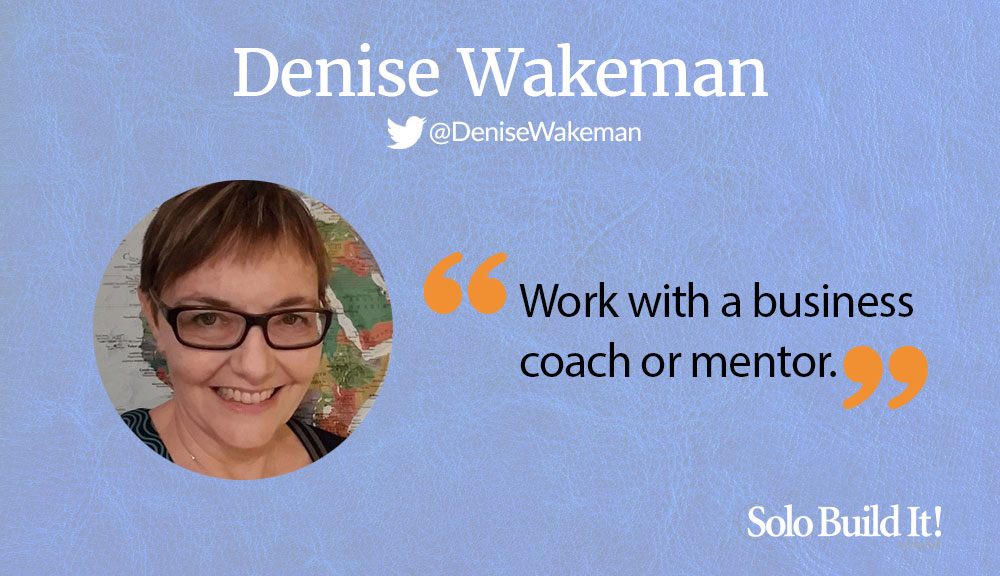
Denise Wakeman
Digital Marketing Strategist at www.denisewakeman.com
- Work with a business coach or mentor.
Don’t try to go it alone. Connect with an experienced adviser who has your back, will brainstorm, guide and give you feedback. In the beginning, if you can’t afford to work with someone one to one, then find a mastermind group or online group to get support. It’s essential and will make a big difference in your growth.
- Take time out for self-care.
Working 10-12 hours a day will only burn you out. Take at least one break a day to get some exercise, meditate, read, watch a movie. Your brain and your body need a break so you can generate new ideas, work on challenges and stay fresh for your clients, colleagues and vendors.
- Start building your email list now.
From day 1. This will be your biggest asset for building and growing your business. Along with working to attract people to your list, segment people into niche interests as soon as you can so you’re sending content only to people who have raised their hand to request that content.
Denise Wakeman is a Digital Marketing Strategist and works with authors and online entrepreneurs to strategically use social marketing tools to gain visibility, build credibility and get their message out to the world. Denise is passionate about adventure travel and how it can inspire you to think bigger and go for what’s possible in your business and life.
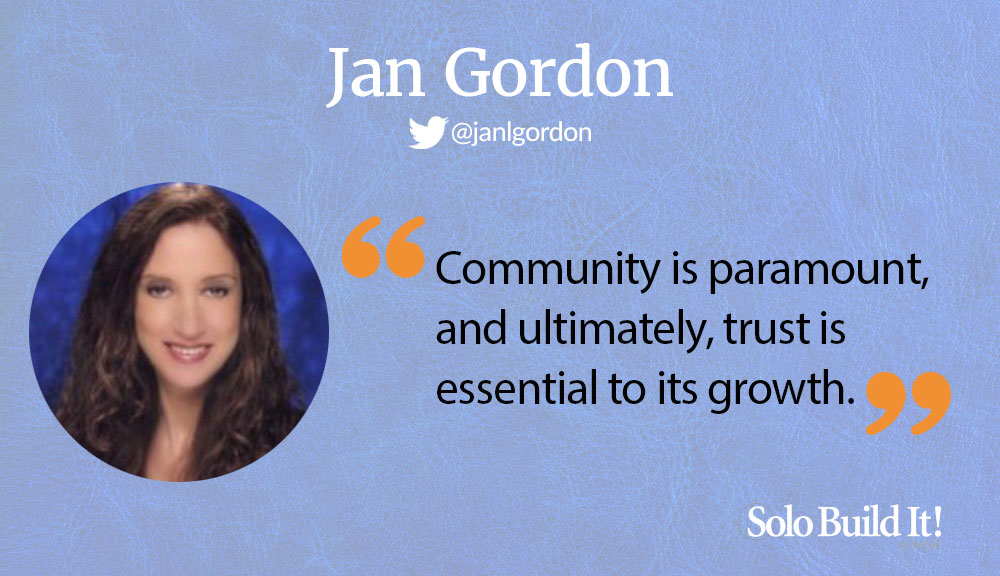
Jan Gordon
CEO at www.curatti.com
The 3 most important things? This is almost a trick question. There are so many important things, and no doubt some that are niche specific. To find 3 that are of equal importance to everyone, you really need to start with the building blocks.
- Ask yourself the key questions:
- What do I want to achieve?
- How can I make money doing that?
- Is there room in that market for me?
- What platforms do my prospective clients use?
- What might I offer that will bring prospective clients to me?
- Do I have a unique sales proposition that will compel prospects to choose me?
- Do I beat the competition on price, products, community, service?
- Can I scale my operation?
- Do I know (and admit to) my limitations? This is not only about knowledge and talent. It also covers energy levels, health, sleep and life/work balance.
- Do I have enough money in the bank to cover all start-up costs for my blog and online business (these are more than you think, unless you can do almost everything yourself) and weather a slow start?
- Community is paramount, and ultimately, trust is essential to its growth. And in a saturated market, there are few ways of achieving it. Do you:
- Come into your new venture with trust and community already intact?
- Have at least one powerful advocate who is already trusted, who will champion you?
- Have the money to buy these things through social media advertising or hiring a top line pro, and the knowledge and integrity to turn this new community into a sales stream?
- Strategize your inbound marketing:
- Produce extraordinary omni-channel content aimed at your audience. Give away just enough information to bring people to your site, then sufficient to make people realize they need help to do what you are writing about.
- This part is the key: Your content must, in large part, be focused on subjects that you can offer help in. What’s the point of you planting a need in others if you can’t satisfy it with your own services?
Jan Gordon is a Top 20 Social Media Global Influencer, CEO of Curatti, Publisher of B2B Content Marketing information, and Digital Strategist.
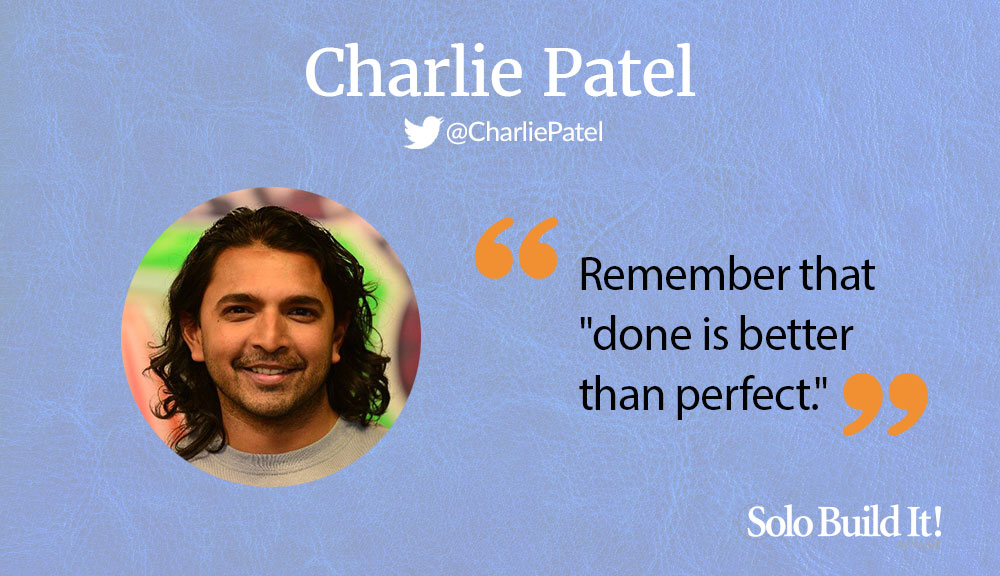
Charlie Patel
CEO of www.triberr.com
- Prioritize and eliminate distractions.
It’s inevitable that a thousand to-do’s will be on your checklist. Learn to be a time-sensitive project manager and focus strictly on getting a few critical items done every day. Block time on your calendar, use the Pomodoro technique, and focus on ROI. Remember that “done is better than perfect.”
- Operationalize for scale.
There’s a ceiling to the number of hours you can work, number of clients you can manage, and amount of money you can make. Therefore, start early to think about all the aspects of the business that can be automated, or contracted for operational efficiency, to help scale the business.
- Hire experts.
As a solopreneur, you can’t be everyone, everything and everywhere. Therefore, you’ll need to hire out certain tasks to contractors. When doing so, hire the best as it’ll actually save you money in the long run. As the saying goes, “If you think it’s expensive to hire a professional to do the job, wait until you hire an amateur.”
Charlie Patel is the CEO of Triberr, CEO of 99robots, Cofounder of JuiceTank and WordPress Geek.
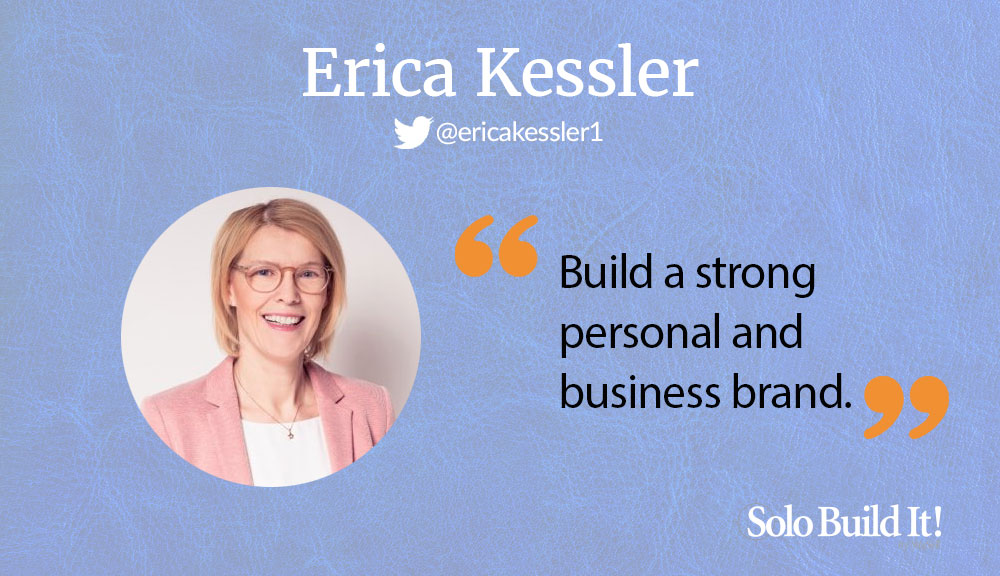
Erica Kessler
LinkedIn Consultant, Trainer and Speaker at www.kessler-socialmedia.com
- Build a strong personal and business brand, especially with a professional profile photograph and company logo.
Create a LinkedIn company page to provide a platform for you to share insights, any event pictures, and your blog posts.
You shouldn’t underestimate the power of your branding—many solopreneurs don’t invest in a LinkedIn company page and could be missing opportunities for their LinkedIn presence to shine.
- Share your voice through content you share, and also ask questions.
Don’t forget to engage with your connections on social media by liking and commenting on their content.
Use LinkedIn Publisher to share content, your story, or any articles. Share how you launched your business or give tips in a specific area from your industry. Make your content personal to stand out.
- Share your unique vision and experiences as a speaker, primarily focused on educating professionals through presentations and keynotes.
Start with small local events—and as you improve people will spread the word and you will be invited to larger events, even globally. Share your story leading up to the event, during the event, and share what you learned post-event. Facebook and LinkedIn are fantastic platforms for sharing your voice and earning attention. It can even lead to new clients.
Erica Kessler is the founder and owner of Kessler Social Media based in Zurich, Switzerland.
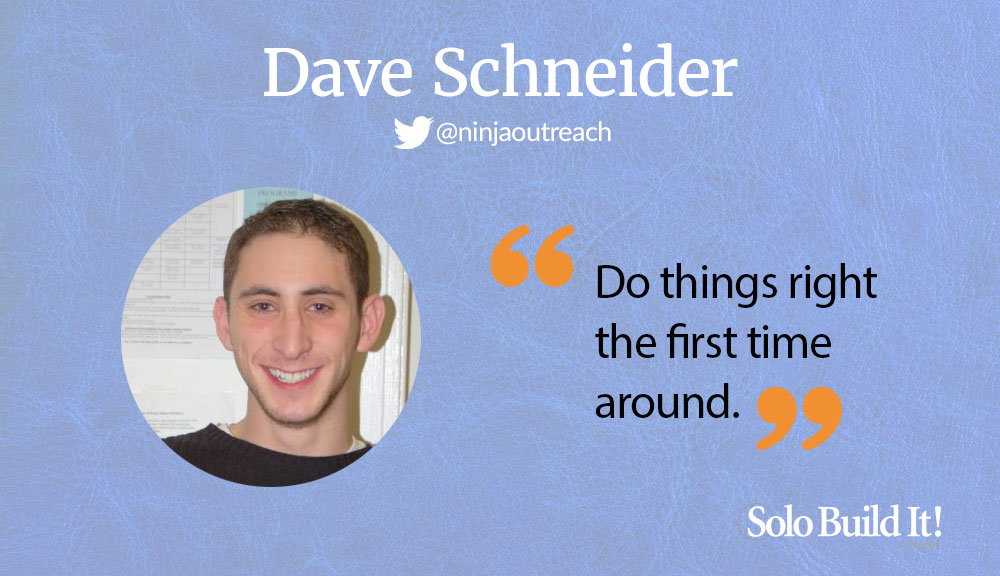
Dave Schneider
CEO at www.ninjaoutreach.com
- Do things right the first time around.
As I’ve said before, it’s very difficult to fix/change infrastructure down the line. One example I frequently cite is when we used PayPal as our payment processor at first, but then found out most customers preferred to use Stripe. Fixing that cost us thousands of dollars, took months, and lost sales. Lesson? Conduct proper research and do it right the first time.
- Find influencer partners.
I’ve been a proponent of influencer marketing and believe it can help drive traffic and sales/signups for your business. If you can find the right influencer, a partner (or partners) with a tight audience willing to promote your product/service, it can propel your business forward in a big way, fast.
- As a solopreneur, you need to make sure every dime you spend on your business, counts.
Another thing I’ve learned when it comes to enhancing productivity is to hire virtual assistants. For a price commonly in the USD $3 to $5 per hour mark, it’s a great investment for the amount of work (and time) that virtual assistants can help you clear up. For a solopreneur with a fledgling business, dependable virtual assistants are a crucial asset.
Dave Schneider is the Co-Founder of NinjaOutreach, an all in one Prospecting and Outreach software for marketers. He blogs about business. You can also find him on Twitter.
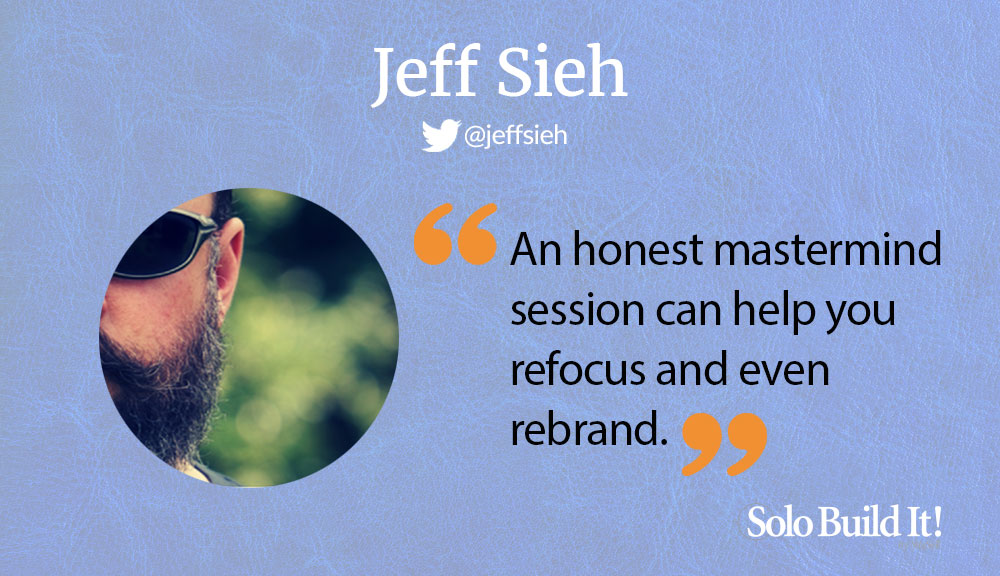
Jeff Sieh
Owner and Creative Director at www.hisdesignonline.com
- Mastermind.
My business grew by leaps and bounds when I was able to meet and share in the collective wisdom of like-minded entrepreneurs.
- Be consistent.
People who start a podcast only go to episode 6 or 7 before they get frustrated and quit. Sometimes you have to put your head down and keep grinding it out. I’ve seen many people stop right in front of the finish line.
That being said, knowing when to stop something that isn’t working and trying something else is an important skill to develop. So how do you know when to stop? That’s where the masterminds I mentioned earlier can help. An honest mastermind session can help you refocus and even rebrand.
- Collaborate.
Collaboration can happen in a mastermind, but often occurs with people who are peers in your specific niche. Co-leading a webinar, participating in each other’s product launch, and even referring each other clients who would be a better fit are some great ways to collaborate with others.
Jeff Sieh is owner and Creative Director at His Design, Inc. where he has worked to help clients market themselves in the best way possible using a variety of media for over 14 years. He is “Head Beard” at Manly Pinterest Tips where he is the creator and host of The Manly Pinterest Tip Show. With top tips, comedy, storytelling, and just plain fun, Jeff teaches Pinterest techniques unlike any other. Jeff is also on the Social Team at Social Media Examiner and manages their Pinterest and Instagram accounts. Visit www.manlypinteresttips.com where Jeff explores visual marketing with character as big as his beard.
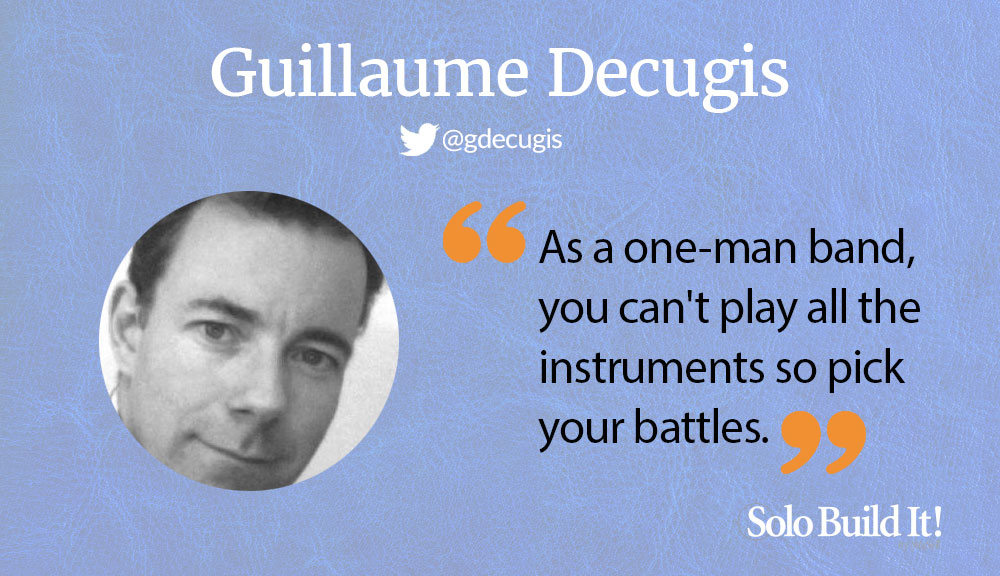
Guillaume Decugis
Co-Founder and CEO at www.scoop.it
- Focus.
As a one-man band, you can’t play all the instruments, so pick your battles.
- Design to cost.
You have a business to run and it’s likely you don’t get paid to update your website or do online marketing. So make sure you don’t end up over-allocating time to online activities vs. revenue-generation ones. Online, “good and done” beats “perfect but in progress” all the time.
- Measure.
If you don’t measure the ROI of what you do, you’re missing out on the best thing doing business online offers vs. offline. Measuring doesn’t just keep you real, efficient and focused. It also enables you to learn and grow.
Guillaume Decugis is the Co-Founder and CEO of Scoopit. Entrepreneur (Musiwave, Goojet). Engineer-turned-marketer.
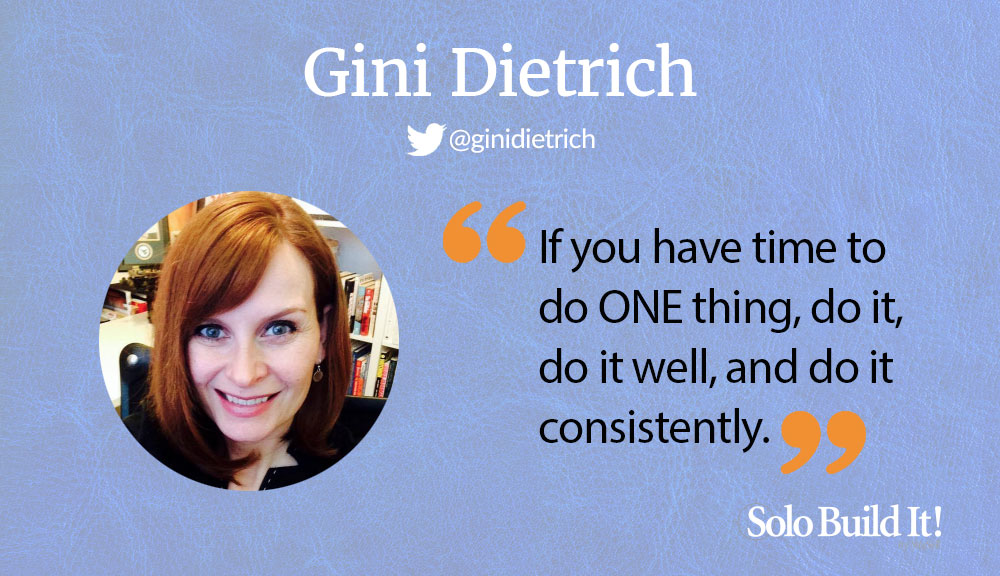
Gini Dietrich
CEO and Author at www.armentdietrich.com
- Be consistent.
If you have time to do one thing, do it, do it well, and do it consistently. For instance, perhaps you discover Twitter is the place where many of your prospective clients hang out. Spend some time cultivating your lists and sharing content there. It doesn’t have to be every day. It doesn’t even have to be every few days. Just be consistent about it.
- Network.
One of the things most do really well is network in person, but forget about all of the low-hanging fruit they have online. When I work with solopreneurs, I always make them create a dream list of clients and then go through their LinkedIn pages to see who are first or second connections. Then ask for introductions. Between this and revisiting previous friends/customers/bosses, you’ll find many new business opportunities.
- Stop and smell the roses.
While this isn’t particular to succeeding online, it speaks to being successful, period. So many of us go out on our own, work hard to build a livelihood that also allows us freedom and flexibility, and we don’t take advantage. Every once in a while, slow down, look around, and pat yourself on the back for what you’ve achieved.
Gini Dietrich is the founder and CEO of Arment Dietrich, an integrated marketing communications firm. She is the author of Spin Sucks, co-author of Marketing in the Round, and co-host of Inside PR. She also is the lead blogger at Spin Sucks and is the founder of Spin Sucks Pro.
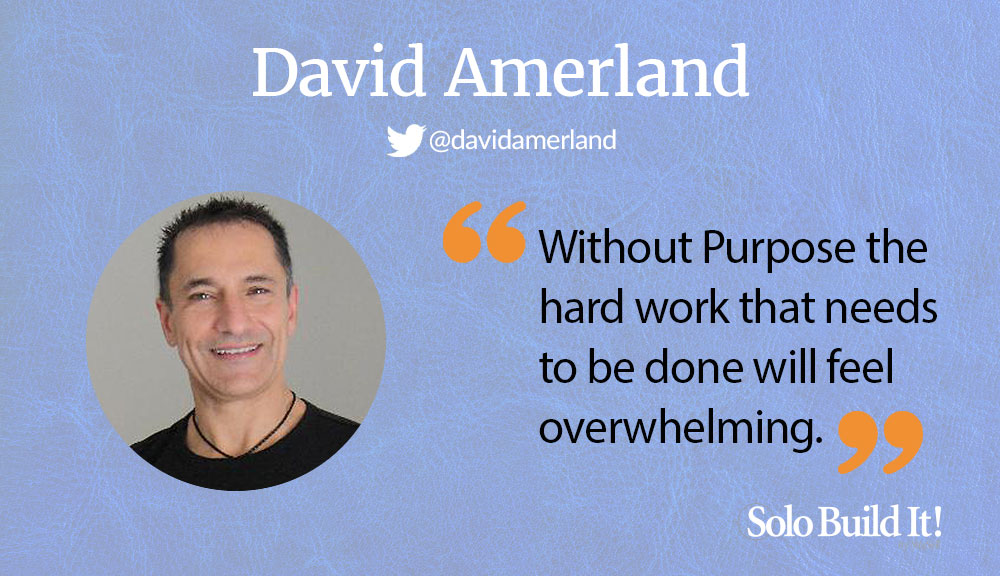
David Amerland
Author, Speaker, Analyst at www.davidamerland.com
In my latest book, The Sniper Mind: Eliminate Fear, Deal with Uncertainty, and Make Better Decisions, I detailed three things that every solopreneur must put in practice if they want to succeed: Passion, Purpose and Persistence. These three Ps become the pillars that uphold the solopreneur’s sense of identity when things are tough (which they will invariably be) and when there is a need for doubling-down and focusing on the hard work waiting to get done (which there invariably is).
- Passion
Without Passion nothing of note will ever be achieved and the project will cave in at the first sign of difficulty.
- Purpose
Without Purpose the hard work that needs to be done will feel overwhelming. The struggle to get things done will be unequal and heavy. The temptation to give up will be way too appealing.
- Persistance
Without Persistence we would be living in a world without Google, without Twitter, without Facebook or Starbucks or Ford. Everything would be mediocre. We may not even have had the lightbulb. Persistence is the solopreneur’s guarantee that the struggle is worth it, because the coming change to the world is real.
David Amerland is an Author, Speaker and Analyst. He is passionate about technology, social equality, web trends and social media.
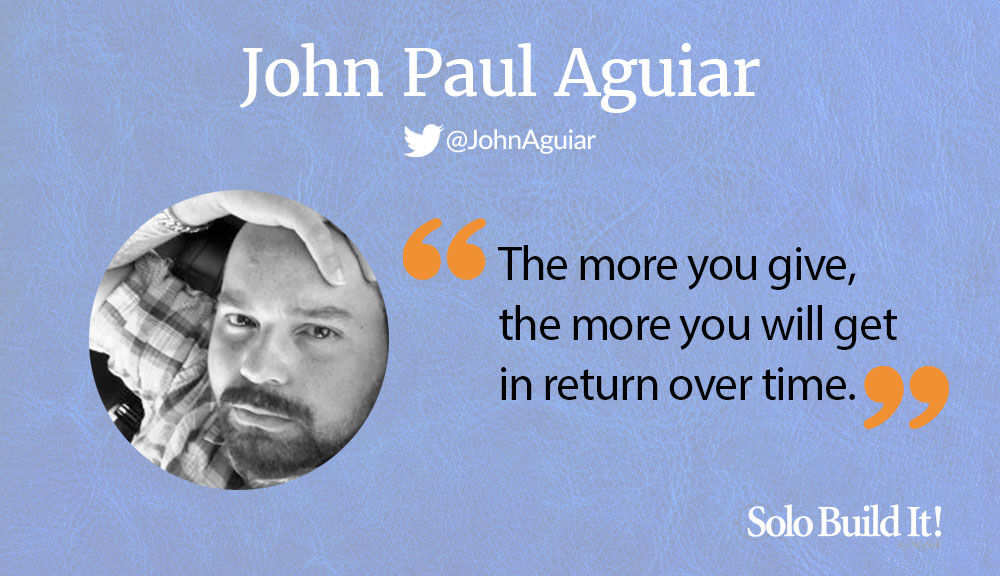
John Paul Aguiar
Blogging Entrepreneur at www.johnpaulaguiar.com
The 3 areas I think a solopreneur needs to do well to see real success online are…
- Have a blog, which is where you control everything. It’s where you build your brand and business. All points and connections you make over the web should all lead back to your blog.
Write content in a way only you can write, be authentic and helpful in your writing. If done correctly, you will then become a resource that people think of first when they need content or help in their specific niche.
If your content is written and shared correctly, you will then build your email list, which is still the backbone of an online business.
- Use social media to spread your brand and message, but first narrow your time down to your two favorite platforms… whichever best fits your niche.
This way you can completely learn how to use those two platforms successfully. Then give them 75% of your time, giving the other 25% to all the other platforms you want to maintain a presence on but without it taking up your whole day.
- Focus your mindset on giving freely. The more you give, the more you will get in return over time.
The more time you put into giving in the beginning, the more it will help you build your brand and business faster in the long term.
Think of it like this…
When a rocket launches into outer space, it uses something like 70% of its fuel just on the launch. Once it’s in space, it uses the other 25%.
Spend your 75% now helping and connecting, building relationships, then live off the 25% in the future.
Basically, as a new solopreneur, you want to do anything and everything that gets you and your blog attention, including connecting with people daily, sharing helpful, quality content, and promoting that content like crazy.
Be patient, keep at it and success will come.
John Paul Aguiar helps bloggers and entrepreneurs with blog marketing, Twitter marketing and social media. He was ranked #2 Top Influencer in Marketing 2016 by BuzzSumo.

Jessica Ann
Founder and Creative Director at www.jessicaannmedia.com
- Build a solid online community (and an in-real-life community doesn’t hurt!).
- Understand the art and science of writing for the web.
- Endlessly study your craft.
Jessica Ann is a keynote speaker, best-selling author, and podcast host.

Alisa Meredith
Owner & Strategist at www.alisameredith.com
- Listen.
Don’t try to figure out everything yourself.
- Don’t be afraid to try things and push buttons.
You’re probably not going to break anything (too badly), and you’ll definitely learn something!
- Share.
Share knowledge, opportunities, connections — it will come back to you when you least expect it.
Alisa Meredith is about all things inbound marketing, Pinterest, and some things dog-related from an introverted performer. Speaker at Social Media Marketing World 2017.
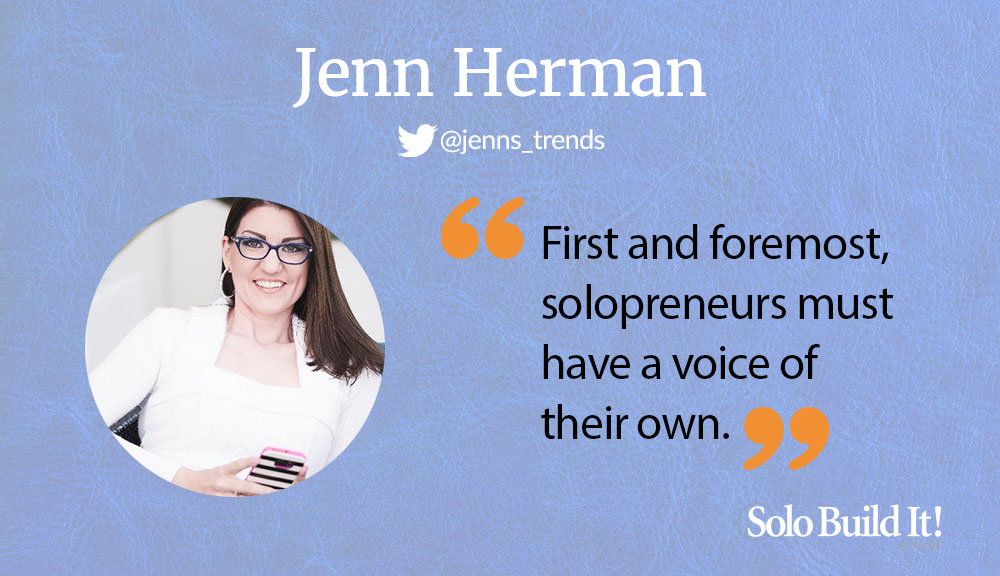
Jenn Herman
Forefront Blogger on Instagram marketing at www.jennstrends.com
- First and foremost, have a voice of your own.
There is so much noise out there and so many people trying to fit in with everyone else. To really stand out and succeed, you need to be true to your own voice and not be afraid to have an opinion that goes against the norm. Or if your opinion is in line with everyone else, you still need to have a unique perspective or contribution to the topic. Reiterating what everyone else is saying won’t get you very far online.
- Be unapologetically true to yourself.
People want to connect with genuine, real people. If you have quirks, or are insanely sarcastic, or use certain slang words when you talk, or are a die-hard comedian, or use eloquent language — embrace it online! Let your own personality and all of its flaws and special characteristics shine through. You’ll attract the right people for your brand who are excited to work with you, and you won’t have to work so hard to close the sale on new clients.
- Finally, to see any real success online, you absolutely must have a strategy in place for your online efforts.
Whether using one social media platform or many, a blog or a website, or any other medium, you have to know what your goals are. You may want exposure, you may want sales, you may want sign-ups or registrations. You may want a combination of things. But if you don’t know why you’re using your online presence, then you’re throwing spaghetti on the wall, “hoping” something will stick — and that does not lead to real online success. Instead, every single thing you post online should, in some way, further your goals and help you reach your desired outcomes.
Jenn Herman is a social media and Instagram educator, consultant, and speaker. Her blog was voted a Top 10 Social Media Blog 2014-2016.

Instead, our Action Guide walks the new solopreneur through the time-consuming, deliberate process of researching and thinking about their prospective business idea and niche. Once they’ve narrowed their focus, they proceed to create a Site Blueprint, which acts as their content plan going forward.
And the results speak for themselves. Solopreneurs who follow the SBI! process are 100x more likely to succeed than those who choose alternative platforms.
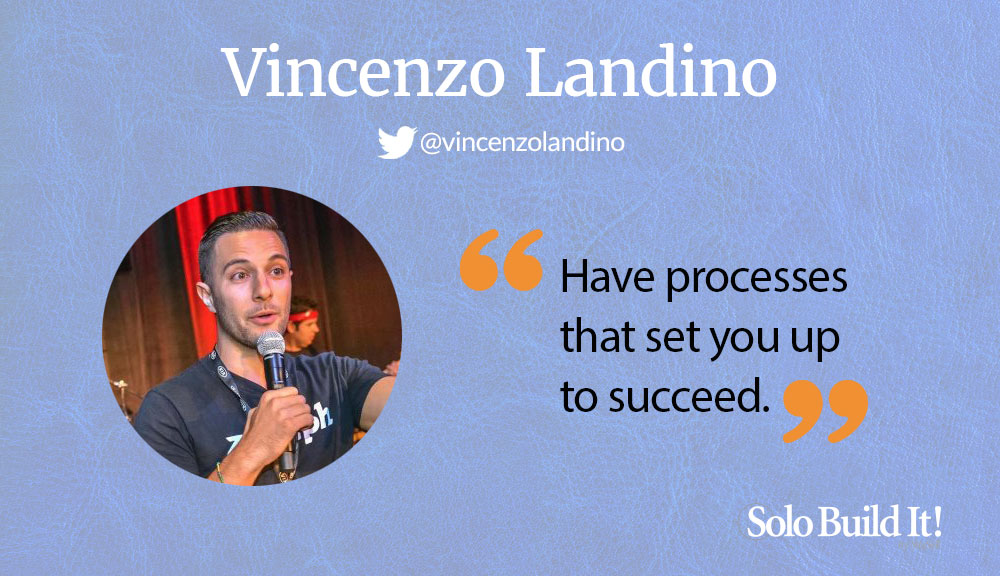
Vincenzo Landino
Creative Director at www.vloglikeaboss.com
- Be you.
I firmly believe that with the technological and social media landscapes the way they are today, solopreneurs cannot rest on their laurels when it comes to their personal brand. Have your own personality, thoughts, experiences, and ideas shine through.
- Be authentic.
Another way to succeed online is to interact as you would in “real life” – because this stuff is real life. Automated responses, while still commonplace, don’t create trust in your brand, and without trust, you get no business.
- Have a process.
Have processes that set you up to succeed. Online doesn’t mean you can invest in it only when you feel like it. It’s a regular part of your marketing mix and a big part of your business. Treat it as such.
Vincenzo Landino is the man behind the camera for @schmittastic | web video creator and vlogger.
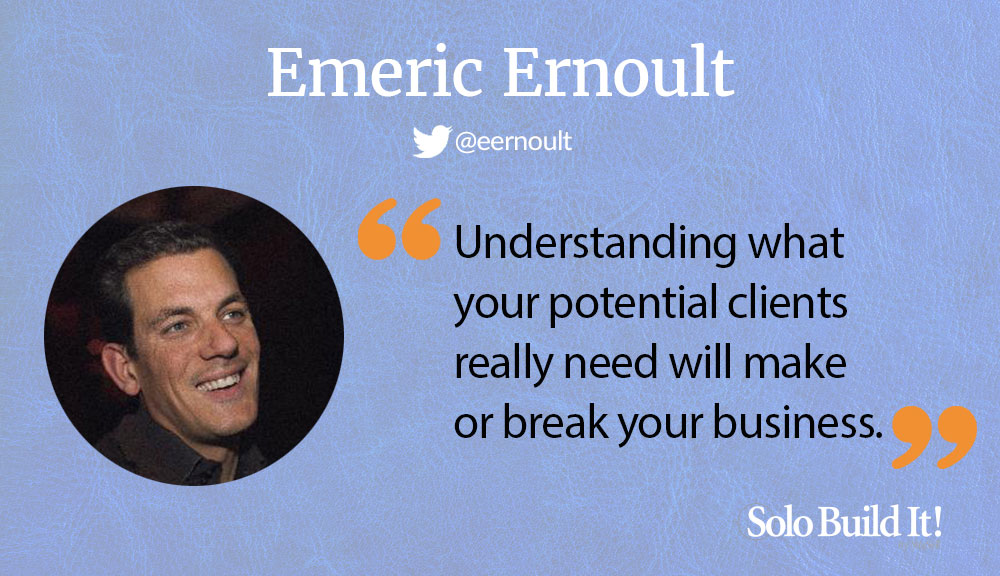
Emeric Ernoult
Founder and CEO at www.agorapulse.com
Being an entrepreneur is overwhelming. There are so many things you could do, but only a few will matter. Focusing on these is the key to success.
Being a solopreneur makes this need for focus even more important: you don’t have a team, and your resources are very, very scarce. Focus is more than important. It’s the key to survival. So, what should you focus on?
- Focus on your clients.
Understanding what your potential clients really need will make or break your business. If you’re not doing customer discovery with your prospects and clients at least 3 or 4 hours a week, you’re guaranteed to fail eventually.
- Focus on your product (or service).
Customer discovery teaches you what you need to sell. The next step is to build that. Whether a product or a service, you need to build it, package it and explain (and market) it right. I’m amazed by the number of people who sell products and services I just don’t understand.
- Focus on your visibility.
A good product or service addressing a need validated by customer discovery will only take you so far if nobody hears about it. Grow your visibility from day one, little by little, channel by channel. Start small, grow from there. You only need a dozen clients in the early days, which should be easy. As you grow and have more cash in hand, invest in other channels. Remember, every business on earth started with a handful of clients –even the largest ones.
Emeric Ernoult is a social media and Facebook marketing addict. Facebook marketing blogger. Serial entrepreneur and loving it! Founder and CEO, Agorapulse.
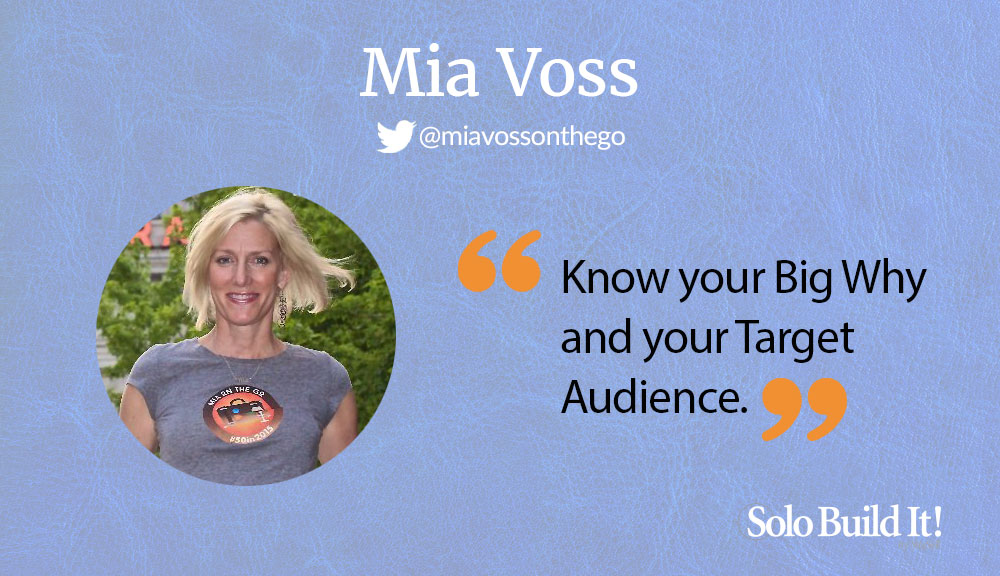
Mia Voss
Luxury Travel Blogger at www.miaonthego.com
- Drill down and get targeted in your brand, message, audience and thinking.
Know your Big Why and your target audience.
- Don’t fall down the rabbit hole of what everyone else is doing.
Yes, it’s great to have a collaborative spirit but you must be very grounded in what you are doing so that you don’t get over-influenced by everyone else around you.
- Once you get #1 and #2 down, gather your tribe.
This is your A-Team, the people you admire and want to be like when you grow up. They tell you the truth when you need it and give constructive feedback. You are aligned with them business-wise, ethically and spiritually (yes, I said spiritually — business is no longer just one dimensional).
Mia Voss is a Luxury Travel and Lifestyle Blogger. Brand Promoter. Storyteller. Big fan of Wine | Host at Getting Tasted.
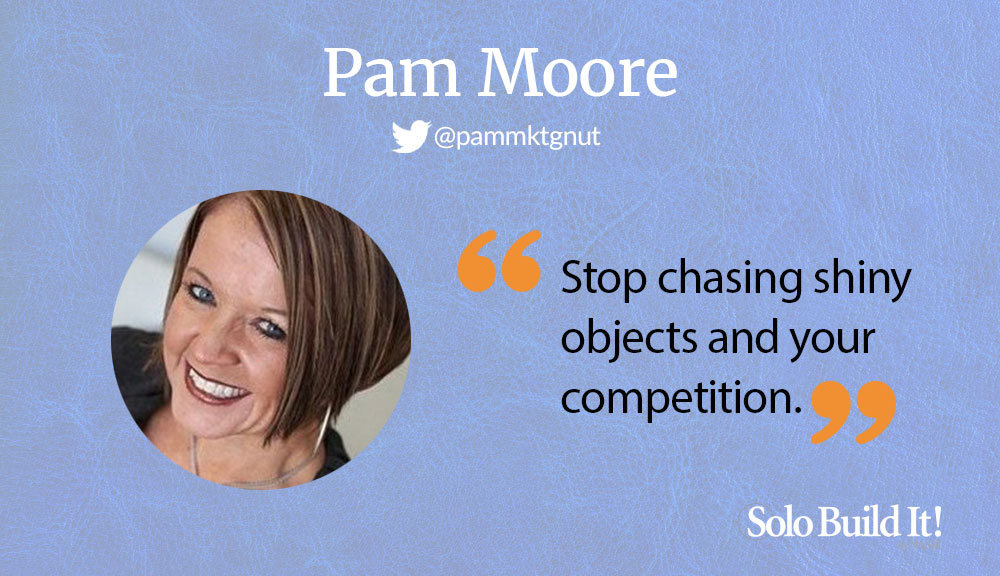
Pam Moore
CEO and Founder at www.pammarketingnut.com
- Get real on the amount of time and budget you have to allocate to your top priorities.
Often times learning to say “no” is the key to success. Focus is the key to success in both life and business.
- Stop chasing shiny objects and your competition.
Build your own plan that serves your customers and helps you achieve your business goals. Know where you want to go and build a plan to achieve success. Plan your work and work your plan!
- Learn as quickly as possible to value every minute of your day as well as your knowledge.
If you don’t value your time and expertise, nobody else will. It starts with you and taking care of your mind, body and spirit consistently.
- Know your customers intimately.
Who are they, what do they need from you, and how can you serve them unique value that is compelling and solves a problem they can’t solve easily otherwise.
Pam Moore is the CEO of Marketing Nutz social media training and consulting agency. Co-founder Social Profit Factor – Social Media Training Academy. Forbes Top 10 Social Media Influencer. Lover of data, visuals, communities, beach and life!
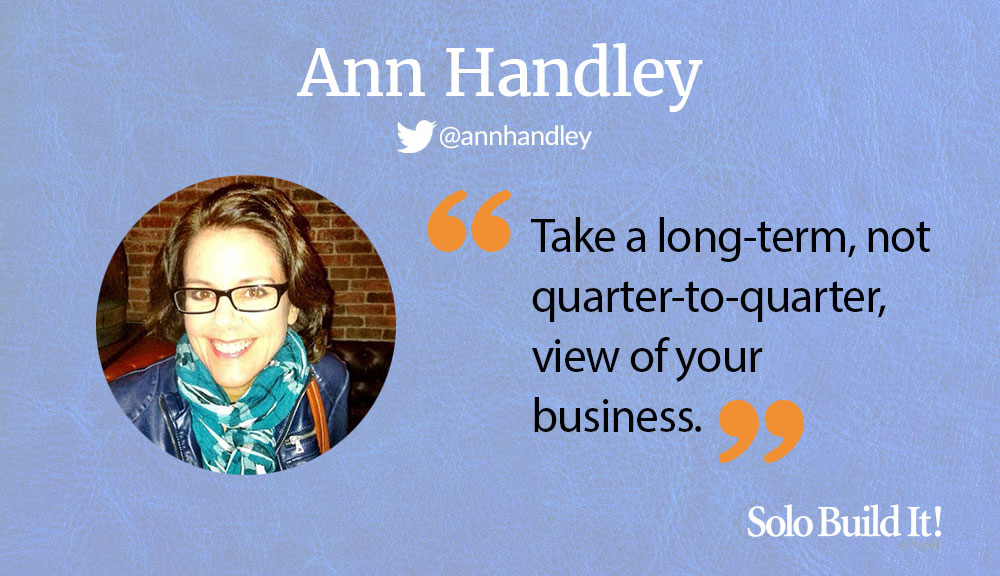
Ann Handley
Chief Content Officer at www.marketingprofs.com
- Define what “succeed online” means.
What, specifically, are you looking to affect? Trust? Awareness? Partnerships? Straight-up sales? It’s hard to pick a path unless you know where you want to head.
- Create focus.
Too often, the smaller companies and solopreneurs I talk to suffer from a lack of focus.
So focus your marketing. Don’t scatter your efforts across many different channels and opportunities. Focus on being ridiculously good at one or two, consistently.
Example: Brain Pickings focuses on a single weekly email. I get a lot of email — but it’s my favorite read of the week.
It’s substantive and weighty, and it hits my inbox at an oddball time: smack in the middle of the weekend, on Sunday morning. That’s by design, as the subscription pop-up makes clear.
- Add patience.
Great marketing is a slow game. Building a business takes time.
Take a long-term, not quarter-to-quarter, view of your business.
When you think of your customers with the long term in mind, you make decisions that create more sustainable relationships. That, in turn, creates a more sustainable business.
Ann Handley is MarketingProfs’ content bossypants. Mother of ridiculously amazing children. Author of books. Everybody Writes is a Wall Street Journal bestseller.
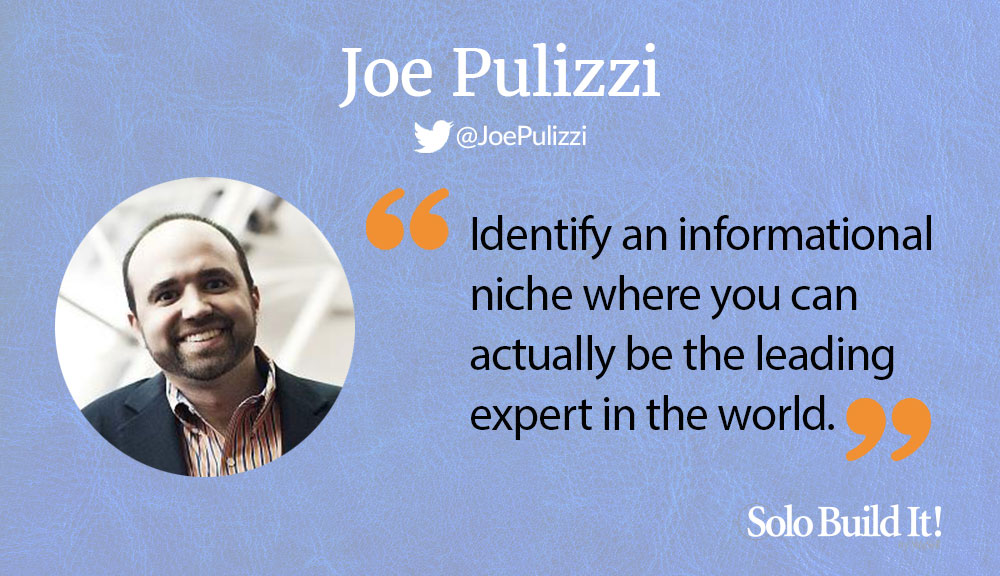
Joe Pulizzi
Founder at www.contentmarketinginstitute.com
- Focus on a niche.
Identify an informational niche where you can be the leading expert in the world.
- Create content regularly.
Publish and promote content (video/text/audio) primarily in one channel, using one content type, consistently publish (every day/week/etc.) over time (well over a year).
- Build your list.
Build an audience of email subscribers. Those are the people you will ultimately sell your product and service to.
Joe Pulizzi is the Founder of Content Marketing Institute and Content Marketing World. Author, Content Inc.
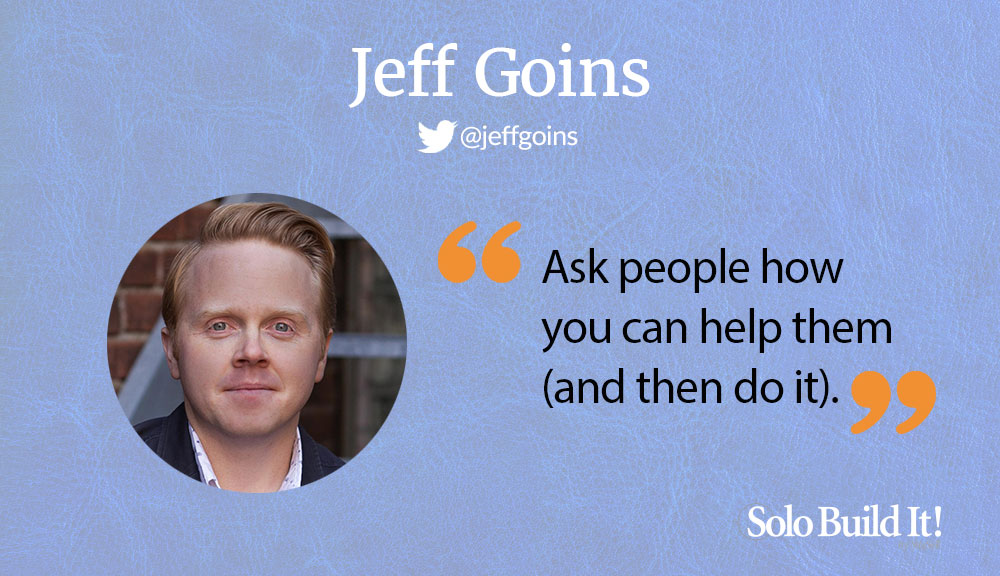
Jeff Goins
Writer at www.artofworkbook.com
- Create original and interesting content.
- Build an email list.
- Ask people how you can help them (and then do it).
Jeff Goins is the best-selling author of The Art of Work.
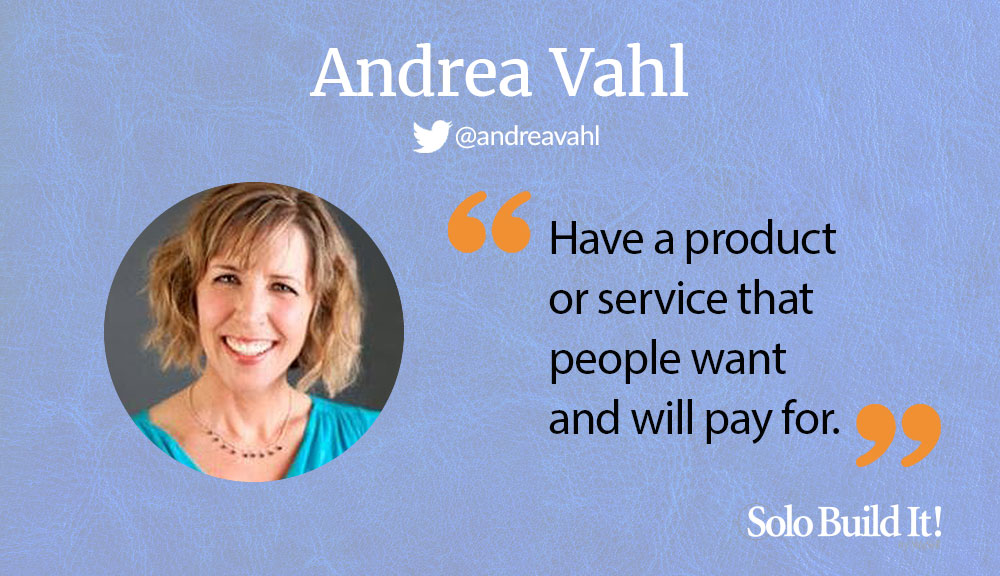
Andrea Vahl
Social Media Consultant at www.AndreaVahl.com
- Measure!
List what the top 3 Key Performance Indicators are for you and optimize your strategy around those numbers. For me it’s sales, email subscribers, and website visitors in that order.
- Have a product or service that people want and will pay for.
Sometimes I see people launching something that they think people want but haven’t really beta tested.
- Stand out.
If your brand is too vanilla or your message isn’t clear on how you are different from what’s currently out there, you are going to get lost in all the noise.
- Connect with people.
I think these days it’s important to create community and be of service. Help someone. You have to balance service with making sure you are growing your business, but if you come from a place of truly wanting to serve, your business will go farther.
Andrea Vahl is a Social Media Consultant, Speaker, and co-author of Facebook Marketing All-in-One for Dummies. She also likes to wear wigs.

Ana Hoffman
Founder at www.TrafficGenerationCafe.com
- Stop working harder. Work on things that actually work.
- Build an email list from day one.
- Don’t drive traffic if you don’t know how to convert it.
- Know what your call to action is before you write a word of content.
- Write less. Repurpose more.
Ana Hoffman is the founder of TrafficGenerationCafe.com, a blog that brings together the most profit-pulling traffic generation tips, hacks, and resources.
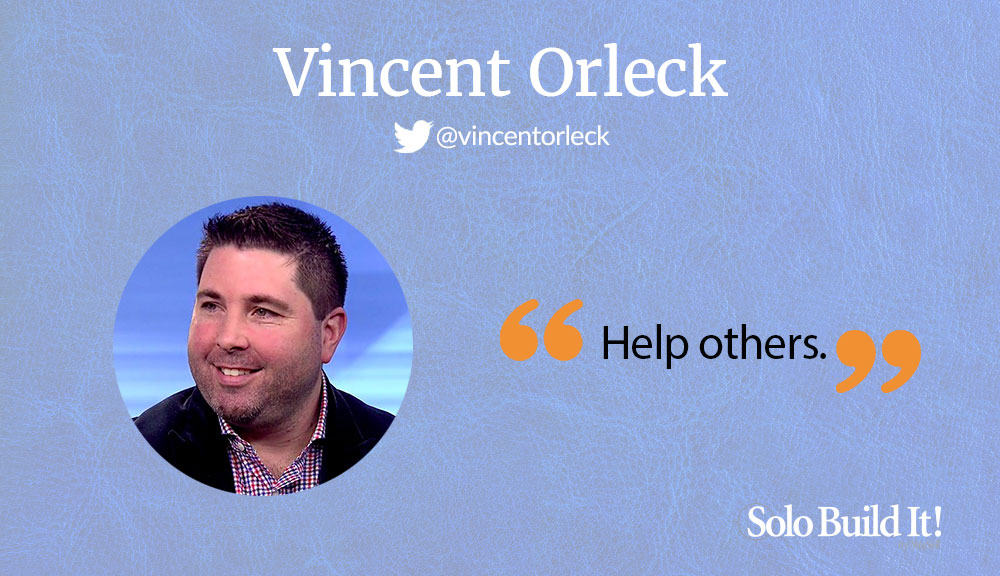
Vincent Orleck
CMO at www.brandishsocial.com
- Be self-aware.
- Help others.
- Stop pitching.
Vincent Orleck is NotAGuru, maven, ninja or rock star | CMO at @BRANDishSocial | President of Social Media Club Phoenix.
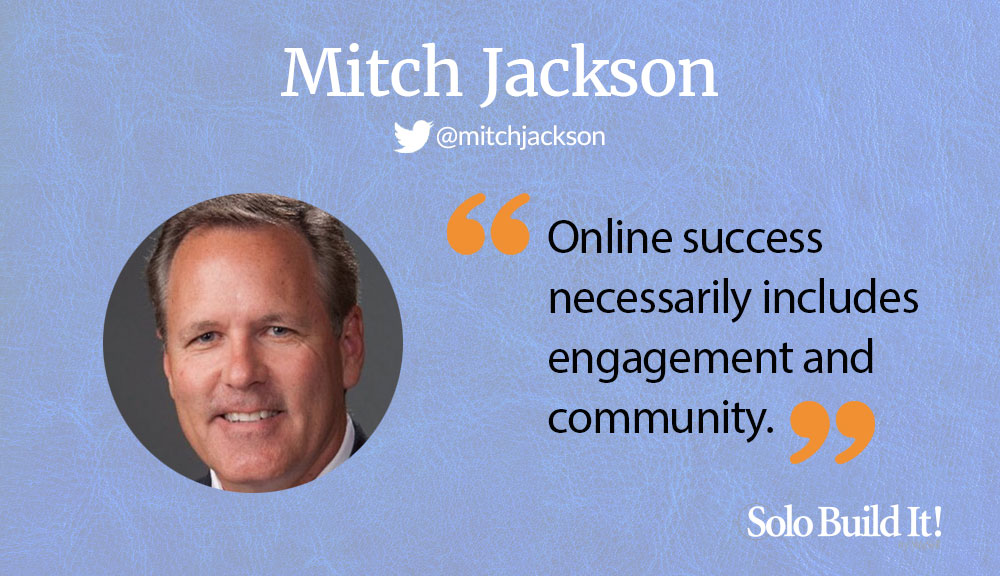
Mitch Jackson
Senior Partner at www.legalminds.lawyer
The three pillars of success of online solopreneurs are as follows.
- People skills.
First, a solopreneur needs to have excellent people skills. Online success necessarily includes engagement and community. Having the right people skills will let you excel at building both.
- Business skills.
Second, you must have good business skills. Success in business means much more than just having a good product or service. It requires you to start, manage and build a business the right way.
- Digital skills.
Third, successful solopreneurs must have exemplary digital skills. Everything you do has a direct or indirect digital connection. If you want to keep your head above water in the ever changing and sometimes turbulent digital ocean, you have to learn how to be a superb swimmer.
Mitch Jackson is a California trial lawyer who enjoys combining law, technology and social media to disrupt, hack, and improve his clients’ businesses and brands.
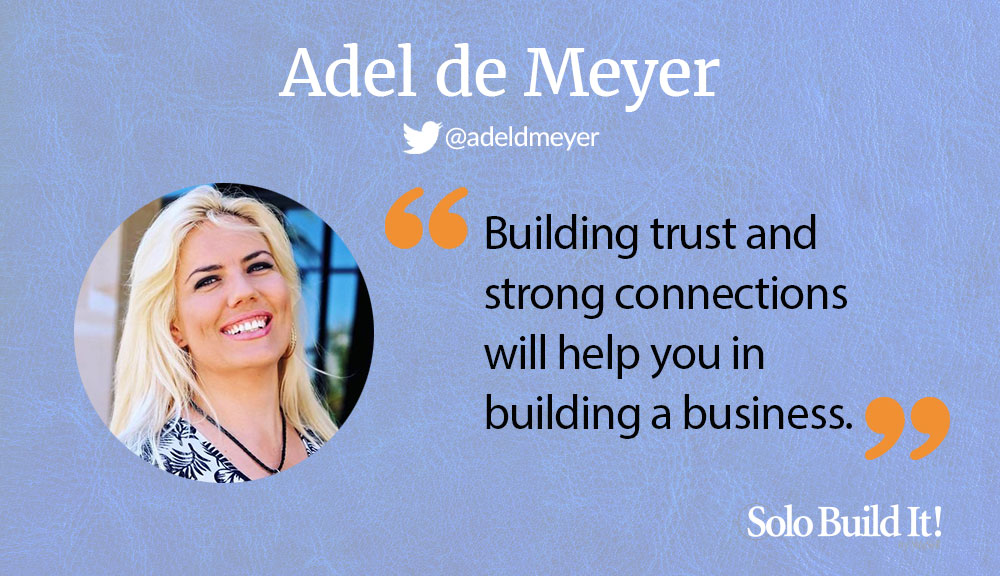
Adel de Meyer
Brand Influencer – Author – Mentor – Speaker at www.adeldemeyer.com
- Have a toolbox and focus.
There’s nothing a solopreneur needs more than a good toolbox and focus. Work during your best hours. Manage and plan your time. Have goals.
From the start, you need a good toolbox. Depending on your business, some might need more than others, but we all need the basics, like design, financials, hardware, marketing and sales. Get yourself good tools from the start. They might not always be free, but paying $20 a month for a good solid tool for your toolbox is absolutely worth the time and frustration it saves you!
- Always keep learning.
The online world is an ever-changing world. You need to stay up to date with the changes. Subscribe to blogs and online publications and read daily! Research anything and everything that you feel you need to know more about to run your business, get leads, have a better website, or keep up with the latest social media trends and tips on entrepreneurship. Besides reading books, I’ve set myself a goal of reading a minimum of 10 articles a day. It has helped me tremendously in everything that I do.
- Connect, network and engage!
I cannot express enough how much business and partnership opportunities I received due to networking and being active on Twitter, Instagram and, to some extent, LinkedIn. In my first two years as a solopreneur, I didn’t have to do cold calling, send lead gen emails or stalk people on any kind of direct messaging (DM) to ask for business or to “sell myself.” All my business came to me through Twitter, LinkedIn and Instagram. The key is I make time daily to engage with others, take part in Twitter chats, ask to collaborate on big and small projects with peers in my industry. I do guest blogging and podcast interviews, and I write on my own blog.
To be successful online (and, I believe, in general) you must work on having a good online presence and putting yourself out there. You don’t have to chase tons of PR opportunities, but make sure that you have some form of profile and presence online. Work on producing good content and engage with people. Building trust and strong connections will help you in building a business.
People are switched off from emails, ads and cold calling. Remember you get what you give. If you don’t put in the time to make time for others, you can’t expect much in return.
Adel de Meyer is a new media specialist, brand ambassador, author and mentor with focused expertise in using Twitter and Instagram for business. She has a top-listed digital marketing blog. Adel is recognised as a leading Instagram and Twitter influencer on social media and business in Australia.
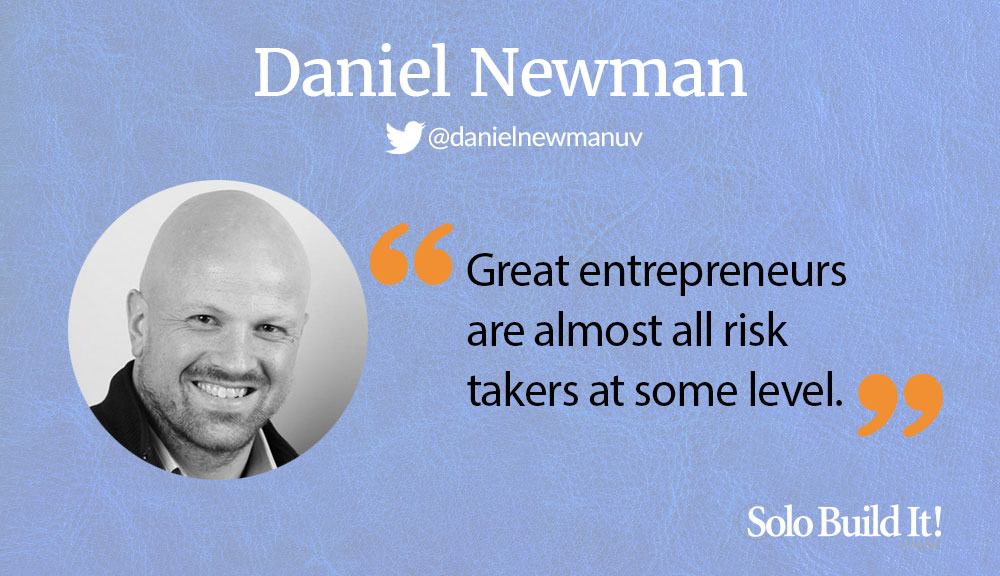
Daniel Newman
CEO at www.broadsuite.com
- Focused.
What value do you offer and to whom do you offer it? Trying to be many things to many people makes you hard to position and therefore customers don’t know what they can buy from you.
- Persistent.
You may hear “No” a lot before you start hearing “Yes”. If you believe in the value you bring, then you have to stay hungry and keep pushing until you make strides. Figure out how to maximize your opportunities and keep going for “Yes,” no matter how many times you hear “No.”
- Risk tolerant.
Starting a business has risk. The upside makes it worthwhile, but you cannot be short-sighted. You may even have to go backward financially a while before you turn the corner. Great entrepreneurs are almost all risk-takers at some level.
Daniel Newman is the Principal Analyst of Futurum Research and the CEO of Broadsuite Media Group. Living his life at the intersection of people and technology, Daniel works with the world’s largest technology brands exploring Digital Transformation and how it is influencing the enterprise. From Big Data to Cloud Computing, Daniel makes the connections between business, people and tech that are required for companies to benefit most from their technology projects. That leads to his ideas regularly being cited in CIO.Com, CIO Review and hundreds of other sites across the world.
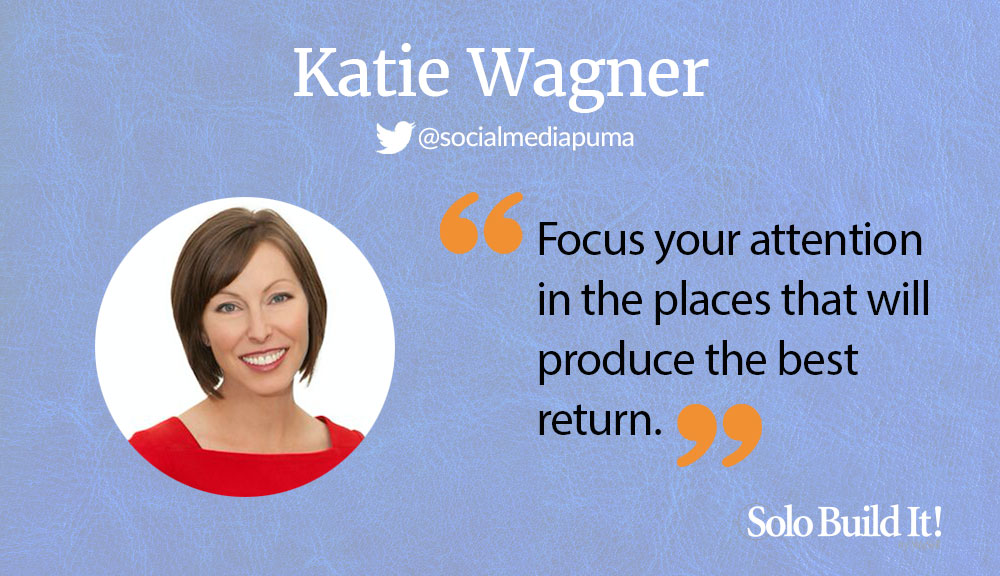
Katie Wagner
President at www.katiewagnersocialmedia.com
If you’re just starting out on social media, here are 3 things to keep in mind:
- Be smart, not everywhere.
A strong social media presence doesn’t necessarily mean having a profile on every channel. Focus your attention in the places that will produce the best return. How do you pick?
- Different channels have different demographics — your target audience won’t be everywhere, so be smart about targeting the channels where your prospects spend time. (If you don’t know, ask them! Send a survey to your clients to determine their online preferences.)
- The kind of content you can create will play better on some channels than others. If you have a visual product or industry, you might do best on some of the more visual channels (Facebook, Instagram, Pinterest). If you hate to write, don’t start a blog. Stick with something that requires shorter posts (Twitter?). Be realistic about what kind of content you can create, and which channels you will enjoy engaging with.
- You only have so many hours in the day, and one of the most important factors in social media success is consistency. Don’t attempt to run so many channels that you don’t have time to do any of them well.
Bad social media can hurt your business more than no social media, so don’t set up channels that you will neglect or run poorly. Start small, stay consistent, and grow when you’re ready.
- Set goals and measure results.
At the end of the day, social media is marketing. It doesn’t matter how cute your Facebook page is if it doesn’t help grow or strengthen your business in some way. In order to know if your social media strategy (you have a strategy, right?) is working, you need to measure the results. Here are some things you could track to determine whether you’re reaching the right audience:
- Fan demographics — are the people in your online community in your target audience? Are they people who would hire or buy from you?
- Post reach — You’re putting a lot of work into the content you’re creating; are people seeing it? Posting in a vacuum won’t help you build an engaged community.
- Fan engagement — Do people care about what you’re posting? Do they see you as a resource? Ideally, your social media should be a place for conversation with clients and prospects. If the comments section is a ghost town, you may be on the wrong track.
- Fan numbers — This isn’t the most important number, but it can help you determine whether you’re making an impact. Are you growing a community?
- Sales — This is why you’re using social media, right? Social is a long-term strategy, so this won’t happen overnight… but over time, your online activity should make a difference for your bottom line.
As you look at your analytics and track fan behavior, you need to know whether you’re headed for success. And that means you need to know what success looks like. Defining goals at the start of your campaign will help you know what to shoot for — and when you’ve achieved it. It will also help you determine when it’s time to change course and try something new. Having a clear direction from the outset will minimize wasted time and keep you on track.
- Tell your story.
Effective social media is about making an emotional connection with your audience. Show them what it’s like to work with you, and how that experience is different than working with your competitors. It’s about authenticity.
- Just because you’re a solopreneur doesn’t mean that you as a person are interchangeable with your brand. You still need to define a brand voice and personality — and stay within those guide rails when communicating with your audience.
- Social media is really more about the communication than the tech. The channels aren’t hard to use — anyone can make a post. But knowing how to engage your audience, keep them invested, and drive action? That’s an art form. Focus on being a valuable resource for your audience and building a community around your area of expertise.
- You may be using these channels to market, but that doesn’t mean you have to sell. Showcase your expertise, but don’t push too hard. Build that connection and let your fans come to you. Focus on telling the story of your business — take them behind the scenes. Stay authentic and you will reap the results.
Katie Wagner spent 15 years as a television and radio journalist, working for news outlets all over the world, including ABC, CBS, Fox, CNN and National Public Radio. Today, Katie owns a digital marketing agency made up of journalists like her. The agency, Katie Wagner Social Media, has offices in Orange County, CA and Atlanta, GA, and specializes in social media management and content creation. Katie also works as a consultant, helping business owners integrate social media into their traditional media marketing plans. She is a popular speaker, regularly gives keynote presentations and leads workshops and breakout sessions for small business audiences.

Ashley Faulkes
Founder at www.madlemmings.com
Being a solopreneur is a little tougher than other jobs because we need to wear so many hats. It’s a big learning experience, so any tips from other solopreneurs always help. Here are three to stop you making the mistakes I have:
- Get help with things you are not good at.
Stop trying to do everything. Look for skilled people to do the things you should not be doing. Not only will it free up more of your time, the end result will be way better!
- Keep on learning.
As a solopreneur you always have to adapt and grow. Give yourself some specific time each week or month to either read or learn. Starting with your biggest weakness right now, focus on growing both you and your business.
- An extension of point 1 — networking.
You can’t do this alone, so stop trying. Find some people you can trust and form a mastermind — a group of link-minded people who are looking to grow and can encourage, critique and help one another. Or, at the very least, just find a few people you can chat to and share ups, downs, ideas and problems. It will keep you sane, trust me. 🙂
Ashley Faulkes is an SEO and WordPress pro who loves helping people get more customers via Google.
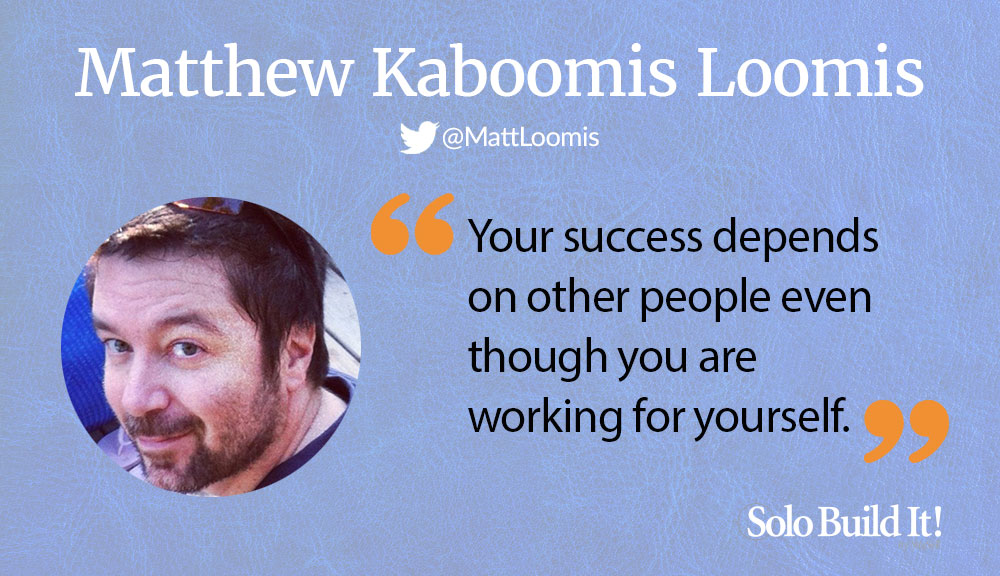
Matthew Kaboomis Loomis
Online Entrepreneur and Copywriter at www.buildyourownblog.net
I will start with the most important one of the three:
- Develop online relationships.
Just because there’s a “solo” in solopreneur doesn’t mean you should attempt to succeed all on your own without reaching out to anybody. Your success depends on other people even though you are working for yourself. Read all you can on topics like “influencer marketing,” “networking” and “relationship-building.”
- Accountability.
The second most important practice: Find someone who will hold you accountable and encourage (stretch) you to grow beyond your comfort zone.
This can be a business partner, mentor, or friend who will tell you the truth, not just what you want to hear. Even “self-motivated” individuals will benefit from accountability.
- Measure.
The third most important practice for solopreneurs, in my opinion, is to review your progress on a regular basis. Set goals, make lists, journal, map out things, and take time each day to review what you’re about to do (morning) and then review how things went (evening). What you’re doing is looking for opportunities for more efficiency and better organization.
Matthew Kaboomis Loomis is the Owner of Build Ur Own Blog and KaboomisCopy. Web entrepreneur with writing skilz.

Evan Carmichael
Entrepreneur at www.evancarmichael.com
- Follow your passion.
It’s the most clichéd but also the most accurate advice. The people at the top of their game in every field love what they do. They love the process of doing the work, not just the results of the work. If you don’t love the process, you’ll quit when it gets too hard. Stop wasting time chasing opportunities. Do the thing that makes you come alive.
- Model success.
You don’t need to have all the answers yourself. Someone has already figured out the problem you’re facing. Find the people who have done it, look at how they did it, and apply it to your business. Stop wasting time.
- Find your One Word.
Understand what the single most important core value is to you and build your business around it. The Why of your business is more important than the What or the How.
Evan Carmichael is a believer in entrepreneurs. His book is One Word.

Aleksander Saiyan
Director of Operations at www.torontodancesalsa.ca
- Be vulnerable in front of your audience.
People trust others who are open and wear their heart on their sleeves. Some of my best work that had an impact on my followers or customers has been when I spoke or presented with passion. You have to tap into your vulnerable side and connect with your convictions as much as your fears so you’re not just talking at people.
- Follow your One Word.
To build a multi-million-dollar business, have an impact on the world and the people around you, you need to know what you stand for. Whether it’s a product or service, it needs to stand for something more than just the front facing thing you are trying to make profit in. My own one word is Belong. I think the world will be a better place if more people felt that. Knowing my one word, I build my business around it, with every student who walks in, every person who follows me on Snapchat or other social media. At our school, it’s Family. Every person who walks in is coming for more than just dancing lessons. They are coming to feel more confident, turn off the outside word, get over death in the family, body image concerns, and many other reasons. Be aware of your One Word and then practice it daily.
- Have a regular schedule.
You need to have consistency and organization in your life and set up winning habits. I think that being any type of entrepreneur is one of the hardest endeavours you can pursue. Either you have a full-time/part-time job and you’re pursuing your business on the side, or you are going all-in on your new business. A lot can come at you, so having a regular work schedule and creating deadlines for yourself can motivate you. It will be a grind, you will doubt yourself, motivation won’t always be there. With no boss above you, you have to drive yourself to success.
Aleksander Saiyan is an avid competitor in both Salsa and Bachata. He brings his passion for teaching and his love of dance to every class he teaches.
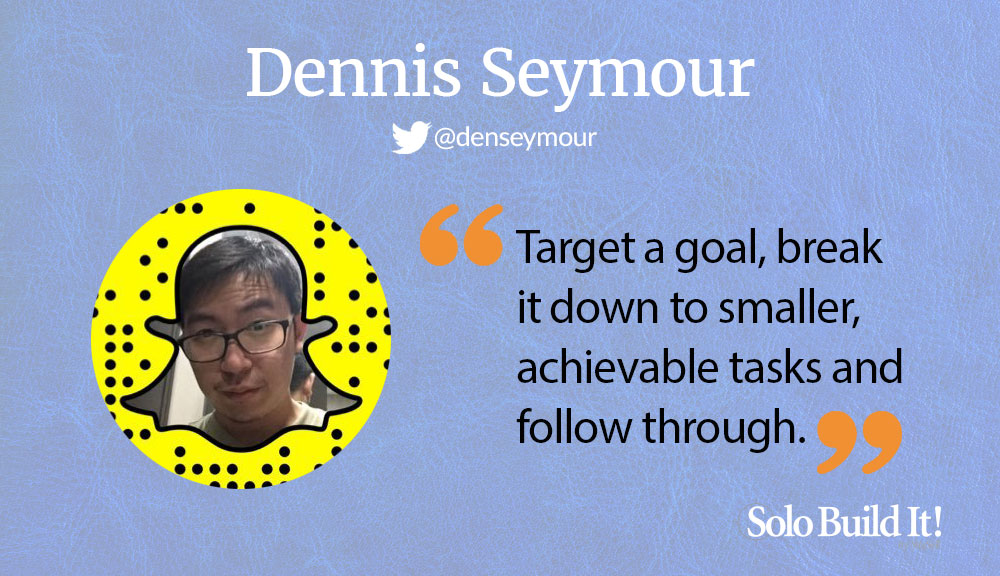
Dennis Seymour
Founder at www.denseymour.com
- Learn to commit.
A lot of solopreneurs will jump from one thing to another. Target a goal, break it down to smaller, achievable tasks, and follow through.
- Put in the work.
One thing that I hear a lot is how hard people say they work. When you break down the day and what they’ve achieved, there’s really not much. Practically the same productivity with 9-5’ers. Track your day and understand how you work. That’s the only way to show that you really are working towards your goal.
- Continue learning.
Much like in life, being an entrepreneur, you should never stop learning. Allot time for books and self-development. You’ll better yourself every single day.
Dennis Seymour is a Full Stack SEO and Digital Marketer.
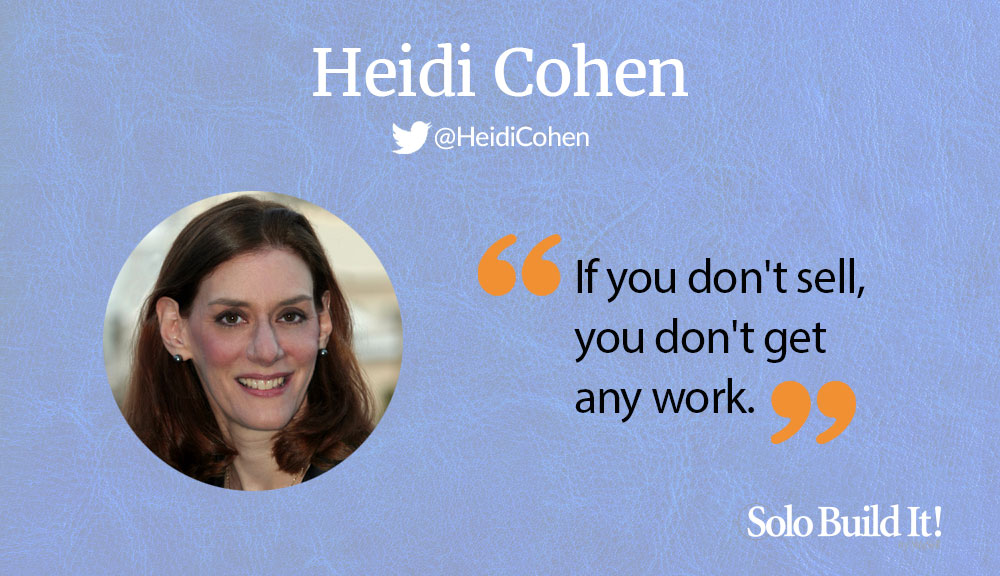
Heidi Cohen
Chief Content Officer at www.ActionableMarketingGuide.com
- Understand why you want to be a solopreneur and how this fits into the life you want to create for yourself.
Consider the other elements of your life beyond your “work.” “I need a job” or “I want to make a lot of money” aren’t the right answers.
- Answer “What skills do I have that I can sell?” and “What sets me apart from other people with these skills?”
While you’re going through this process, ask yourself how you feel about selling, since a solopreneur is the jack of all trades. Most people don’t like or want to sell. If you don’t sell, you don’t get any work.
- Figure out your ongoing expenses.
This may require help from your accountant, but you need to know how much money you need every month. You can’t live on your credit cards — that’s a recipe for disaster. Then determine how you’ll get money coming in while you’re building your business. This includes getting a side job at Starbucks or Trader Joe’s.
Heidi Cohen is an Actionable Marketer, speaker, professor and journalist who shares practical advice on social media, content marketing, small business and life.
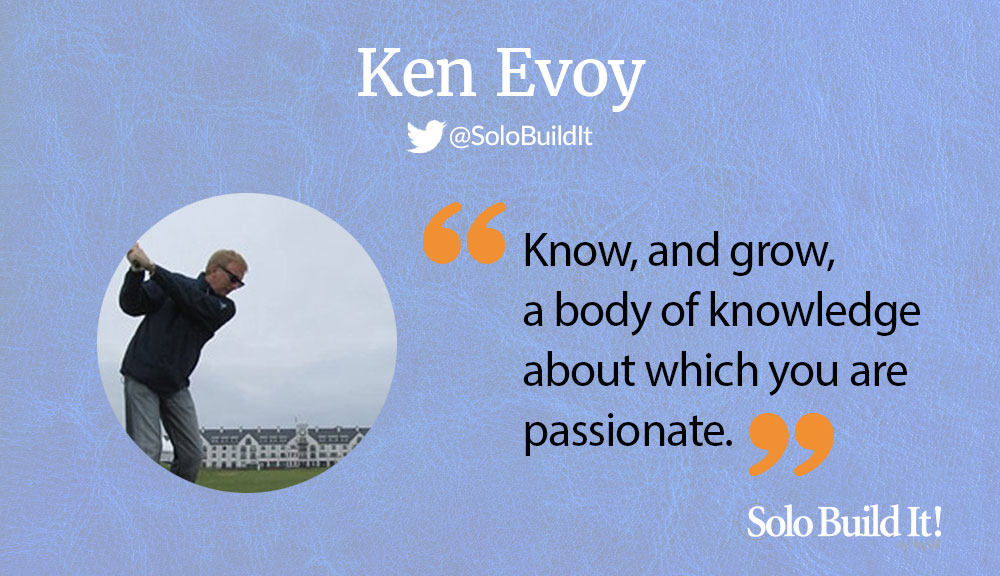
Ken Evoy
Founder and CEO at www.sitesell.com
“The Big 3” vs “The Core 10”
What must the solo entrepreneur (“solopreneur”) do well in order to succeed online? What are the 3 most important best practices?
As founder of SiteSell Inc., and on behalf of everyone here at SiteSell, thank you to almost 100 of the finest minds in our world of solopreneurism.
 Thank you for taking the time to contribute your carefully considered replies to the question that every solopreneur asks. Outstanding advice! 💯
Thank you for taking the time to contribute your carefully considered replies to the question that every solopreneur asks. Outstanding advice! 💯
You have built a must-read success framework for solopreneurs — invaluable in content, inspirational in spirit. Mike Allton, our CMO, has mined the “wisdom of crowds” phenomenon to bubble the most important concepts to the top. To the reader 👉 start there.
The entire mini-book length document is well worth the read. It’s not often that you get the opportunity to pick the minds of such a varied group of experts in the fields related to online business-building.
Thank you, again, to all. And thanks very much to Mike for pulling this all together so masterfully.
Now to my own reply. It’s the most challenging question that a solopreneur could ask. I started by laying out a “Core 10 Best Practices” for the online solopreneur…
- Research your niche and plan your content, site and monetization.
- Understand your target market (have a crystal-clear visitor thumbnail/persona)
- Determine your site’s “Personality” and what your “Brand of One” will be.
- Pick a tight, brandable .com domain name, one for which social usernames are available.
- Create STANDOUT content (site and social) that overdelivers.
- Develop a site and social presence with “Personality.”
- Know the 80-20 of analyzing site, social and monetization metrics.
- Network to “reachable” influencers.
- Implement higher-paying monetization models that solve a “pain” or overdeliver a “gain” for your niche thumbnail.
- Build equity, not just income.
These are the 10 best, based upon our experience at Solo Build It!. There are so many possible ways to look at best practices, though.
I can’t wait to see what bubbles to the top from near-100 supremely talented individuals with such a wide range of skills. And, perhaps just as valuable, you’ll probably pick up some great new concepts from those with “ideas less travelled.”
Most of the items above will be listed by others.
 Creating “STANDOUT content” will likely be one of the most frequently recognized (I’ve not seen the tabulation as of this writing).
Creating “STANDOUT content” will likely be one of the most frequently recognized (I’ve not seen the tabulation as of this writing).
While you have to do many other things right both before and “after” creating content, content that stands out is the engine.
So what the heck could I add? The following is all based on 20 years of enabling solopreneurs to succeed, over 15 of which have been garnered from our flagship product, Solo Build It! (“SBI!”)…
A bigger-picture view of “best practices”
The term “best practice” means…
“a method or technique that has been generally accepted as superior to alternatives because it produces superior results”
– Wikipedia
OK, that’s fine — but at what level do we want to apply that definition?
A “best practice” can be as narrow as the optimal process for using hashtags at Instagram or (re)capturing “404 links.” Or it can be broader, such as the 10 that I listed above for solopreneurs who want to build an online business from scratch (from SBI!’s Action Guide).
Or we could go really broad and less directly action-oriented…
Over the past 2 decades, 3 fundamental best practices stand out. They are critical among solopreneurs who have a sincere desire to grow an honest-to-goodness “business“…
 And by that, I don’t mean those who just want to “make money online.” Nor do I refer to those who hop from one sure thing to the latest hot trend.
And by that, I don’t mean those who just want to “make money online.” Nor do I refer to those who hop from one sure thing to the latest hot trend.
We’re talking “real” business.
Building an online business is just as difficult as building an offline one. The good news is that it requires much less financial capital. That lower risk accounts for the temptation to rush to “make money online” opportunities.
Lower risk enables the goals of starting an online business to be more flexible. They can vary from that of a stay-at-home spouse who wants to build a college fund, to the millennial who wants the freedom to travel while working, to the more “seasoned” person who wants to quit the day job, safe in the knowledge that income is more than replaced.
Lower risk, though, does not mean it takes less time and work. The following 3 best practices apply to those who “get” this commonly missed fact. They also understand that “make money” understates the dedication required. No matter how convincing “Get Rich Quick” copywriting is, it’s never “different-this-time.”
To some degree, these best practices stretch the meaning of “practice” in that some arrive with these as well-developed skills. Some come by them more naturally, but all can be developed and mastered.
Over the past 15 years of Solo Build It!, we’ve witnessed the ability to grow these into finely honed practices. All other business-building practices flow from them. If you master these 3, you not only improve the execution of all business practices, the ultimate odds of success soar. 🚀
To assess your own current chance of success, measure yourself against each of these with brutal self-honesty. If you find a weakness, improve it.
Everyone arrives with some combination of “The Big 3.” Regardless of how you start, work them until they are as natural as breathing…
- Know, and grow, a body of knowledge about which you are passionate.
Start with a niche that you know and love, likely something that you do (or have experienced) in your life.
 Albert Einstein once said…
Albert Einstein once said…
The only source of knowledge is experience.
He didn’t have the Internet back then!
We prefer to think of knowledge this way…
Everyone knows <em>something about something</em>. No one knows <em>everything about anything.</em>Click To TweetWhat’s your “something about something?” What’s your niche?
It may have been something you did years ago and abandoned due to lack of time. Or it may be something that you do out of necessity now. An SBI! client once complained in our forums that she knew “nothing about nothing”…
After all, she had been virtually housebound for almost a decade, taking care of two elderly parents. It was pointed out to her that she had knowledge that would be valuable to a generation with parents who needed support.
Now that is a lightbulb-moment flash of inspiration! 💡 ⚡️
She may not have known everything there was to know about adult diapers, but she had certainly found a brand that worked well for her parents. She had learned much through experience — the rest can be supplemented by online research.
No one becomes an expert purely through experience, contrary to Einstein’s sentiment earlier. You may have learned much about your hobby of propagating rare orchids or about Python by programming apps for a dotcom business.
Now, grow it though research. Network with questions on boards / forums / Facebook groups. Share some of your own knowledge there, too.
OK, you have your “something.” Realize that you don’t know everything about it.
So… do you have the driving passion to use the Internet to grow your knowledge by absorbing the experience of others? To become an expert in your niche?
Is it a passion that will drive you through the inevitable dips before your business shows sustained and growing success? Will you wake up excited about it?
So many business-building best practices flow from “passionate knowledge”…
- Share what you know by over-delivering, original — not derivative — high-value content. It’s a joy, not a task.
 Build a strong social media presence with your target market, and network to influencers. Nothing develops recognition in a niche like the voice of someone who truly knows and loves it. Think of it as the “real deal seal” of approval.
Build a strong social media presence with your target market, and network to influencers. Nothing develops recognition in a niche like the voice of someone who truly knows and loves it. Think of it as the “real deal seal” of approval.- Grow search traffic — targeted audience appreciation sends hundreds of off-site signals to Google, improving search results and driving high volumes of targeted visitors.
In short, start with an experience-based niche about which you are passionate. Grow it with online research…
- Use search engines to supplement whatever you don’t know.
- Ask questions at niche-related forums, groups, boards, social media.
A significant and growing expertise about a niche that you love is a strong head start. Too many people search out niches with obvious monetary potential (e.g., high Google CPC), figuring they can learn it. It’s a difficult approach…
Without a base of “been there, done that” knowledge and the passion to become the best, the road to success becomes too steep for most people.
So… how do you feel about your niche?
- Develop the right attitude — positive, adaptable, likeable.
We all love people who make us feel good, folks with a smile who radiate a certain positive vibe.
Your very own attitude impacts you, too. For example…
 When times are tough, anyone can get down. What happens next defines you.
When times are tough, anyone can get down. What happens next defines you.
Do you have a sense that you can turn it around? Do you roll up your sleeves, or do you feel sorry for yourself? In short…
Do you have a “pre-winner’s” attitude?
If not, it can be developed (if you have the humility to recognize the deficit). I’m not saying that it’s easy, though…
This is a harder skill to master. Life’s prior experiences make many people cynical, pessimistic, resigned, and even melancholy. But think about this…
A new business is a fresh start. No one starts that with a resigned sense of failure, as if a defeat is pre-ordained. You start with some expectation of success, right?
Let’s build upon that!
Your startup expectations must be realistic, naturally — not magical. “Pre-winners” put in the upfront work to evaluate their odds…
They set goals that are attainable, given their time availability. They avoid sure fails. They would rather backtrack and reassess than insist upon starting a concept that does not prove up during initial research about the niche, the competition, how it can make money (and how much), and so forth.
They not only have a plan that assesses and prepares for success, they adapt to difficulty. First, though, they expect it…
No plan survives contact with the real world.
Better plans last longer, but the unforeseen will happen. So assess yourself now…
- Every business starts slowly. How will you respond when you have little to show after weeks of hard work? Months?
 Every business suffers setbacks, such as a 10% drop in traffic from Google, or several social posts in a row with poor engagement. What will you do?
Every business suffers setbacks, such as a 10% drop in traffic from Google, or several social posts in a row with poor engagement. What will you do?- What if you have solid traffic but no one buys your service or product?
Even those with the “winningest” attitude can suffer — that’s only human. Then they get to work. They don’t work harder, expecting that doing more of the same thing will deliver different results (a popular definition of “insanity”).
They figure out the “why.” There is always a reason…
Then they adapt.
A pre-winning attitude is, as mentioned, infectious. Negative people complain, are snippy, have excuses, find themselves in flames, etc. That’s hard enough on them. Now consider the impact on others…
 They become a drain in our lives — we avoid them. They attract negative vibes, worsening matters with criticism.
They become a drain in our lives — we avoid them. They attract negative vibes, worsening matters with criticism.
As a result, they become more depressed or angry. Easy as that, you can be turning the wheel in the wrong direction.
Your attitude naturally comes through in all that you do online. It’s there between the lines of your site’s content. It emerges in your social media, in forums.
Ultimately, it injects itself into your all-important “Brand of One.” Your target audience responds to it accordingly, ultimately impacting search, social and sales.
Attitude, in short, is a self-fulfilling prophecy. Those who naturally tend to be positive need no further advice — know it and grow it. Positive results feed that attitude in a wonderful upward cycle.
What about those who have stumbled in the past? How do they avoid turning negative after the hopeful start? How do they avoid repeating past patterns? Let’s look to two geniuses in their fields…
Weakness of attitude becomes weakness of character.Albert Einstein
You don’t build a business — you build people — and then people build your business.Zig Ziglar
Apply this to the solopreneur. A weak attitude ultimately reflects itself in the character (what we call “Personality”) of your business. Both Einstein and Ziglar suggest that attitude can be changed. Ziglar’s quote needs a small tune-up for solopreneurs…
You don’t build a business — you build yourself – and then you build your business.
More from Einstein…
We but rarely reflect how relatively small, as compared with the powerful influence of tradition, is the influence of our conscious thought upon our conduct and convictions.
You can change your tradition of poor attitude. First, though, you must recognize the problem. If you have yet to succeed online, consider this seriously.
Start the process by being aware of a potential attitude problem that has created a pattern to your life. Here’s how to do that…
 Review this possibility with a close friend. Do your own bluntly honest self-appraisal (no “yeah but’s”). Then ask that friend to appraise you.
Review this possibility with a close friend. Do your own bluntly honest self-appraisal (no “yeah but’s”). Then ask that friend to appraise you.
This will help you fully appreciate exactly how much you may be your own worst enemy. It’s the first step to modifying past experiences.
I can’t overemphasize the importance of this. If you don’t recognize your current attitude, you can’t change it.
It’s a competitive world. Building a “can do” attitude fixes problems — fretting won’t get it done! Positive actions improve your mood further, resulting in a site Personality that resonates with your thumbnail, between the lines.
So… can you change how you react? Can you control how you communicate even on down days?
The answer to that is yes. You can. When you do…
- you’ll feel better
- your target market will, too
- you’ll fix instead of fret
You’ll turn the positive feedback wheel ever faster in the right direction!
The question, really, isn’t “can you”…
It’s “will you?”
Many, sadly, can’t see how self-defeating they are.
Here’s hoping you either have “it,” or you are prepared to work to improve it. If you’re not sure and if you can’t self-identify, involve a friend you trust. Combine your conscious and the “remoteness” of the Internet to create the Personality your business needs.
- Persevere
I can’t say it any better than Calvin Coolidge, so I won’t…
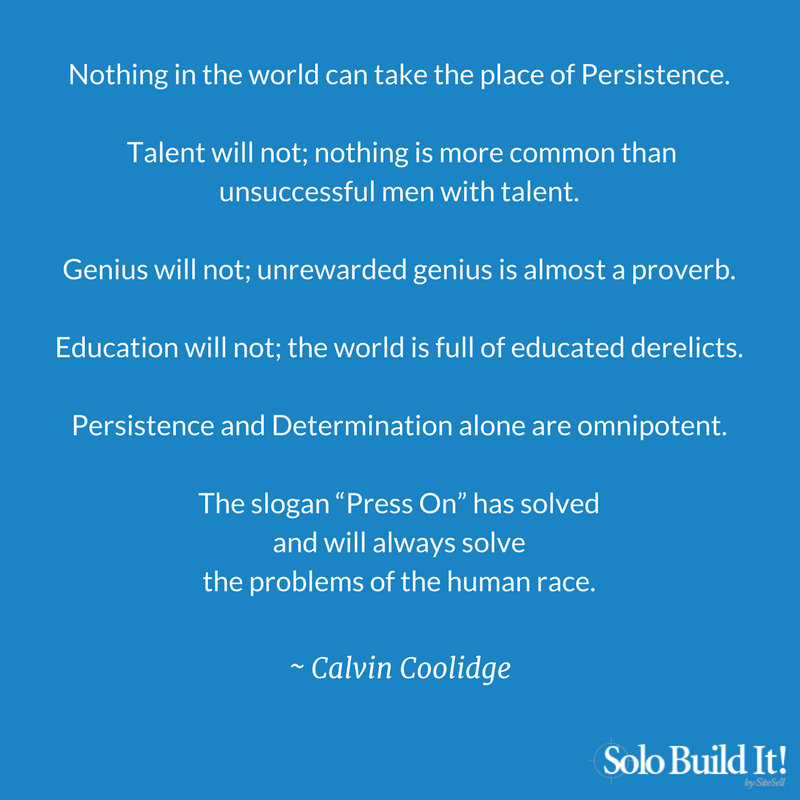
Earlier, we alluded to that popular definition of “insanity” (doing the same thing over and over and expecting different results). Let’s combine that with a quote from the E=mc2 genius…
You never fail until you stop trying.Albert Einstein
Let’s combine those two thoughts…
You never fail until you stop trying something different.
Even then, there is a time to recognize reality and call it quits. There is a time to tally up the lessons learned and try again.
Yes, try again — perseverance applies at the highest level. After all, your goals have not disappeared. Why abandon your desire to attain them?
Live and learn. Learn to live.
Few entrepreneurs succeed on their first try, even their second. Why should solopreneurs expect a different fate? Learn and then try again, differently.
The problem with “calling it quits,” though, is that most solopreneurs do it way too soon.
Much like attitude, persistence is more than a trait. It’s a skill that can be acquired and developed. The key is motivation. And the trick to that is easy…
If you’re in business to “make money,” you are in trouble. Money is just a way to measure how close you are towards goals that matter.
What if those goals don’t matter to most? They don’t have to. They must only matter to you.
 You want to buy an $8,000 Chanel purse?
You want to buy an $8,000 Chanel purse?
I won’t pretend to understand … 😉
But if it motivates the heck out of you, it’s a super goal!
- Want to create and fund the kids’ college fund? 🎓
- Save up for vacations? ✈
- Retire on your own terms, without sacrificing your current standard of living? 🏌
I get all those, but what do you care about what I or anyone else thinks? Does it move you into determined action?
What about the ultimate goal, freedom? Do you burn to be free, to dump the boss and finally be in charge of yourself, beholden to no one?
It’s a wonderful, idealistic goal for all the obvious reasons. But it’s also a “bad” goal because it’s so abstract. Make it real.
What is freedom to you? Visualize it.
 It may mean working from home, young family always nearby, and able to take a seaside break whenever you like.
It may mean working from home, young family always nearby, and able to take a seaside break whenever you like.
That’s a big upgrade from office work mixed in with business travel!
Crystallize your vision. Never lose it.
That “photo in your mind” (hey, make it into a screensaver!) is a more powerful motivator than dollars in a bank account.
“Make money” is merely the vehicle.
Try this experiment if you doubt me…
 Which photo motivates you more, a big, fat bank account?
Which photo motivates you more, a big, fat bank account?
Or is it the photo just above, which visualizes what that bank account might mean to you?
“Money is just a way of keeping score.”
No, that wasn’t Einstein…
But it’s just as genius.
 Money lacks the emotional connection that keeps the wick of motivation burning bright.
Money lacks the emotional connection that keeps the wick of motivation burning bright.
It’s motivation that fires the perseverance that lies behind every success.
Wrapping Up
Let’s acronym our 3 high-level best practices….
- Brain — it’s loaded with knowledge and passion about a niche
- Attitude — positive, attractive, adaptable
- Motivation — driven to success.
BAM! 💥
You can get it and grow it.
Sure, some solopreneurs start with a huge knowledge base about a particular topic.
Yes, others seem to be born with a more positive outlook on life.
And we all know people who are naturally self-driven.
Lucky genes? Were they exposed to the right environment?
There is an element of that. But to a large extent, much of it is learned. And once learned, it starts a positive feedback loop that feeds upon itself.
You may feel disadvantaged if you’re not starting out at the top of their games. But these “mystically advantaged” merely have a head start on you.
So how do you “get BAM”?
There is a meeting point, common ground, between “The Big 3” of BAM and “The Core 10” best practices. The latter were the 10 more “action-oriented” best practices that I outlined at the start.
Brain
That common point is the B of BAM (“Brain” — your growing niche expertise) and the 5th of the “Core 10″…
Create STANDOUT content (site and social) that over-delivers.
Content drives online business success. Without STANDOUT content, online success is mighty unlikely.
 Content grows traffic and social support. It creates credibility with future customers and influencers. I could go on and on, but let’s summarize…
Content grows traffic and social support. It creates credibility with future customers and influencers. I could go on and on, but let’s summarize…
Content is the engine that drives everything else.
But what’s “the engine of the engine”?
That takes us back to the topic of the B in BAM…
Brain! Everyone knows something about something.
The bottom line of Brain is that you know something about something. I’m sure of it. Find your “something.” It may be hiding in plain sight or buried in decades past. But it is there.
Once found, strive for expertise! Passion will fill in the missing blanks, while also laying the early groundwork for networking.
Your excitement in finding and building an expertise is your springboard to building and growing the rest of BAM…
Attitude?
There may be some who are hopelessly pessimistic, perhaps even nasty. Since you’re here, though, that’s not you.
Whatever your hard self-analysis revealed, you’re here because you are still hopeful. You started your business optimistic. We’ve covered how to maintain and grow that.
The good news is that it’s easier to control and modify your attitude online. In “real-life,” person-to-person, you can slip in front of others. Lose your temper or walk around with a long face on a bad day. You don’t get those words and actions back, though. Some damage is done.
 Online, you get do-overs. The rule is simple…
Online, you get do-overs. The rule is simple…
Never publish something you’ll regret.
Not sure about it?
Don’t publish it.
Your “voice” and online Personality are a critical part of growing a profitable online business. They must be appealing to your target market. Never compromise them.
Musical superstars put on a happy face before a concert regardless of how down they may be feeling. They dig down to find an energy that wasn’t there just minutes before. “The show must go on”…
And so must your Personality. It’s a heck of a lot easier to do it online.
How do you deal with business setbacks?
Know now that they’ll happen. Know, too, that almost none are fatal.
Can you let yourself get down? Sure, it’s normal. But then visualize your goals and get back up. Find and fix the problem. You may need that good friend at times…
Ask a close friend to help manage behavioral patterns that have pulled you down in the past. If you resolve to manage your attitude, if you keep a bright vision of what success means to you, you can grow.
This is self-improvement stripped down to its bare bones…
Motivation
Some folks are “driven.” If that’s never been you, you’re not likely to start now — not on your own. Many need a kickstart…
Brain: Finding a niche that excites you serves admirably.
Attitude: Working on this pushes you further.
One final best practice remains…
Building a business is not just another hot “make-money-of-the-month” scheme. Hundreds of thousands of wannabe solopreneurs hop from one to another. The disappointment of one is quickly replaced by the false hope of the next.
 When you commit to building a real business, though, you commit to being “the tortoise,” not “the hare.”
When you commit to building a real business, though, you commit to being “the tortoise,” not “the hare.”
No more hopping from scheme to scheme. 🐇
You know that there will be ups and downs. Truly understanding that also helps keep your attitude in check, positively seeking solutions.
Stick with it and figure it out. Tortoise it!
Ultimately, while the B and the A help you push further while fulfilling their specific roles, it’s Motivation that helps you over the goal line.
What’s going to drive you to review a new web page “just one last time” to give it a final polish? What eliminates “good enough” from your vocabulary?
What drives you to work harder than you’ve ever thought possible for you?
And most importantly, beyond the drive to excel, what gives you the willpower to plough through problems?
Self-driven folks hardly need a goal. The rest of us benefit from the great push of a goal that is well visualized in a way that connects emotionally, profoundly.
Only you can define it and visualize it. It needs to excite you — and only you! If you tend to forget this higher mission that lies behind your business, keep it in front of you (as a screen-saver!).
 For example, this photo reminds an SBIer with a website about Anguilla (Anguilla-Beaches.com) to keep providing tourists with the best information possible. Enabling them is what enables her to reach her goal.
For example, this photo reminds an SBIer with a website about Anguilla (Anguilla-Beaches.com) to keep providing tourists with the best information possible. Enabling them is what enables her to reach her goal.
Her goal? To be free.
As I said earlier, “freedom” is a beautiful idea, but sharpen it.
To her, “freedom” means “surf where I want, when I want.”
She’ll reset “internal goals” for her business, too, of course, such as…
- Overdeliver STANDOUT content to 3,000 visitors per day.
- Grow Instagram fans to 10,000 with 10% engagement.
- Reach $12,000 per month net after-tax income.
Getting there is easier set than met. Twitter may suddenly chop distribution (reducing impressions). A sponsor may drop out. The zika virus may reduce visitor numbers.
No plan goes smoothly. It’s raw perseverance that keeps her going, keeps her solving problems in the rough patches when so many give up, usually too soon. And it will keep you going as well.
So what’s the best practice for the solopreneur to master? What increases your likelihood and level of success?
BAM !💥
Get it.
Master It.
Win.
Ken Evoy is the Founder, CEO, and Chairman of the Board of SiteSell Inc. He is the creator of Solo Build It!, SiteSell’s comprehensive Web business-building system and solopreneur incubator. Ken is also a successful inventor, author, and emergency physician. He feels strongly that solo entrepreneurs can be empowered by leveraging their income-building potential online.

Mike Allton
Content Marketing Practitioner at www.thesocialmediahat.com
The devil is in the details, so they say, and that’s undoubtedly true when it comes to the success or failure of a business. Particularly that of a solopreneur.
Long established businesses that have vibrant cash flows can more easily weather the ebb and flow of normal business fluctuations. But smaller businesses will find those times to be more of a struggle (or boon).
Take for instance the story of two people driving down the highway. One, a successful businesswoman who is the Chief Finance Officer for a high-tech firm, and the other, a man working two part-time jobs to try to keep up with his bills.
Ahead of the drivers, a dump truck’s gate breaks and drops debris all over the highway, causing both drivers to slam on their brakes. As their cars drive over the debris, they both suffer flat tires.
Of the two drivers, who do you think will find it easier to pay for the repair?
While one might think the lesson here is to be wildly successful at business, that’s actually not the case. Instead, my point is that any solopreneur can be as successful and prepared as he or she needs to be with proper planning.
Either driver could have saved up and set aside $1000 in a bank account just for such an emergency. Then, instead of worrying about what might happen if they have a minor accident, they could focus their time and energy on things that really matter.
Similarly, solopreneurs must take the time to understand and leverage their strengths, and invest in their business accordingly.
These are the three areas on which you need to focus:
- Time.
Time is inarguably your greatest resource. Optimize it and use it to your fullest advantage.
That could include:
- Eliminating time-suck activities that do nothing to further your business goals.
- Outsourcing or delegating repetitive or administrative tasks.
- Automating marketing tasks like email campaigns or social media activity.
- Assets.
After your time, your greatest resource is the assets that you build up for your business.
- Customers
- Cash flow
- Email subscribers
- Content
Generally, your time will be best spent working to improve, enhance and increase those assets.
- Friends.
Where we would be without friends, right? But while having personal relationships that enrich our lives and provide entertainment is important, that’s not what I’m referring to.
Instead, I’m talking about professional friendships. In other words, networking. But more than networking. Networking implies business relationships with peers and colleagues, along with vendors, etc. Friendship, on the other hand, means that there’s a real relationship that has been formed.
Those are the kinds of relationships that Jeff Sieh refers to when he talks of mastermind groups, and that Mia Voss says is your “A-Team.” (A concept we refer to as your “Personal Network” in the Solo Build It! Action Guide.)
Having great friendships with professionals in your space will provide you with opportunities like partnerships, collaboration, peer-review and mentoring. And while you cannot force such relationships to happen, what you can do is be open to them and nurture them when you are so blessed.
When you focus on and make improvements to these areas, you’ll strengthen your business and put yourself in a position to succeed, regardless of what gets dropped in front of you.
Mike Allton is a Content Marketing Practitioner, award-winning Blogger and Author in St. Louis, and the Chief Marketing Officer at SiteSell. Mike teaches a holistic approach to content marketing that leverages blog content, social media and SEO to drive traffic, generate leads, and convert those leads into sales.
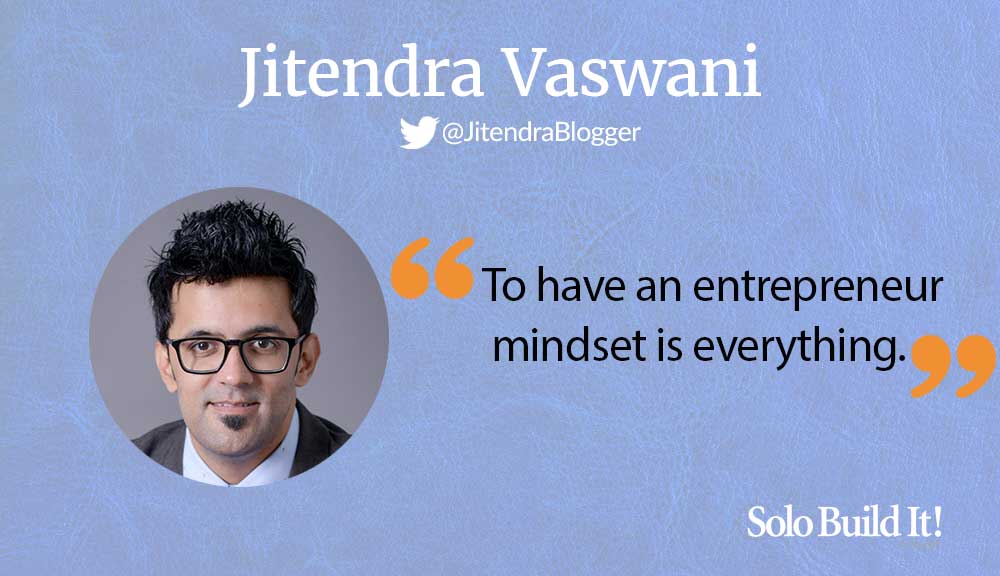
Jitendra Vaswani
Digital Marketing Practitioner at BloggersIdeas.com
These are the best online business success secrets I am following from 6 years of running a digital marketing agency.
- Never take advice from someone who never did anything
- Don’t listen to your family, friends and society; these are major roadblocks for your success.
- Audit yourself occasionally and see what is working best for your business. Analyze the social channels and scale that to max. Don’t focus on too many things, because multitasking is a myth.
Through my first book “Inside A Hustler’s Brain: In Pursuit of Financial Freedom” I am helping people take action in their life and bring change in people’s mindset. To have an entrepreneur mindset is everything.
Jitendra Vaswani is a Digital Marketing Practitioner & international keynote speaker currently living digital nomad lifestyle. He is the founder of kickass Internet Marketing blog BloggersIdeas.com where he interviewed marketing legends like Neil Patel, Grant Cardone & Rand Fishkin.
Conclusions
First of all, if you’ve made it this far, congratulations! You’ve just consumed an entire semester’s worth of graduate-level advice and lessons. 🙂
Each and every one of these experts offers excellent advice that runs the gamut from Authenticity to Zappos (and lifetime value). Almost 100 best-practice recommendations reveal where solopreneurs should focus their time and energy to achieve a successful online business. One little problem, though…
With so many recommendations, where do you start? As discussed at the beginning (remember way back then?), the “Wisdom of Crowds” has indeed bubbled the 3 most important must-do-well actions to succeed online.
We added supporting information to summarize what the experts said about each. And, faced with an abundance of high-value responses, we added a free bonus. You get the next 7 most-mentioned, rounding it out to the Top 10!
Make these your business-building priorities. Heck, tattoo the following “Big 3” onto your forehead as an auto-reminder each morning…
#1 Network, Network, Network
Networking and building relationships was the overwhelming favorite among these online entrepreneurs and marketers as the best use of your time. Nearly a third of the experts said this should be a priority!
Kim Garst said, “The old saying that you are who you hang out with is so incredibly true as an entrepreneur.”
And Ian Anderson Grey suggests, “Aim to add value to people’s lives as much as you can. Go to industry conferences and meet people in real life. That’s often where the magic happens.”
Start by reaching out to influencers in your niche. If you want to build a business based on your expertise in raising exotic tortoise species, that is where you network. Social media, Facebook groups, forums, etc. — build friends and reach out (slowly) to influencers wherever they tend to be.
Similarly, if you have an interest in the area of Internet marketing/building online businesses, frequent the spots where those folks hang out. Start by following all of these experts on Twitter. We’ve made it easy for you — subscribe to our list of solopreneur experts.
Networking is a learned skill. Avoid the “bull in a china shop” syndrome — start “slow and low”…
- Slow — don’t try to force anything. Follow for a while to understand those whom you want to reach. Get noticed gradually (e.g., like, share and retweet the posts that resonate).
- Low — if you’re just getting started, focus on making “friends” at your own, or slightly higher, level of engagement. Reach out to influencers who have moderately higher levels. You won’t get onto the radar of someone with 100,000 followers and a high engagement rate until you yourself have grown. Bottom line: Reach for a level that you can actually reach.
#2 Create Content
Not surprisingly, many experts brought up the need for solopreneurs to focus on creating excellent content. Content creation is critical to your success through…
-
Search — Content (text, imagery, video) that OVERdelivers high value on search intent throws off tons of “off-site signals” that Google and the other engines track. Over time, these signals accumulate to drive increasingly better search results.
Note: We expect Google’s “RankBrain” (the Artificial Intelligence component of its algorithm) to reward the best content more quickly and with greater accuracy.
-
Social — It simple. Content that engages is content that wins. Blend in some simple strategies such as optimal hashtag use and tagging of the right accounts. You’ll soon have a strong social presence that reinforces the solopreneur’s “Brand of One.”
Note: We expect strong solopreneur social media marketers to have an edge over their larger competitors. Great social media is clever, inspired, loaded with personality. It comes from the passion in your gut, not an employee paycheck.
-
Networking — When your content stands head-and-shoulders above the competition’s, “networking-up” to influencers becomes a whole lot easier. Nothing impresses like the voice of someone who really knows his/her subject matter. Sharp content with an original personality wins!
Tip: How do influencers decide to establish organic (i.e., non-paid) relationships with you? Here’s a quick-and-dirty protocol that they use:
- Read a few samples of site and social content. Proceed to the next step if it’s worthy.
- Check SEMrush.com (quick metric for search traffic). If they’re high enough to interest that influencer and/or if they’re increasing (shows promise), proceed to the next step.
- Check social networks. How many followers do you have and what percent engage? There is a mistaken emphasis on follower count. Who cares if you have 100,000 followers if no one engages? Focus on total engagement numbers, with “viral” engagement (e.g., shares, RTs) worth more than mere ❤s.
Remember what Andy Crestodina said…
“Your writing drives durable benefits. It’s there when you’re not.”
Well said! Your content is a bit like leaving calling cards scattered around the Web. It speaks far more powerfully than any card, however. The folks whom you most want to reach, influencers, know how to evaluate your content, and the reaction to it, to decide if they want to develop a relationship with you.
Content, truly valuable material that OVERdelivers on a website or blog, that sparks in social media, and that validly contributes in a forum is ultimately the foundation of online solopreneur success.
“Networking” was the #1 most frequently mentioned best practice. But it’s your content that builds the credibility that greases the way for successful networking.
Let’s put it less delicately…
If you put little attention into quality content creation, and/or if you don’t know your niche, the negative impact is significant:
- You end up with poor search results.
- No one engages in social media.
- Influencers won’t answer when you call.
On the other hand, standout content with a unique voice that targets a clearly conceived audience opens search, social and networking doors. It’s all about earning R-E-S-P-E-C-T in your niche.
You’ll build a genuine connection with your audience. That establishes:
- authority with search engines
- engagement on social media
- recognition by influencers whom you, yourself, respect.
Traffic grows. Your “Brand of One” builds. It all ultimately translates into successful monetizing opportunities.
We call the process C T P M – more info here.
Have you mapped out your content strategy with careful thought (e.g., realistic niche, best topics to cover, how to structure it all, voice and thumbnail/persona creation, etc.)? Step back and plan how you will “stand out through content”
#3 Focus!
Time is a solopreneur’s greatest asset. That means we can ill afford to be distracted or waste time on activities that don’t have the highest yield for business growth.
Early on, your focus is preparation and planning. That shifts to content-creation and social media. When brand and traffic grow, your focus is increasingly on monetization. You never “finish” any stage, merely shift emphasis to the activities that help you grow a profitable business most, given the stage that you have reached.
Mari Smith reminded us of a Stephen R. Covey quote, “You need to stay committed to ‘keeping the main thing the main thing.’” That’s a bingo, Mari!
At any given moment, know what action would best move your business further ahead. That is what you should be doing. We all know, though…
Easier said than done. We live in a medium that is the ultimate distraction generator in the history of the world.
It’s one thing to say “focus,” quite another to do it. To help you with that, and to remind you of the other two best practices, we offer this reminder aid…

Rounding Out the Top Ten
- Get Help
- Be Original / Authentic
- Identify / Grow Your Audience
- Be Social
- Help Others
- Set Goals
- Get to Know and Nurture Your Audience
Bonus Suggestion
“The business” can easily consume a solopreneur. After all, you’re it. There are always 10 “to-do” items waiting for you. Your niche should be a joy, of course, so at least you’re “working” on a passion…
But hey! You have friends and family — remember? There’s a whole big world out there. Get out and have some fun with those who matter to you most! If you feel guilty of taking some time off, think of it this way…
You’ll come back refreshed and ready to rock your niche!
Wait! Don’t Bounce Yet
We were just kidding about the “reminder tattoo.” But do revisit this article regularly to refresh your memory, or paste the Top 10 into an Evernote or a weekly reminder app. Time has a funny way of smooshing info together into a blur…
These “Top Best Practices,” the “bubbled best from the best,” deserve to stand apart. Reminders keep your “to do” list prioritized until these actions are second nature. Reviewing them can also deliver inspirations to improve yourself and your business in many different ways.
Finally, before you go…
We realize that you jumped down to the bottom to cherry-pick the gold (how’s that for a mixed metaphor!). There’s lots of gold, though, or cherries if you prefer, in each and every expert’s answer.
Any one of them could give you a new idea, alert you to an approach you are not doing, and even challenge you to think through conflicting advice. For example, how do you reconcile these two nuggets, both valid…
“Good enough is good enough — don’t be a perfectionist.”
vs.
“STAND OUT. ‘Good enough’ is a compromise.”
Either of those, alone, could push you too far in the wrong direction. The first tries to conserve your time, while the latter makes the point that it’s “STAND OUT content” that gets noticed (website, blog, Facebook post, Pinterest, or Youtube).
The resolution depends on you, your niche and your audience. You can stand out without being a perfectionist. If perfectionism means perfect proofreading and grammar, not a comma out-of-place, borrow idea #4 of our Top 10:
“Get Help.”
Outsourcing tedious tasks frees you up to create outstanding content that doesn’t have to settle for “good enough.”
Bottom line? Read everyone’s full answers. Doing so:
- deepens your understanding of the Top 10.
- delivers new ideas, techniques, strategies, resources, etc.
- pushes your thinking to new levels by combining concepts, resolving apparent contradictions, etc.
Do you love this collection of advice as much as we do? If so, please share it with your networks.
Latest posts by Mike Allton (see all)
- How to Avoid Failure in an Entrepreneurial Business - September 23, 2019
- How to Use Buffer for Social Media Management: The Solopreneur’s Guide - September 15, 2019
- Wix Review: An In-Depth Comparison of 10,000 Websites - September 1, 2019


